#this feels more like a character analysis than anything else and just me pointing out how differently they act now towards eachother
Note
I think someone already pointed this out but like. Someone made a Nanami analysis and said they were gonna pretend her killing a cat isn’t canon but like. As awful as killing a cat is it’s still important to Nanami’s character and especially with her relationship with Touga. And the logic for how it could be considered “not canon” just felt weird to me
the cat is super important! to nanami's arc and as a thematic parallel to several other characters. it's definitely not something you can just ignore, especially when you're specifically analyzing nanami. i get that animal death is horrible and especially hard when it's a kind someone has had as a pet, but like. i don't feel like it's necessarily more upsetting than many of the other terrible things that happen in the show? and if you're just ignoring anything that makes you uncomfortable there isn't much show left to talk about lol. i said this in a comment too, but it is really important to sometimes be willing to push through your discomfort and get outside your comfort zone when it comes to media. know your limits and don't end up triggering yourself obviously, but if something is bad enough that the only solution is ignoring it... maybe take a step back and talk about something else.
25 notes
·
View notes
Text
firstly I'd like to admit I went into this episode with the wrong impression
I had assumed Beavis would have no idea this random guy wasn't butthead
and therefore his behavior would seem wildly out of line and beavis would take notice and think butthead himself was acting odd
and maybe this would've added to the ending where Beavis finds the real butthead and then promptly gets mistreated by him
I'm also getting the impression this is flipping their usual dynamic around, Beavis finally having to deal with this overly hyper and clingy guy that doesn't shut up and he's wildly uncomfortable with this, visibly so
even when in a place like the guitar shop where Beavis would be having the time of his life with a loud guitar hooked up to an Amp, he simply tries to put it down, and even apologized for setting off the Amp feedback
if this were the older (younger?) Beavis he would've jammed the fuck out on that guitar being as loud as possible and butthead would've egged him on to the point of smashing the guitar on the ground
I've never seen Beavis act so small and anxious in his environment before, he truly has no clue what to do without butthead by his side
I'd also like to add that once again, Beavis is out on his own in the beginning
the set up for this, we have no idea
but with Beavis saying butthead should be at the maxi mart we can assume maybe they were meeting up? or Beavis left the maxi mart and was on his way back?
both of these seem odd
even when the guy almost let's Beavis go on his own, he can't even believe it
sure this might be disbelief after dealing with him dragging him around nonestop and talking his ear off
but I also think it represents beavis's lack of authority over his actions that he's so used to being controlled by butthead
and the thing to set him free from this guy's grip on him, is him standing up for himself and saying enough
and yes his guy misinterpreted it to be about his girlfriend
but it still gave Beavis the results he wanted
I will admit I really like the moment of this guy teaching Beavis how to fist bump
incredibly wholesome thats all I have to say
and beavis coming home and trying to show butthead what he learned only to get punched for what I assume to be no real reason
really shows how butthead is just becoming a bully
he's snarky all the time now and hits Beavis nonstop and ignores all of beavis's attempts to point something logical out (which is out of character for Beavis as well I'll add)
my final note about both of these new episodes-
I feel like they just dislike eachother now
they feel like roommates staying together because the rent is too high to live on their own
these aren't two best friends that grew up together since diapers that say they aren't friends but don't mean it
no, there's malice now
where this came from I'm not exactly sure
like I previously stated maybe butthead is acting out more on Beavis due to his actions in the movie
but I feel like he's pushing it too far even then
there's tension between them that feels like it's never going to be resolved due to the episodic nature of this series
and although that wasn't a problem in the og series, it is now
#this probably seems really sloppy because i was taking notes as i was watching the episodes and then added revisions after#i feel like everything i had to say has been said before so i dont know-#actually feeling sort of pressed towards butthead in this season despite him being my favorite of the two#my post#beavis and butthead#its not a 5 page essay but i figure its worth sharing anyway 🤷♂️#im also referring to keith as 'this random guy' because thats what he feels like#this feels more like a character analysis than anything else and just me pointing out how differently they act now towards eachother
23 notes
·
View notes
Text
An analysis on how Sir Pentious' character design represents his personality and development perfectly (beware of Hazbin Hotel spoilers)
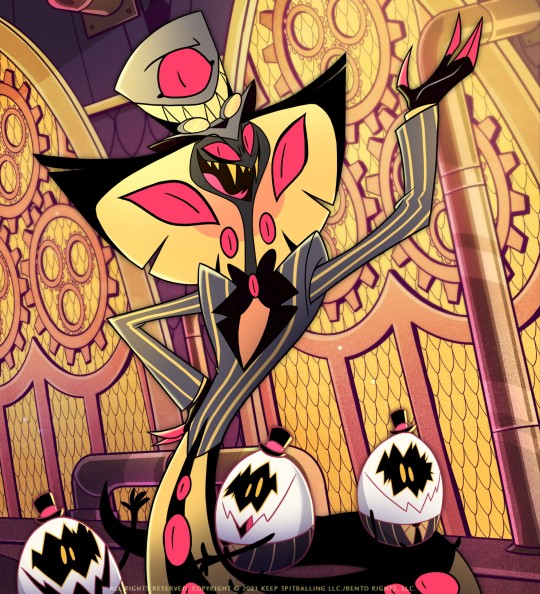
Let's get this out of the way: Sir Pentious is a snake, an animal mostly known for generally believed negative traits such as poison, deceit and betrayal. We don't know WHY he's in Hell, maybe he was a "snake oil salesman" considering he comes from the Victorian times and he's into hyping up what he does, or maybe he was into war. Thing is, he's a Sinner whose design just scream "Evil".
(BTW, a snake could also represent "fertility": looking at you, Egg Boiz!)
He always had eyes all around him not just because of a stylistic choice.
Sir Pentious always felt like he was watched, and had to watch out for any danger.
"Everyone here is too nice: obviously it must be a lie! I can sense they are planning to kill me, but when?! HOW?! I must be PREPARED!"
Sadly, he's been constantly berated by other demons, far more effective in destruction, status, cruelty and charisma. Alastor won't ever bother to remember him, Cherri always ones up him, and the Vs, the ones he admires to most, won't care less about him.
To the point that Vox sent him as a spy without the intention to save him if things were going to fail. Heck, he even openly tells him to die while calling him a failure.
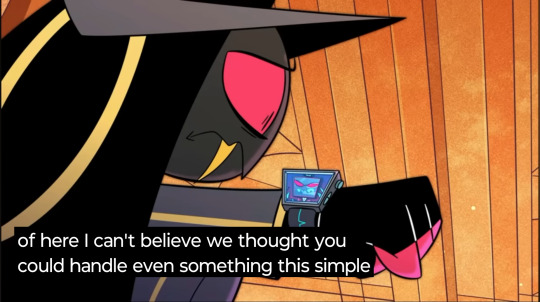
So of course he's got reasons to have trust issues, or taking everything so seriously, being constantly reminded of what he can't accomplish. So he puts an air of grandure that may be very flamboyant, but is VERY frail.
But, if we have to be frank here, his biggest source of insecurities... is himself.
He has eyes on his tail (his softer, more vulnerable side, which is ironically made even MORE lieable to getting hurt because of how sensitive those organs are), and inside his hood, so he could look out better for danger when on alert mode.
Heck, even the mark on his hood kinda resembles one eye.
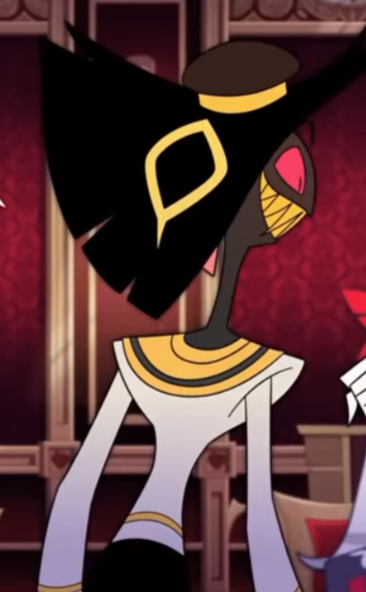
Problem is, when you see his hood folded, when he's at ease, neutral or sad, those are not looking at outside sources.
They're looking at him, at his back. A constant stare that happens everytime he lets his guard down and shows how vulnerable he is. A gaze that can sense all of his weakness, his struggles, his insecurities.
And it's all him.
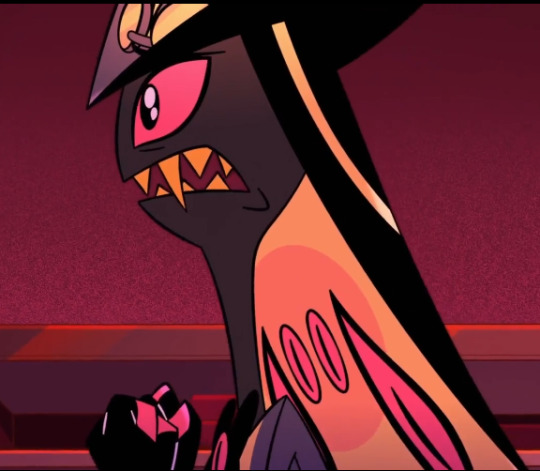
Pentious constantly believes that his inferiority complex will fade away once he'll accomplish something grand that will make others accept him. But he is his biggest critic, his worst enemy: HE is the one who believes he's a failure, that he'll never gain approval from others.
This show takes place in Hell, but this is Sir Pentious' personal Hell: insecurity born out of self hatred. Doomed to feel everyone's gaze upon him, including his own. Believing the danger to his self esteem is from others, when it's really from him.
But then he's accepted at the Hazbin Hotel: Charlie forgives him, he bonds with Angel, Husk and Niffty who don't care a bit about what he's accomplished or not, or what he's done in the past.

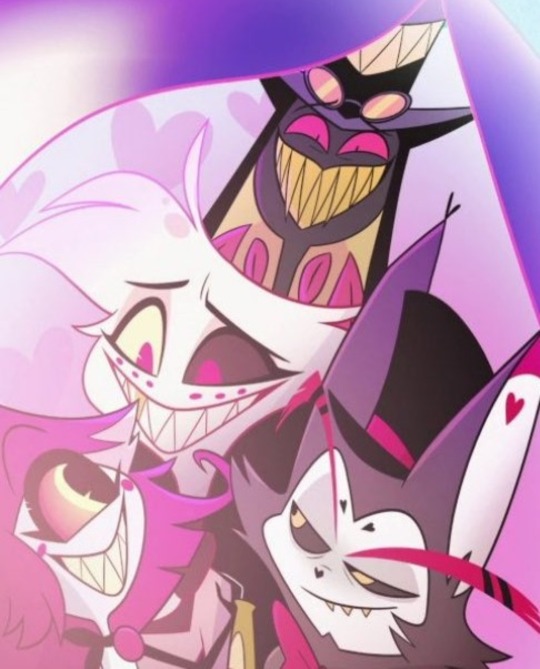
He feels more comfortable in showing his vulnerable side, and no one judges him for how easy it is for him to get emotional.
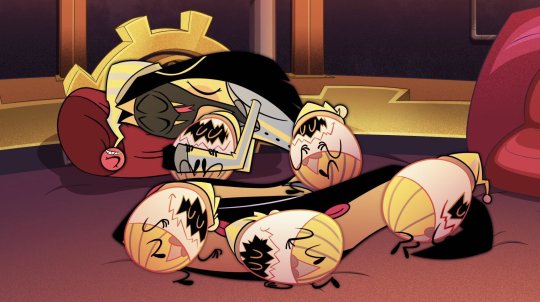

Of course he's still very insecure, considering how he struggles to confess to Cherri, but notice how he stops building machines or planning to attack others as soon as he starts bonding with the others: he doesn't have a reason to destroy or attack, now that he knows he's loved.
And his final design, when he goes to Heaven, shows how much he's changed, yet stayed the same. He may have died a hero, but he's still the same awkward snake we've come to love.
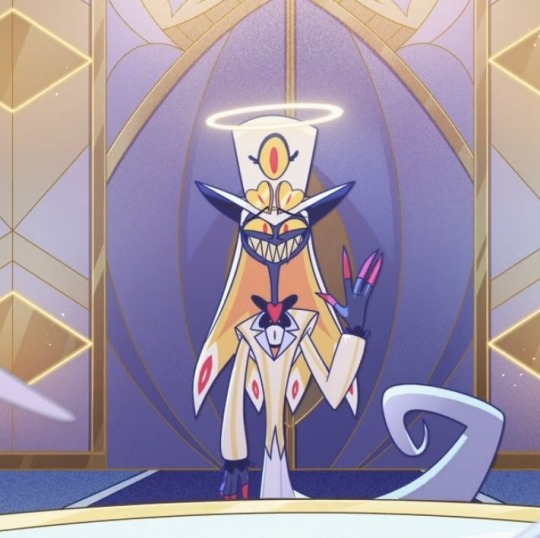
Speaking of love, let's talk about that!
No more eyes on his tail, now it's just on his chest (showing he's opened his heart), his glasses are now heart shaped, and even the markings inside his hood resemble kiss marks more than anything else.
And look: the mark on his hood is now heart shaped!
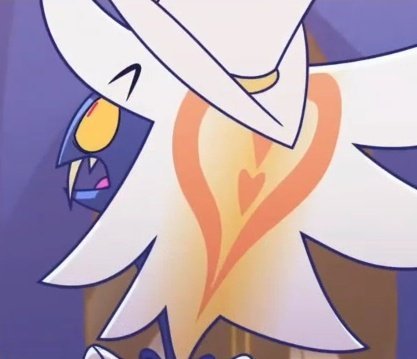
Why all these hearts? Why did all the eyes disappeared from his body? Even his eyes that were looking at his back?
Simple: love. Love defeated his insecurities and self hatred. He died for love.
He died protecting his friends, his new family, his new home.
He confessed and kissed Cherri knowing full well he wouldn't have made it, and yet he went anyway.
The usually cowardly and timid Pentious actually faced a great danger with courage and determination: he acted selflessly by putting himself in harm's way, he didn't steal (naturally) and by going against Adam he did indeed "stick it to the man"!
He used his weaponry knowhow and battle experience not to conquer, but to save his loved ones.
His only thought up until his demise was: "I'll go down protecting them".
And he's been rewarded not only by becoming an angel, but also being spawned directly in front of Emily and Sera, two Seraphim, the highest rank for an angel to have, who have also been depicted as snakes of fire throughout history! Sir Pentious, the lowly demon considered a failure by everyone, actually has been noticed by the Seraphim! He's come so far!
He's now come to represent the REAL symbolism of a snake: the duality of death and rebirth, transformation and immortality (ironically a reference to the fact he's been around since 1888 without ever dying from any Extermination or blessed weapons).
And isn't so poetic that a snake, the "source of the original evil", was the first sinner to ascend to Heaven? Or that this episode was released on February 1st, or National Serpent Day?
And of course, as the Bible itself says:
"Greater love has no one than this: to lay down one’s life for one’s friends."
(John 15:13)
And knowing him, I'm confident in saying he'll keep helping his friends even in his new position, like the soft hearted noodle he's always been, but was to afraid to show it up until now.
#Vivziepop#Hazbin Hotel#Hazbin Hotel Spoilers#Hazbin Spoilers#Sir Pentious#Fave Character#Comfort Character#Personal Rambles#What a wonderful lovable character he turned out to be 🥲#Character Analysis
3K notes
·
View notes
Text
Some thoughts on why and how I believe Crowley and Aziraphale's relationship would incorporate sex/why I do not read them as wholly asexual:
This is something I've seen the most discourse about in this fandom, and I've had a few thoughts of my own that I really wanted to expand upon in a full meta/character analysis post. I do understand that this can be a contentious topic, so first, let me clarify a few things:
First of all, this is going to be long. Tbh it probably won't be that organized either. I ramble and I'm not very good at editing, so just... you know. Be warned. (*Hi, it's me from 2 days after writing this; I'm really not kidding, it's LONG)
These are all my own thoughts. They might not be hot takes, because recently I've seen more than a few people come to the same conclusions on a lot of these points as I have. But I've also had these notes in my drafts for about a week and a half now, and have been continuously adding to it as things have occurred to me. This post is essentially just somewhere for me to collect the separate but related meta I've been kicking around in my head.
I fully respect anyone who does see and prefer an asexual reading of this relationship. These are my own thoughts and interpretations as someone who is not asexual. I am in the LGBT+ community, so while I do know a few things about the asexuality spectrum, I am by no means an expert.
This is NOT something I expect, need, or even necessarily want the show (or, God forbid, Neil's tumblr ask box) to address. Tonally, it's just not that kind of show. Newt and Anathema's sex scene was very much played for laughs, and it worked for that reason. If the show found a way to address it in a way that was both appropriate for the tone of the show and ultimately satisfying, then great! But there is so much more to this relationship than sex, and I didn't need a kiss to confirm their love, so I certainly don't need a sex scene. As immortal beings (as I assume they'll stay) there is so much of the rest of their lives we'll never get to see. You can headcanon them as asexual and potentially be right. I can headcanon them as not and be equally potentially right. Again, these are just a collection of my own thoughts, because I think the question of sexuality (or lack thereof) is just as interesting a facet of these characters as any other.
Note: Tbh I've been second-guessing this whole post and debated deleting the whole thing several times for being silly or unnecessary, bc I don't want anyone to think that this is the only thing I care about when it comes to this story/characters. But if nothing else, it's inspired me to write in a way that nothing has in a very long time, so I've decided it's worth continuing, if for no other reason than that.
This is going to be a mixed bag of textual reading, subtextual reading, and a full-on reach or two. It's been a while since I've been in an English class, but if my teachers expected me to find a deeper meaning behind blue curtains, you can expect me to read too deeply into the symbolism of a loaded rifle or an ox rib. (This is probably not what my professors had in mind when grading my literary analysis papers but oh well) My point is, if it feels like a reach, I'm as aware of it as you are. I am in no way saying that all (or even any) of my points made were deliberate on the part of Neil or the actors or the writers or the directors. I am no longer the delulu Apple Tree Yard child of my youth, I promise.
If anything said here is in any way offensive or hurtful to anyone in the asexual community, please do not hesitate to message me or comment and let me know exactly what it was. I promise you it is not my intention to do so, and am happy to clarify or outright edit anything that reads that way.
With all that being said, let's talk about why I think Crowley and Aziraphale would absolutely fuck nasty incorporate sex into their relationship.
Note: I am out of practice with essay writing, so I think I'll just go down the bullet points of notes I have been making, and expand on each as best I can
Food
Where better to start than with Aziraphale's introduction to Pleasures Of The Flesh? (Just a heads up, this entire post may feel very Aziraphale-heavy, and with good reason).
This might be the least hot take here. We've all seen the Job minisode. We've all seen That Scene.
Whether this was intentional or not, the symbolism here is off the charts. Eve was tempted by an apple. So why not go a similar route and tempt Aziraphale with another fruit, or cheese, or bread, or literally anything else for his first experience with food? Instead, we go with a huge, glistening slab of fresh meat that he proceeds to absolutely go feral upon, moaning and gasping into his meal while Crowley watches with what definitely doesn't look to be disgust or even satisfaction with a good temptation. There's surprise at the ferocity of Aziraphale's appetite, certainly. But ultimately he looks to be intensely fascinated by it, while the thunder crashes, the music crescendos, and the earth literally shakes around them.
(It's also interesting to note how very little it takes for Crowley to tempt him with the ox rib. One murmured suggestion, a bit of unwavering eye contact, and vavoom Aziraphale immediately meets him in the middle.)
Cut to Aziraphale devouring the rest of the meat with Crowley splayed back on a makeshift bed, drinking wine and continuing to watch him indulge through half-lidded eyes. Outside a thunderstorm rages while they're learning secrets about each other in warm flickering firelight. It's cosy, it's intimate, and if they'd thrown in a bearskin throw blanket, it might as well be a post-coital scene straight out of Game of Thrones.
The next time (chronologically) we see them discuss food is when Aziraphale "tempts" Crowley with oysters in Rome. So Crowley first tempts Aziraphale with meat and then Aziraphale tempts Crowley with what is widely regarded to be an aphrodisiac. Interesting.
And then chronologically after that, the Arrangement begins to form, which has always reeked of a friends with benefits situation. Just to throw that in there.
It's What Humans Do
In the very first episode, we're shown Gabriel's obvious disgust and bewilderment towards Aziraphale eating sushi, calling it "gross matter" and being proud of the fact that he does not sully his body with it. Aziraphale initially tries to defend his own enjoyment in it, before passing it off as something that humans do, as something he simply has to do in order to blend in (which we know very well is not the case).
He does this again in season 2, passing off Nina and Maggie being in love as "something humans do". But it isn't, is it? Angels are beings of love, and can sense it, and understand very well what it is... up to a point. Even romantic love is obviously within their wheelhouse, given what we now know happened between Gabriel and Beelzebub (we'll come back to them).
What the "humans do" that angels wouldn't understand is messy, physical forms of love.
But here's the thing: Aziraphale and Crowley love doing what the humans do. They love drinking, they (or at least Aziraphale) love eating. They love music. Crowley loves driving and sleeping and watching rom-coms and sitcoms. Aziraphale loves reading and doing magic and earning little licenses and certificates for achievement in his various hobbies. They love to playact at being human so much that they've stopped playacting and started building a genuinely human lifestyle for themselves and with each other.
Once together in an unambiguously romantic sense, why do we think they wouldn't also want to explore one of the most prominent, intimate, powerful human expressions of love and desire with each other?
Angels, Demons, & Asexuality
Here's where I really want to clarify that in no way do I mean that sex is necessary for a healthy, fulfilling, and loving romantic relationship, or that the lack of desire for sex makes you any less human. Asexuality is a sexuality as valid and human as any. What I would say is that it is definitely in the human minority compared to allosexuality.
Angels and demons, on the other hand, are predominately asexual. Sexless/genderless unless Making An Effort. (Which, btw, is a concept introduced as early as the original book; why even bring it up as a possibility? Why not keep angels/demons being sexless/asexual as a hard and fast rule, if not to open up the potential for later use? Chekhov's Effort, if you will. And isn't that something that Aziraphale in particular is shown to do time and time again? He makes an effort in French and driving and magic, doesn't he?)
And this is why I don't believe Aziraphale and Crowley necessarily need to be asexual, narratively. There is already a huge amount of ace rep within the angels and demons (and no, not just the horrible ones. Muriel also doesn't "drink the tea" and has no reason or desire thus far to Make An Effort, and there are certainly other angels and demons who aren't horrible like the archangels seem to be who likely wouldn't Make An Effort either).
The central conflict for Aziraphale and Crowley is that they are on their own side, the ones who went native, the ones who are so different in so many ways from their respective hives. It would make sense for them to also break away from traditional angel/demon asexuality.
I say "traditional angel/demon asexuality", because I would also like to note that I would absolutely not rule out demisexuality for either of them. This post is being written to as a response to people who specifically believe that they (like the rest of the angels/demons seem to be) would be sex-averse in a relationship, and that it wouldn't be a factor in their relationship. I could easily read them as demisexual, but I do think there would be no real way of verifying this, because they've never been able to form as close an emotional relationship with anyone else but each other. Certainly not in heaven, and I can't imagine they would be able to form that kind of attachment with any of the humans, who they love and emulate but ultimately regard as the separate species they are. So yes, they could either be allosexual or demisexual, in my opinion.
Then again, now that I think about it, Making An Effort itself could be a great metaphor for demisexuality, since they would be entirely sexless/asexual until they have enough of an emotional connection with someone to consciously manifest otherwise. Since the other angels and demons don't generally form those types of emotional connections with anyone, there hasn't been a precedent for it.
Except...
Brielzebub
We do have a precedent for it now, don't we? Gabriel and Beelzebub fell in love. They are a direct foil for Crowley and Aziraphale's relationship, speedrunning right through their courtship and finding their happily ever after on the other side of things.
For being such a 1 to 1 comparison, it feels deliberate that they did not kiss. They held hands, they were gooey with each other, but they did not kiss. That feels like such a deliberate thing to omit when you know what's to come at the end of the episode between Crowley and Aziraphale.
And going back to the food = sex metaphor for a moment, let's notice how even as they fell in love over the years, even when pints and crisps were there on the table in front of them, they never felt the desire to reach out for them. They didn't need to. It's a date (love story) even if you aren't eating dinner (sleeping together).
Yes, I know Jim liked hot chocolate. No, I am not counting it because I don't consider Jim and Gabriel to be the same person with the same proclivities, and Jim was highly suggestible at the time anyway.
Gabriel and Brielzebub's big happily ever after moment (as of now) was one between two asexual supernatural beings. They did not need to kiss to drive the point home. They showed what Crowley and Aziraphale could have, if they would only acknowledge it.
Crowley & Aziraphale's Dissatisfaction
But they do have that already, don't they? If you really think about it, what do Gabriel and Beelzebub do with each other that Crowley and Aziraphale don't already? They hold hands, they spend time together, they create little rituals, they give gifts, they're visibly and verbally affectionate with each other, etc. They are more or less already in a romantic asexual marriage relationship with each other, aren't they?
And it doesn't seem to be enough for either of them.
At the beginning of the season, Crowley is immediately shown to be unsatisfied with the way things are. Obviously part of it comes from living in his car, but it seems to be more than that (especially since Aziraphale makes it clear that the bookshop is just as much Crowley's as his, implying that he could have been living there the whole time and is choosing not to, for some reason?). You could argue he's feeling unmoored without Hell telling him what to do, but isn't that what he wanted? Isn't that what he still wants, by the end of the season? All season long, he's never indicated the desire for a new job, or a new project. He stopped the apocalypse because he wanted the freedom to openly spend time with Aziraphale, to spend his time on Earth however he sees fit. Until Gabriel arrives, he has exactly that (minus a flat).
So where does the dissatisfaction come from? And if it represents anything to do with his relationship, what does he want out of it that he isn't getting already?
I think Crowley only really comes to the realisation of what he's missing when Nina names it for him, not only putting them in the category of romantic, but physical (outright asking if they are sleeping together). These two posts [1], [2] go into more detail about what I mean, but I think it really pushes him into acknowledging that their relationship is more human than either of them have stopped to consider, and what that might mean as far as everything a human relationship can entail.
After all, Nina and Maggie only advised that he should talk to Aziraphale, make clear his feelings. The decision to kiss him, to tip them over the edge from nonphysical to physical, that was all him. And no, kissing isn't sex, but I wonder how taboo even that might be in the kind of all-encompassing asexuality most angels seem to identify with. (If they're disgusted by food and drink, I can only imagine what they think of snogging, much less sex.)
Aziraphale doesn't have this moment of someone observing their relationship from the outside. He loves Crowley, and as of 1941 probably even knows he's in love with him in a way that Crowley doesn't understand yet. Which makes sense, since love is technically his job, he'd be more likely to recognise it for what it is.
However, Aziraphale's reference for romance and relationships is Jane Austen. It's chaste. It's dancing and dinner and doing sweet things for each other and roses and candles and handholding. He contextualises his love for Crowley in that soft fantasy sort of way, where it's there, it's obviously there, but it's neat and easy and unspoken. Not to quote Glee in this, the year of our lord 2023, but it's all very "the touch of the fingertips is as sexy as it gets".
Someone should tell that to Aziraphale's face, then.
I'm not going to pretend I know what Michael Sheen's script notes were, but there were definitely some Choices™ made. Because yes, there were plenty of moments in both seasons with Aziraphale looking at Crowley in a sweet, loving, smitten way. And then there were moments that were yearning.
But yearning for what, exactly? All of those sappy Jane Austen tropes already apply to the two of them. So why are there moments where Aziraphale is looking Crowley up and down like the last eclair in the window and licking his lips and visibly exhaling like he's trying to get in control of himself (see: Bastille scene + Crowley telling Muriel to ask him if they have any other questions about love)? Why is Aziraphale not only unconcerned when Crowley shoves him bodily up against a wall in s1, but staring at his lips and a beat too late in noticing Sister Mary's arrival? Why are some of his lines so suggestive? I'm sorry, but the car ride after the church explosion might as well have been the beginning of a Pizza Man porn with a really weird Blitz theme. If even my mother picked up on that vibe, I can't imagine it wasn't intentional on part of both the dialogue and the delivery.
(This section may feel like more of a reach/joke, but I'm really only 20% joking. These are writers and actors who are EXTREMELY good at their jobs; they know what they were doing here.)
More importantly, I don't think Aziraphale is even aware that there is more to what he wants. He lives in the Jane Austen fantasy and it never even occurs to him that he might be interested in anything further. It never even occurs to him that, as an angel, there is anything further to be interested in in the first place. Until Crowley forces it to occur to him. Just like I believe Nina forced Crowley to confront the idea that romantic love is what he's been feeling all along, I believe Crowley forced Aziraphale to confront the idea that physical intimacy is something he's been wanting, without even realising.
Aziraphale's Hedonism
Expanding on Aziraphale for a moment. We talked about his relationship with food, but we all know that Aziraphale is defined by his love of things that Feel Good.
It isn't just that he and Crowley love human things. Aziraphale loves the best of the best, or at least his version of it. He doesn't just love food, he loves going to fancy restaurants. He doesn't just love clothes, he loves soft, cosy, warm, plush clothes, or shiny, flashy, bougie fashion. He loves the warmth of tea and cocoa, loves getting drunk, and sitting in a comfy chair in the sunlight. He doesn't just experience, he indulges.
Given the emphasis put on things that Aziraphale loves just because they Feel Good, it feels narratively strange to assume that he wouldn't enjoy the feeling of being touched, or that he wouldn't be willing to try it, at least once, with someone he cared very deeply for. And just like the ox rib, I think that once he gets the first taste of things, he would absolutely tip over into complete and utter self-indulgence.
Dancing
I also think that dancing could be construed as a huge metaphor here. After all, we're told flat-out that angels don't Dance. Except one.
I would argue that Aziraphale, in fact, Made An Effort to learn how to Dance. He threw himself into the gavotte with delight (at a Victorian gay club; noted) and worked hard to be good at it. He's chomping at the bit to Dance with Crowley, working up the nerve to ask him with undeniably romantic intent and eagerness. So, angels don't Dance... unless they Make An Effort to do so.
We are told that demons, on the other hand, do Dance, but not well. Makes sense, since they're the ones who would want to encourage a deadly sin like lust, but have as little understanding of human love and physical intimacy as the angels. Crowley, however, is shown to be an excellent dancer at the ball, especially in his compatibility with Aziraphale.
(But Aziraphale WandaVisioned the ball so everyone knew how to dance! Yes, he did. However, the rest of the brainwashing doesn't seem to affect Crowley in any way, and they did actually live through the time period where this sort of dancing was a social norm; I'd be surprised if he never needed to learn. After all, the demons can't spell either, and Crowley is at least functionally literate, as far as we know.)
As of today, it's also been confirmed that when Aziraphale asked Crowley to dance, Crowley replied with "you don't dance." Not "WE don't dance". So going along with the metaphor, Crowley is just now discovering that Dancing is something Aziraphale is interested in at all, much less with him, and not denying that he himself is interested in Dancing. In his defense, I believe he was asleep for a few years while Aziraphale was learning the gavotte, so he wasn't exactly aware of Aziraphale's hot girl summer.
Love Languages
I want to expand on that; Crowley and Aziraphale's compatibility. Specifically in regards to their individual love languages.
We all know Crowley's love language is Acts of Service. I don't think there's any debate there. He loves it, Aziraphale loves it, they're both aware of it, we're all aware of it, God and Satan are aware of it, no surprise there.
You may disagree with me, but I believe Aziraphale's love language is Physical Touch, for a number of reasons. One of which being his aforementioned hedonism. Aziraphale likes things that Feel Good, remember? He likes soft clothes, and well-worn books. Neil himself has said that they like holding hands. And any time he is taken by surprise (Brielzebub getting together, the wave of love in Tadfield, etc.) what is the first thing he does? Reaches out for Crowley. He stops him with a hand to the chest in the pub. He leads him by the hand to the dance floor. He guides him by the waist in the graveyard. He reaches out during the entire Brielzebub scene, whether he can reach Crowley or not. Despite his own turmoil, he grasps at Crowley's back during the kiss.
The one time Crowley reaches out for him (not counting the kiss yet; we'll get there), he is aggressively pushed against a wall (by someone he loves and trusts) with a complete and utter lack of concern (and perhaps some interest, depending on how you read it).
And when he isn't reaching out for anyone, or there isn't anyone to reach out to? Well, he's wringing his own hands together, squeezing his own fingers, as if to find that physical comfort in himself.
So. With that theory in mind, we have Aziraphale (Physical Touch) + Crowley (Acts of Service). Throw in 6000+ years of deep love, cherished companionship, and forcibly repressed longing, and there is a very real potential of this combination resulting in fierce sexual compatibility. Where Aziraphale would want to touch and be touched, to indulge in physical pleasure with someone he adores, in the same the way he indulges in every other fine thing in his life. And where Crowley would want to indulge him in return, to give him everything he wants, and to take pleasure in Aziraphale's pleasure, in the same way he enjoys watching him take joy in food everything else.
So Aziraphale is an angel who is insecure about his own less-than-holy desires, who would want to treat Crowley like a luxury to be touched and cherished and adored. And Crowley is a demon who has, over the millennia, been unhappy about how they've been forced to deny even their friendship with each other, who would want Aziraphale to feel comfortable and safe and encouraged to indulge in earthly delights. That sounds like a stunning recipe for sexual compatibility to me.
"You said 'trust me'" / "And you did"
Just like the Job minisode, the Blitz is RIFE with symbolism (intentional or otherwise). This one will be quick, but I did want to touch on it because I thought it was interesting. Maybe I'm reaching at this point, but I'm assuming you read the tin.
First of all, Crowley not wanting to admit to never firing a gun before; comes off as someone who very much does not want to admit to their crush that they're a virgin ("You must have done this lots of times!" / "Umm.... yyyyyeah.")
(You could make the argument that Aziraphale having a firearms license and a Derringer in a hollowed-out book is symbolic of him not being a virgin while Crowley is. I disagree, for reasons I'll go into later, but it's a valid reading. However, I see it more like keeping a condom in your wallet; it's there in case you need it, but the opportunity has not yet risen no pun intended.)
More importantly, the theme of this entire minisode is trust. We already know they trust each other with their lives against the rest of Heaven, Hell, and the world. But specifically, this is about the importance of having complete trust in your partner in a charged, physically vulnerable, intimate moment, where the only danger is between the two of you.
Aziraphale needs to believe Crowley would never hurt him if he can help it. Crowley needs to trust Aziraphale's unwavering blind faith in him. Frankly, it all feels very symbolic of two people deeply in love losing their respective virginities with each other.
The trick is a success, and they share an intimate candlelit dinner in which they reaffirm their faith in each other. Aziraphale also begins to voice his agreement with Crowley, that maybe Heaven's rules shouldn't have to be as black and white as they are, and that there are benefits to... blurring the lines, shades of grey, wink wink (at which point even my mom was like, whoa guys, this is a family show).
Btw also: Can we all agree how much it looked like Crowley was getting ready to get a lapdance in that one scene? You know the one.
Also also: "Aim for my mouth"? Come on.
The Birds & The Bees
Now that I think of it, there's also something to be said for the fact that Crowley and Aziraphale are both obviously familiar with where babies come from (how they're made and how they're born) while the other angels aren't.
Something something Aziraphale and Crowley fundamentally understand sex and reproduction in a way the other angels (and probably demons) very much do not, nor have any desire to.
Probably not important. Just thought it was worth mentioning.
The Kiss™ & Religious Trauma
The Kiss. Where to even begin?
This has definitely been the hardest one to start, because there is so much going on here that I definitely won't be able to cover it all, and will certainly miss a few things here and there.
Aziraphale's reaction to the kiss afterwards is the most interesting to me. And I don't mean directly after, I don't mean the "I forgive you" part. I mean the way he touches his lips when Crowley is no longer in the room and he no longer needs to save face, when he is completely alone. Had it been directly after the kiss, it would have been rightfully read as horror, or disgust, a shield to discourage further action.
It's not. It isn't just a touch, it's a press. As desperate and angry and unexpected and imperfect as the kiss had been, Aziraphale is pressing it into himself, recreating the feeling as best he can. Beneath all the poor timing and shock and hurt from their fight and fallout, I think it's fair to say that it was something he enjoyed. Something he doesn't think he should enjoy, something that Feels Good that he only allows himself to indulge in when completely alone.
Remember, Aziraphale's idea of love is Jane Austen and gentleness and courtship and fantasy. If he'd ever even considered kissing an option, it might have been gentle pecks, cheek kisses, forehead kiss, hand kisses. Soft, safe, chaste affection.
Crowley's kiss turns all of that on its head. He introduces physical intimacy in a very real, very messy, very human way that I don't think Aziraphale ever even considered could apply to them. Considering what other angels are like and what they look down on, even Aziraphale's Jane Austen fantasies probably would have been considered taboo.
So for their first kiss to be rough and desperate and passionate in the way it was, of course he was confused and in shock. It was deeply physical, and as overwhelming and awful as it was in the moment, it Felt Good. Enough that he grasped at Crowley and kissed back, if only just for a moment, before stopping himself. Enough that he actively pressed it into his lips afterwards, in private, to remember.
I adore how Neil has decided to evolve these characters past the first book/season. More so in this season, Aziraphale and Crowley have both become such interesting allegories for queer people on either side of the spectrum of toxic religion. Aziraphale in particular obviously, because he is the side that so desperately wants to believe, to make a difference, and to unlearn all of the propaganda he's been fed over such a long time. Just like so much of organised religion, there is so much that he is told, time and time again, that he should not want, that he is silly or stupid or outright wrong for wanting. It reminds me so much of the severe Catholic guilt one might feel for wanting/engaging in sex for the first time, and the stigma of being queer layered on top of that.
What is so critical to Aziraphale's character is that he goes on wanting, and more than that, actively pursues. He was convinced to go up against Heaven and Hell and stop all of Armageddon because he wanted to go on listening to music and eating lunch and reading books and enjoying the simple company of the person he cares most deeply for, even if that person is supposed to be the enemy.
All this to say that if angels are as generally asexual/sex-averse as I believe them to be, narratively speaking, it would make sense for Aziraphale to be singular in that regard as well. Mirroring his first experience with food, it would make sense for Crowley to be the one to first introduce this new messy, physical, human dynamic between them, for Aziraphale to hesitate (obviously we are at the Hesitation phase at the moment), and then (eventually) for him to dive in wholeheartedly, to absolutely glut himself on this new thing that Feels Good. It would make sense for his character development to show him overcoming his metaphorical Catholic guilt and pursuing the sexual intimacy most (if not all) of the other angels would scorn.
(I can't help but remember that plot idea Neil described from the unwritten sequel, with Aziraphale in a hotel room trying to watch a full porno by way of the free 2-minute teaser clips so he wasn't technically sinning by paying for it. I so hope this is used in season 3, because gosh, I wonder why Aziraphale would suddenly be so interested in observing human physical intimacy after 6,000 years. Lonely and doing a little surreptitious research there, angel?)
Crowley, on the other hand, is the queer person who has broken free from his toxic religion. He prides himself on being his own person, on their his own side. He doesn't have the hang-ups Aziraphale does. He doesn't worry that he's going to be judged or cast aside for wanting things he's not supposed to. So it only makes sense for him to be the first one to suggest/initiate physical intimacy. It makes sense for him to be the one who "goes too fast" (another fantastic example of this dynamic beginning as early as s1; what is that conversation in the car meant to represent, if not Aziraphale being overwhelmed by the intensity of their relationship, and his fear of succumbing to it when he believes he shouldn't? It's also interesting that this is the first conversation to take place in Soho, just after watching Aziraphale realise he's caught feelings for a demon, with the red glow of lust serving as the backdrop).
Do I think the kiss in and of itself was sexual? No. I think it was a passionate and devastating last-ditch effort on Crowley's part to convey the way he feels for Aziraphale. Not just that he loves him, but that he loves him in the most human way possible. But I do think that the kiss represents how they can move forward from here, and what they might want to explore with each other once they feel free enough to do so.
In Conclusion
I am sure, deep in my bones (unless we are explicitly told otherwise), that this was both of their first kisses no, I'm not counting the gavotte, and that neither of them have ever thought to do anything else physical with the humans while they have been on Earth. Like I said before, they adore the human race and lifestyle in general, but ultimately view them as a separate species altogether, and they seem mostly happy to keep to themselves and each other, unless otherwise necessary. I just can't see either of them being drawn enough to a human to pursue anything close to sex. If Crowley in particular has had anything to do with sex in the context of temptations, I'm positive he would be inciting lust amongst the humans themselves, not involving himself directly. At least not that directly.
So, like every other human experience they've had on Earth, sex is something new that they could explore together, just the two of them, on their own side. A deeply intimate, tangible declaration of their love and everything they've gone through to earn it. A visceral finger to give both Heaven and Hell. A renewed appreciation for their corporations and for each other's. A enjoyable method for immortal beings to simply pass the time in each other's company. A new and exciting way to Feel Good, and all the variations that come with it.
You might agree with this post, or you might not. Whether this is something that is ever addressed or not, it doesn't matter to me. This is a brilliant love story either way, and I genuinely feel so privileged to witness it.
But I just can't find it in myself to imagine, given everything we know about these two characters, that sex isn't an experience they would both consume with wholehearted enthusiasm, curiosity, and profound, ineffable adoration.
___________________________________
Bonus feature: the very silly notes I made to myself that inspired this post
#pinned post bc I'm particularly proud of how it turned out and i don't want it to get buried when people check out my blog lol#Good omens#good omens spoilers#good omens season 2#good omens season 2 spoilers#good omens 2#good omens 2 spoilers#gos#gos spoilers#gos2#gos2 spoilers#gomens#gomens spoilers#gomens 2#gomens 2 spoilers#good omens s2 spoilers#ineffable husbands#aziracrow#aziraphale#crowley#mine#meta#character analysis#character study#discourse#making an effort#this literally took me a week to finish i really hope it doesn't sound stupid lol#i know I'm gonna wake up in a cold sweat every couple days bc i forgot to add something but i needed this out of my drafts and also my brain
2K notes
·
View notes
Text
Adventure Time new episodes
This is for "Destiny" and "Winter King". I am not making a big analysis, honestly I have no idea where the miniseries is heading, but here are a couple of points I want to make.
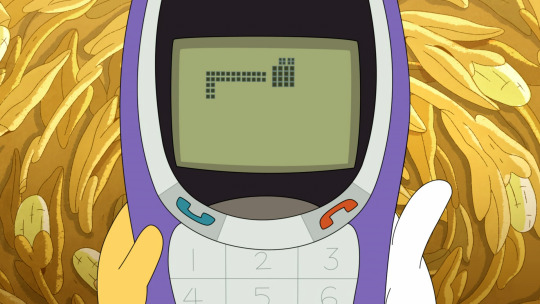
So, to start us off, this is obviously Snake on a Nokia phone... the controls for this thing were absolute garbage but it did the job. Is the snake eating little bunnies????
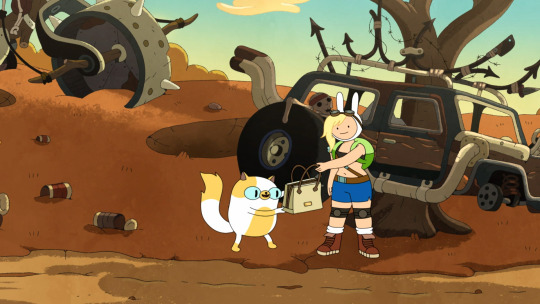
It's interesting that designer bags are the same in both worlds, but that makes sense because this is just another future version of a world Simon lived in.

When I first saw Jay, I assumed he was Finn's baby brother from the Farmworld universe - wouldn't the baby brother be about the correct age??? - but he's actually Finn's son!

Jay and Bonnie are a reference to the episode Puhoy! Their mother was most likely Roselinen. Our Finn had specific reasons for naming them Jay (Jake) and Bonnie (PB). Farmworld Finn named them that too but unless he knew a farmworld PB it's more of a reference than anything else.
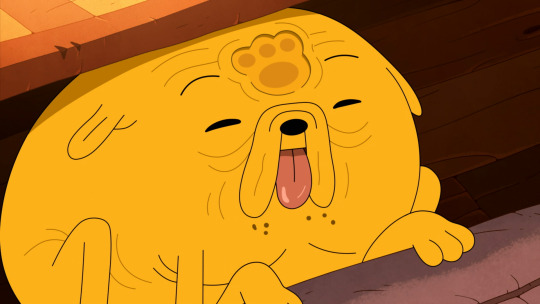
Also... against all reason, Farmworld Jake is still alive! Barely!
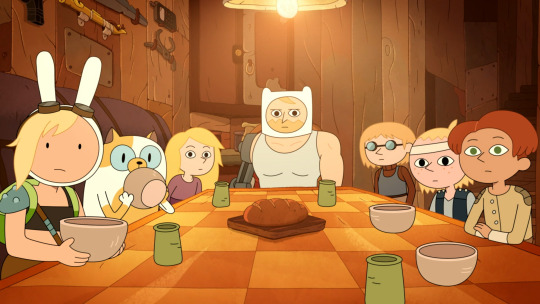
Finn had a LOT OF KIDS and also his wife his dead. Damn, even in this world. Most of his kids have his or Rosalinen's hair colour but the boy on the right looks a lot like Hunter from the first episode.
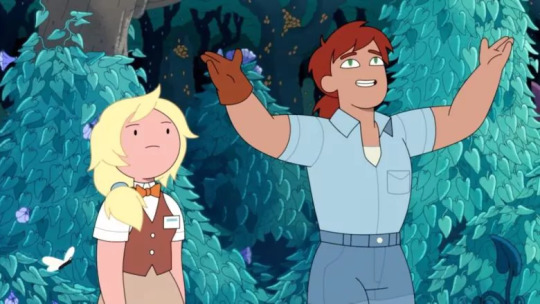
Take that as you will...
Like in the original S5 episodes there are farmworld versions of some characters like Choose Goose, Starchy, and Wildberry Princess. So there was probably farmworld versions of most of his friends. We already saw what happened to this version's Simon and Marcy, who both died brutally.
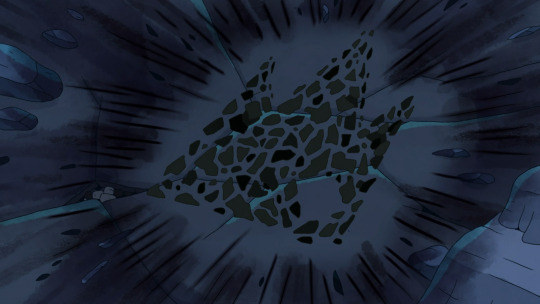
The crown is in the giant crater because it was evaporated by the goddamn nuke. Incredible that any part of it survived, really.
The rest of this episode speaks for itself. It was a fun look at an alternate universe where Finn lived a very different life. His personality here is nothing like our Finn who is a lot more adventurous. Farmworld has taken its toll on our boy.
Onto Winter King...
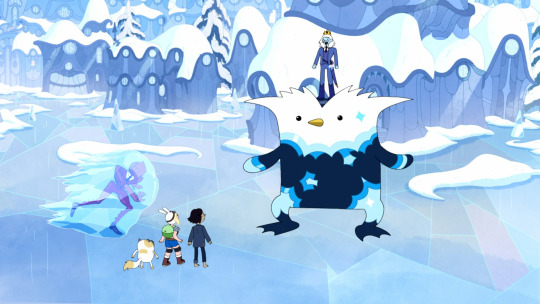
This penguin boy doesn't seem to be 100% ice. It's possible that his beak was stuck on like a snowman, but it's also possible this is a transformed version of Gunther.

This Ice King's history is very similar to our Ice King's. Most changes were 100 years ago when he transferred the twisted madness to PB.
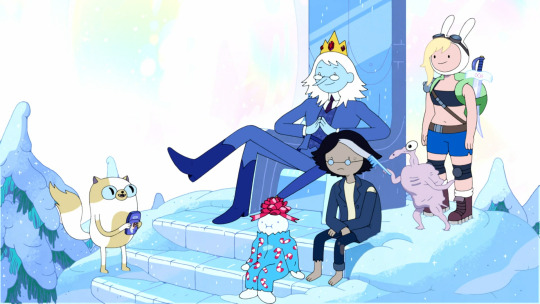
Can someone explain to me why there is a naked chicken here???? I do not like this at all
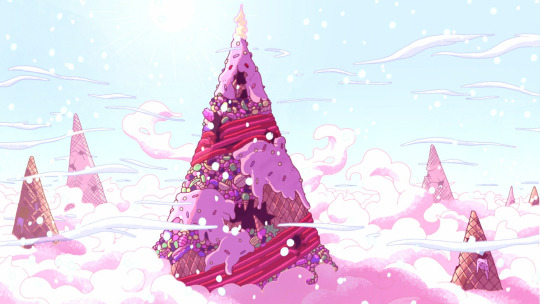
I checked out two designs that I thought this place might be referencing. It doesn't look like either but, eh.
Below is Candy Kingdom concept art from 2008.

Below is Candy island from Flapjack!
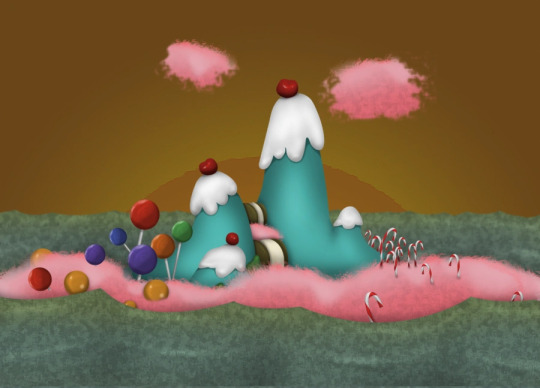
And below, ironically the most similar looking, is Candy Island from Bob's Burgers.
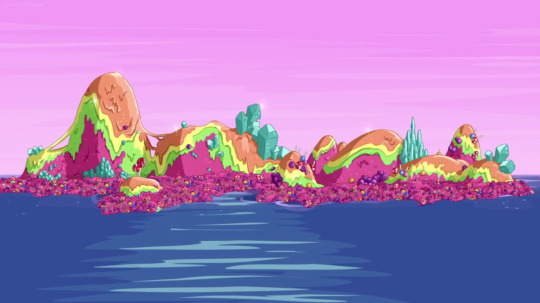
Some interesting things about this alternate Simon...

This young Marceline with the axe has implications for why this Simon might've turned "evil". Marceline either ran away from him after what he did to PB, or she died at some stage. He made an "Ice Marcy" to replace her.... Young and adorable, just she was when he was Simon. This seems to be his method for dealing with any problems.
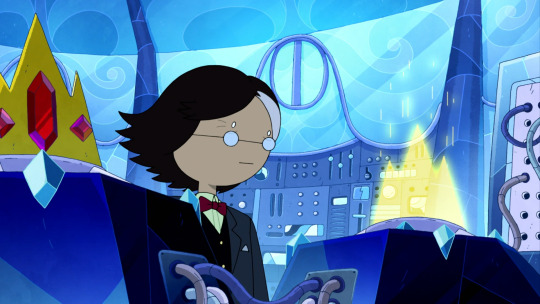
His science in this room was interesting... it reminded me of Princess Bubblegum's technology, or the stuff that Simon and Betty were able to make when combining science and magic in the land of Ooo. Honestly I don't feel that he'd have been successful in duplicating the crown, but he was immediately willing to try.

The reason Simon doesn't remember Betty as his great love is because this was an important part of his madness. When he transferred his madness to PB, he also transferred his obsession with Betty.
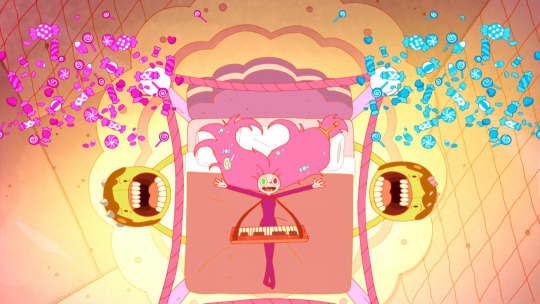
This is why Candy Queen is so obsessed with kidnapping Ice King and Simon, it's the exact reason why Ice King used to kidnap her!
Also, 10 out of 10 to Hynden Walch in this episode. I was convinced there was a different voice actress for Candy Queen, but upon checking the credits, it really is her. You can recognise her singing well too.

This version of PB has a lot more mastery over her candy elemental magic. It's probably a result of being possessed by the Crown's madness for so a hundred years. You see her doing all sorts of crazy stuff as Candy Queen, though in that state her abilities are a lot more like Ice King's than they are like the insane PB from the Elements miniseries.
It's really funny that PB is like "I'm trying not to dwell on it" about the hundred years thing. AT is very casual like that. Though she's gonna be very sad when she realises Fionna and Cake ripped the faces off most of her candy people. Brutal scene.
And it's funny how she kissed Fionna. She just does that with all her knights. I wonder if there is a Finn in this universe? Ice Prince seemed to expect the Ice girls to save him...

I found it sweet that Ice King really wanted to save someone else he saw as being possessed by madness. It was entirely possible that CQ was just "like that", but he was right on the money, and it shows how he contrasts to his alternate self, who is actively benefitting from this situation even if he gets regularly kidnapped. And it's not like Fionna is doing anything that Finn didn't do to Ice King!

This scene was brutal. Funnily enough I watched Infinity Train book 3 with Kim last night, this reminds me of the moment THAT Simon-- Oh my God, does this always happen to characters named Simon?
Fionna removed the magic from the crown, so Simon aged rapidly, just like in the episode "Betty". Though this time it happened instantaneously rather than across 11 minutes.
I think this is the part where Fionna realises her rampage across the multiverse is genuinely hurting people.
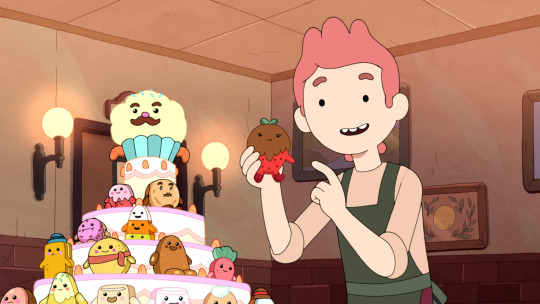
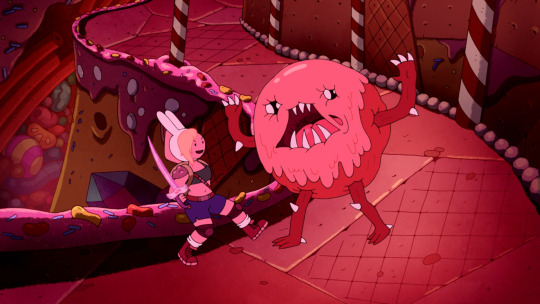
It was VERY CUTE watching Gary Prince (holy shit that name) show off his little Candy Kingdom. There's a lot of elements of PB there, and it parallels how ultimately the Candy Kingdom was PB's own version of the cake - she made all these characters and made little stories for them, which we know from the show was her way of dealing with the world.
What was REMARKABLY FUCKED UP was the shots to Fionna murdering possessed versions of these beloved characters. I mean... they're PROBABLY all still alive, but they are very fucked up now.
I also enjoy how the Lemoncarbs - Tree Trunks calls them that!! - are both here and alive, and superior to Gary lol. And I think Jinx Monsoon's voice acting here fits a lot better than in episode 4 where they tried to do a straight imitation of Lemongrab.
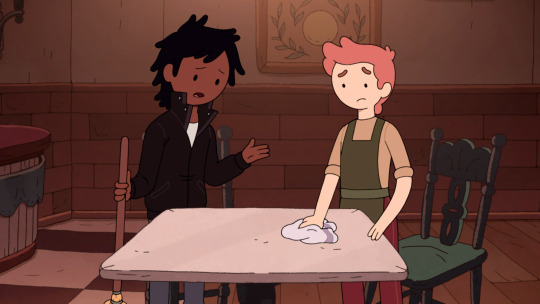
I haven't said much about these two but you can see how they contrast - Marshall just Does things, while Gary procrastinates constantly. And Marshall's behaviour can seem reckless but Gary would've never taken that big step forward without his help. It's funny how Marshall can just call his mother to summon the Lemoncarbs in the middle of the night, and sweet how he'd do that to help Gary.
Then he listens to the autistic boy gush about his characters. Awww.

This world here is obviously a joke about the elusive Adventure Time Babies show that Muto was terrified he'd be asked to make. Hell it's possible he pitched this show to CN once or twice. But Baby Looney Tunes and Tiny Titans are both famous spinoffs of this ilk, and Craig of the Creek got a spinoff about Craig's baby sister.
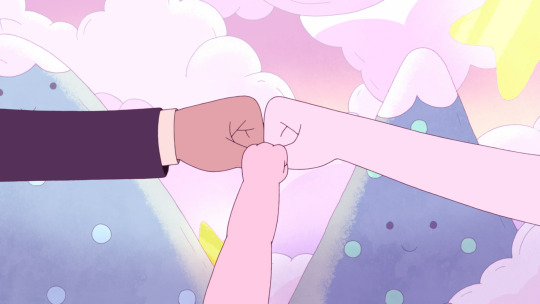
Simon is still determined to become Ice King again but he wants to "do it right". I still think he's HORRIBLY MISGUIDED but he is starting to realise that, maybe, he is the best version of himself. He could've been a huge ding dong like Ice Prince.
Also Chan is going to be so sad if that's the only time we see Young Finn and Jake.
665 notes
·
View notes
Text
Mirabel Madrigal: A Character Analysis
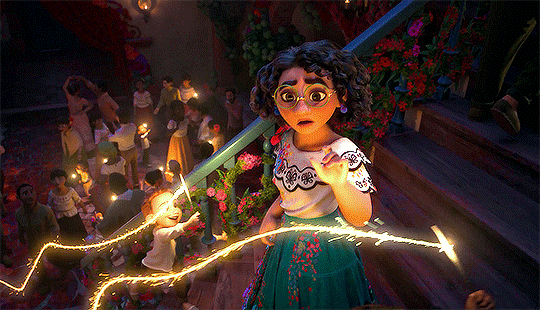
Today I’m here to discuss all the attributes that make Mirabel Madrigal such a fantastical and magical character despite not having any magic herself. it’s all in her charm! I truly believe that Mirabel is one of the best protagonists! Shes such an endearing, sensitive, and strong character so I’m here to offer her some appreciation.
Right from the beginning of the story, one of the first things we learn about our protagonist is her mantra “make your family proud”. This phrase is Mirabel's driving motivation for the entire film and from what we can assume, her entire life. Mirabel makes it no secret that she is family orientated and she is full of pride for them, wanting to be like them and live up to the madrigal name. She introduces us to her family in a fun song praising each member. To her they are a “perfect constellation”. They are always her number one priority throughout the story as we see how she supports her sisters and encourages them to be themselves. One moment I feel truly highlights her love for her family is at the climax of the movie, whilst she consistently has shown what lengths she's willing to go to for her family this moment stood out the most to me. After her intense argument with alma casita starts to fall apart, at this moment everyone is yelling at mirabel to get out of the collapsing house but mirabel isnt thinking about herself. She's thinking about her family and getting the candle for them. What really stands out to me is Mirabel was willing to sacrifice her own life for her family, an eerie parallel to what Pedro did for them all those years ago.
Something that we learn about Mirabel immediately is that she's a go-getter, she's determined and persistent. What we also come to realize is that sometimes Mirabel doesn't realize when she's being overly persistent to the point of coming off as pushy to others. Both Julieta and Isabela point out that Mirabel has a tendency to “over do it”. We see how she wants to be useful in any way and she's taken up a variety of hobbies to prove this. Mirabel's incredibly creative doing everything from embroidery and sewing to playing the accordion. It's no secret she's talented but she always feels like she needs to do more. Upon overhearing Alma talking about the cracks Mirabel decides in that moment “I will save the miracle”. Instead of rushing in without a plan Mirabel knows Dolores would have intel due to her gift therefore she would know the most about the magic. It's also important to note that Mirabel decides to save the miracle before she even knows anything about the prophecy, she took it upon herself to do that! At breakfast when trying to get information from Dolores Mirabel decides to try complimenting her into it, showing early on how unintentionally pushy she can be. After breakfast she's no better, Mirabel is so determined to get answers that even when Luisa is working, she's pestering her. Mirabel is so overly focused on her mission that she can’t see Luisa gradually becoming more frustrated. “Luisa will you just tell me what it is!”, she’s frustrated that Luisa isn't giving her any information but she also seems hurt that Luisa doesn't trust her enough to tell her. Showing how Mirabel desperately wants a better relationship with her sisters.
Mirabel is so persistent in getting information about the magic that she causes luisa to snap at her. When climbing Bruno's tower Mirabel perseveres, as she forces herself up an unusually long flight of stairs and is exhausted by the end of it. Yet Mirabel persists because “I need to do this, for you for abuela”. She's so determined in fact to find this vision that she almost dies, twice. Mirabel doesn't care about the risks, she's aware of them but it doesn't deter her. She's willing to look at the situation about Bruno from a different angle than everyone else, questioning “what if you didn't understand what he saw?”. Mirabel's entire verse in “we don't talk about bruno” is just her pressing for the truth, she wants the whole story not just one perspective and she's driven to discover it. We've already established by now that Mirabel's persistence can be dangerous and this holds true once again as she chases Bruno through the walls and almost falls into a chasm, in pursuit of answers. Bruno tries to leave but she still pursues him, no way she's leaving without an answer or multiple answers to her many questions, she also cleverly pieces together here that it was actually Bruno who's been patching the cracks all along.
Pushy Mirabel is back in full force when she gets the idea for Bruno to have another vision to which he’s not enthusiastic about and tells her no. But Mirabel’s no quitter and her sole focus in the moment is her mission, to save the miracle. So when Bruno tells her he doesn't do visions anymore, Mirabel casually replies “but ya could!”, another instance of her being too focused on her goal that she doesn't take into consideration how Bruno would feel about this. She has no bad intentions and like with Luisa earlier Mirabel is unaware how she sounds. She tells Bruno “our family needs help and you need to get outta here” and as she realizes how broken the family truly is, she's more determined than ever to help them. Even when bruno tries to give up during the vision Mirabel encourages him to keep going to find another perspective “something we’re not seeing?” she ends up inspiring Bruno with this viewpoint. Before she goes to confront Isabela Mirabel tells Bruno “after I save the miracle I’m bringing you home” showing how that's now become part of her mission. As Isabela reveals a massive secret Mirabel instead keeps pressing for that hug she assumes will solve all their problems, once again she's so focused on her mission she isn't paying attention to Isabela’s revelation. Mirabel's determination and persistence is admirable but it's also a character flaw for her as we see she often takes it too far unintentionally.
One of Mirabel's most noticeable traits is her optimistic outlook. She's full of energy as she dances through the town singing about her family and whilst we know she's insecure, her enthusiasm towards her family and home is completely genuine. Mirabel is a true extrovert as we see how much she loves interacting with her community and wanting to help in any way she can. We see how she's always trying to see the bright side. Mirabel is optimistic and bright but even she has her limits and can't be optimistic all the time, as her song tells us she's truly not fine. However despite all her pain she still chooses to be optimistic, to be loving and to be hopeful.
Arguably the two scenes I believe emphasize her optimistic nature the most are when she helps Bruno through the vision and the final song of the movie. During the vision Bruno is deflated, he doesn't believe in the idea and Mirabel simply offers him some words of encouragement “you can do this”, she's already showing Bruno that she has faith in him, something Bruno isn't used to. When he fails to see anything other than what was shown in his last vision Mirabel begs him to keep trying, she's always looking for a brightside and she ends up finding it. As for the final scene, when returning from the river Casita is still a pile of rubble in front of them, Mirabel however sees this as an opportunity. To rebuild casita with better, stronger foundations and a chance for the family to build stronger foundations too, “look at this home we need a new foundation”. Mirabel really grows into herself as she leads the rebuilding efforts with her persistence and optimism, inspiring the whole family to view things from a different perspective.
An underrated trait for Mirabel is her humor. No seriously she's hilarious! humor is shown continuously to be one of her coping mechanisms along with her optimism. Whilst she is funny Mirabel is also incredibly snarky particularly towards her older sister Isabela, she can come off as slightly judgemental at times, very teenage of her. Her jealousy peeks through during the opening song, but towards the end of it when she runs into Mariano she not so subtly disses Isabela (as Isabela is walking by) “between you and me she's kinda a primadonna”. Unlike the better disguised insults at the beginning mirabel is not even trying to hide her disdain towards isabela this time. This continues directly after the song as she goes back to casita, Isabela gracefully descends on her vines and Mirabel’s expression is hilariously unimpressed. When Isabela notices her she tells her to stop trying so hard, we see Mirabel actually seems upset by that comment but as soon as Isabela looks back at her she masks that sadness as she bites back “actually Isa this is called helping and i'm not in the way you are”. We also see her mock Isabela as previously mentioned, unable to hide her disdain towards her. Mirabel's humor as a coping mechanism is emphasized when she's climbing Bruno's tower, giving us a half assed reprise of “the family madrigal” and of course one of her most iconic lines “BRUNO YOUR ROOM IS THE WORST!!”. Mirabel is also incredibly petty, my favorite example of this is not only her rolling her eyes during Isabela’s solo verse of “we don't talk about bruno” but also how Isabela tells her during that “hey sis I want not a sound out of you” and Mirabel who was silent until this point starts singing immediately out of spite.
She's also slightly judgemental when she first encounters resident wall man Bruno Madrigal. She's weirded out by him and her face does not hide this, “how long have you been back here?” with that concerned tone also didn't help her case. Although in this case who could blame her for that reaction? It's not everyday you find your estranged uncle in the walls of your house. Mirabel is not thrilled when the vision reveals she has to hug Isabela, so much so that she begins ranting about how she hates her and gives us a line nothing short of pure gold. “She's the one with flowers coming outta her-'' Bruno had to remind her to keep it pg! Even when mirabel is meant to apologize to Isa she can’t resist making a snarky comment about her older sister “I’m sorry that your life is soooo great!” this ends up spawning an argument between the two in which Mirabel unceremoniously yells out “some of us have bigger problems YOU SELFISH ENTITLED PRINCESS!” which is quite a humorous moment but also really shows Mirabel’s jealousy towards Isabela. As Isabela admits a very huge secret Mirabel’s reaction is one of complete sarcasm “that is a very serious confession” despite empathy being Mirabel’s strongest trait somehow her hatred for isabela overpowers it.
Mirabel as a person is incredibly selfless, this is both good and bad in her case. Whilst caring about others so much is admirable like how mentioned previously Mirabel can go too far, putting her life on the line multiple times! In one movie! One of the first examples of her selflessness is shown during Antonios gift ceremony. Antonio is incredibly nervous and calls out to her saying “I need you”, it's already a hard night for mirabel in general as people have been reminding her “last gift ceremony was a bummer”. However despite already finding it hard she knows Antonio needs her and she walks him to his door taking a deep breath, pushing through her own traumatic memories to support her favorite cousin. This scene is incredibly admirable to me as it takes a lot of courage to force yourself to relive the worst night of your life for the sake of supporting someone else. Here it's an example of mirabels selflessness being a positive trait and not a dangerous one.
Hey you know what's a great combination with being selfless? Being reckless!! Unfortunately for mirabel we can also add stubborn to the mix. Which makes for an ultra combination of self sacrificing nature and putting her life in danger! Brunos room is a scene that truly highlights these traits, especially recklessness. Mirabel throws herself across a giant chasm using rope from the fencing around her and whilst her resourcefulness is impressive it's still incredibly risky. Which ties into her selflessness! Mirabel has very little regard for her own safety and is willing to die in that vision cave if it means she helps the family. Almost suffocating to death in sand just while trying to get the vision shards. Mirabel also throws herself across a chasm twice, the second time isn't as dangerous but initially it looks very dangerous. Mirabel knows it's dangerous and still recklessly persists. Once again revealing how little regard she has for her own safety.
Arguably the biggest case of Mirabel's selflessness is when she tries to save the candle as the house is crumbling around her. This was also her most reckless act of the whole movie as she ignores everyone yelling at her to save herself, she covers the candle and not her head when the debris is crashing down on her. Really highlighting just how little she cares about what happened to her in that moment, valuing a candle over her own life. As selfless as Mirabel is, there are also times she like anyone else, can be selfish. Mirabel herself is aware of this as she says to herself, “for you, for abuela… maybe a little for me” she sounds almost embarrassed by the fact part of her motivation for saving the miracle is proving herself, even if it's only a tiny part. Other moments she can come off as selfish is when she's pestering Luisa about the magic and being dismissive, as well as when she dismisses Isabelas revelation in favor of getting a miracle saving hug. Whilst technically Mirabel isn't being selfish here as she's doing everything for saving the miracle, to others she seems selfish. Another trait Mirabel has is stubbornness and this is really highlighted when Isabela is around. Possibly Mirabel's most stubborn moment of the entire movie, is when Isabela asks her to apologize. Even though Mirabel knows that doing this will help her save the miracle she can't bring herself to give a sincere apology.
I think something that is less talked about than it should be is Mirabel's guilt and tendency to blame herself. A scene that I feel truly highlights her guilt is when Bruno tells her that he left to protect her. Mirabels responds to this saying “you left to protect me?” and she almost sounds in disbelief at this realization. The look on her face here is also one of deep concern, whilst she appreciates that he would sacrifice so much for it also reinforces a thought that had always been on her mind. That she was the cause of all this, that Bruno left due to her own failure, whilst we know this is untrue I strongly feel Mirabel believes this. After all, Bruno did disappear the same night as her gift ceremony. She feels guilty that Bruno left because of her even if he tells her it was for good reason.
A smaller example of Mirabels tendency to blame herself is when she tells Bruno “I ruined her proposal”, whilst mirabel had part in ruining it she was also trying to prevent disaster and ultimately she played the smallest role in ruining Isas night, yet Mirabel still believes it was entirely her fault. The biggest moment for Mirabel's guilt is right after Casita falls, the candle goes out after Mirabel almost gives her life to save it. Believing it's entirely her fault she runs off when nobody is watching.
Mirabel's rock bottom moment is when she's by the river crying, feeling like she's ruined everything and doesn’t know what to do other than to let out all of her bottled emotions. It's important to note that whilst there’s many points she comes close to crying, this is the only time we actually see her let the tears fall. When Alma discovers her Mirabel's reaction is to apologize, “I'm sorry I didn't wanna hurt us, I just wanted to be something I'm not”, again placing all of the blame on herself when the entire family is at fault for casitas collapse. I find this reaction interesting as during the climax Mirabel blames Alma in her anger but when her attempts to save the miracle fail she believes it’s her and her only to blame. This is also incredibly sad as it just shows how riddled by insecurity Mirabel is.
Throughout this story Mirabel is a person ruled by her insecurities, she lacks self esteem and confidence in general. However she's great at faking it and a prime example of this is the opening song, “the family madrigal”. A fun, upbeat tune but the entire song happens because of Mirabel's insecurity. As the children are asking her questions about her gift Mirabel responds with “I can't just talk about myself” and deflects into talking about her family instead. Her love for her family is entirely genuine but she puts on a facade to hide her own insecurities from everyone else, overcompensating to make up for what she lacks. Hidden in the lyrics of the song are her real feelings of worthlessness and jealousy, this especially shows in lines that refer to her two older sisters. When telling the kids about Isabela she sings “grows a flower the town goes wild'', there's a clear sarcastic tone to her voice. This instantly introduces us to Mirabel's envy of her oldest sister and the strained relationship between the two. Her envy is strongest when she sings “she's the perfect golden child” with such longing, illustrating how she actually seems to admire her sister as well as resent her. When she's describing both sisters she sings “the beauty and the brawn do no wrong” implying that she unlike them does do wrong. As the kids pester her more and more her insecurities only grow stronger and she's desperately trying to avoid the question, “I never meant this to get autobiographical”. She stays true to her word and successfully avoids talking about herself for the entire song. At the end she's so desperate to get out of the situation and hide the fact she has no gift that she sings “my family's amazing and i'm in my family so”, trying to convince herself more than anyone else that she's amazing by association.
There's little instances where her insecurity comes out such as when Osvaldo points out multiple times how un-special she is, he turns away for a brief moment and mirabel's painfully strained smile drops before she slips back into her act effortlessly. She also tries to act like this insecurity doesn’t affect her, a great example is when Alma tells her to step aside and nods in response but her expression is pained. Mirabel is hiding her problems from everyone else, even lying to herself. We see just how deep her insecurities go as Alma only tells her to step aside from the decorations but Mirabel interprets this as to stay away for the whole night, so when the whole family is out in the crowd she hides behind the curtain. When Alma tells Antonio that he got “a gift just as special as you” it forces Mirabel to remember when those very same words were said to her, and her smile fades away, her insecurities coming out. Most obviously, her insecurities are on full display during her solo number, “waiting on a miracle”, if you’re interested in more about that song I have a waiting on a miracle analysis !
The song starts with Mirabel pushing down her feelings as usual telling herself she's fine and she shouldn't be upset because the night isn't about her. In the song Mirabel refers to her pain as “unspoken” and “invisible”, displaying how she's not only been lying to everyone around her feelings but also to herself. When Mirabel tries to explain the cracks, Julieta doesn't seem to believe her and Mirabel believes it's because she “might not be super strong like Luisa or effortlessly perfect like senorita perfecta Isabela”. Whilst she's coming from a place of envy she's also speaking from insecurity here, believing that the only reason she isn't being taken seriously is because of her lack of a gift. When Julieta still doesn't believe her Mirabel appears to be hurt by this refusing to open up to her mother. Until she meets Bruno, Mirabel has actively been repressing all her insecurities and focusing solely on her mission. However when she realizes how similar she and Bruno really are, she's comfortable enough to fully open up about her insecurities for the first time. She admits her greatest fear and gets emotional about it, proving just how repressed those feelings are. When it's revealed in the vision she has to hug Isabela Mirabel starts ranting about how Isa hates her and seems like she has no faith in herself that she's able to do this.
One moment that truly highlights her insecurity is when Alma blames her for everything and she finally admits in front of the family that she feels she will “never be good enough for you”. A sharp contrast to Mirabel's denial at the beginning of the movie. In this moment, Mirabel has the courage to stand up not only for herself but for the entire family. Whilst we seen in previous scenes she can defend herself “I’m not doing anything! It’s Bruno’s vision”, here she fully commits to calling alma out in front of everyone. Whilst it’s painful for Mirabel to do, we see her come to the realization that this conversation is necessary. “He loves this family, I love this family we all LOVE this family!”. After this argument Mirabel is heartbroken and so insecure to the point of running to risk her own life just to prove something, anything to her abuela. Her character arc comes full circle at the ending of “all of you” when she looks at the doorknob and finally acknowledges herself for who she is, no longer a person controlled by her insecurities but one who's willing to challenge them.
Empathy & emotional intelligence are what I believe to be Mirabel's biggest strengths as a character. They’re often traits I see people try to argue make her weak, but I heavily disagree, I believe these traits are what make Mirabel such a resilient character. One of my favorite scenes in the whole movie is one where Mirabel's empathy truly shines, when she finds Antonio under her bed. This scene happening so early in the movie yet being so intimate and gentle instantly made me love Mirabel as a character. Her demeanor in this scene is so warm and loving. She knows Antonio is nervous about turning out like her yet she pushes her own feelings aside to support him, “you're gonna open that door and it's gonna be the coolest ever I know it”. This also showcases another strong trait of Mirabels, her emotional intelligence. She's able to gauge that Antonio is scared and needs comfort and she's willing to offer that to him. Antonio is still doubtful, questioning if it doesn't work and once again Mirabel reassures him, referring to the scenario as “impossible”. It's a very cute scene that sets up Mirabel and Antonios relationship. Mirabel's empathy shines here as there were many moments she could have made this about herself but she chooses not to. Other instances of Mirabel's recurring empathy are when she hugs Luisa offering her comfort ,some of her interactions with Bruno as well as when she empathizes with Isabela during their song. During “what else can I do”, Mirabel is able to admit she was wrong about her sister saying she barely knew her but Isa “changed” her mind, realizing that she finally understands Isabelas perspective.
A key scene for me that demonstrates both Mirabel's empathy and emotional intelligence is the “dos oruguitas” scene. After Alma shares her tragic past with Mirabel, despite Mirabel being upset, her reaction to Alma's story is an empathetic one. She tells her abuela “I can finally see” showcasing how similar to isabela, Mirabel finally sees her grandmother's perspective. Her emotional intelligence shines here as upon realizing the truth behind Alma's actions, she changes the words she spat so venomously during their argument. Stating that they were saved because of Alma and given a miracle because of her, she also tells her abuela that “nothing could ever be broken that we can't fix together” highlighting Mirabel’s growth and emotional maturity over the course of the film. Once again, as mentioned in the scene with Antonio, Mirabel had every opportunity to make this moment about her own suffering but she instead acknowledges Alma's feelings and offers her a chance to rebuild their relationship. Perhaps even the chance for forgiveness in the future.
These traits display for me what makes Mirabel such a well rounded and memorable character. Despite her flaws I adore how mirabel has always had her family's best interest at heart. She learns and grows a lot throughout this story and to me her flaws are what make her more interesting to follow and her flaws dont take away from her many positive traits. She's not a perfect protagonist, she's just a good person trying to help her family any way she can. She’s unapologetically loving and empathetic and willing to do anything for her family. To quote Stephanie Beatriz herself: “ I think one of the greatest things about this story is that she dares herself to go on that journey. I think that is so special because its telling an audience many of them impressionable young people, that by daring yourself to believe in yourself, you could possibly become the hero of your own story.”
#encanto#encanto disney#disneys encanto#mirabel madrigal#mirabel encanto#disney’s encanto#encanto analysis#mirabel analysis#encanto discussion#encanto character analysis#encanto mirabel#mirabel appreciation
105 notes
·
View notes
Text
You know how we all kind of collectively agreed that astarian is jealous if you sleep with someone who isn't him and I just kept on rolling that around in my head because in the very beginning he doesn't like you
And he wants to secure a safe place in the group, but if you listen to the dialogue he tries with every companion before you, and he gets rejected.
Oddly enough, he also tries with Alfira, who can objectively offer him nothing and I wanted to expand on my thoughts about that.
I think it all ties into him believing that he has nothing to offer except for his body, except for sex. It's the number one way that he feels he can communicate with others positively, it's the only way he knows how to make a connection because he doesn't actually know how to make meaningful connections.
And most importantly above and beyond all else, he says it's his instinct. And when he says it's his instinct he scoffs and makes a disgusted face and looks upward and away. It's a knee-jerk reaction for him. And he's not a very good planner, we know that. But I think there's a lot to be said for the fact that he does this not only because he thinks it's going to serve him (get him safety, loyalty) but also because he has been so thoroughly trained to initiate these types of encounters that when he feels neutral towards someone or even slightly positive or they are attractive or any sort of thing that would have been a cue for him in his past to go after attempting Target - he just sort of automatically goes for it.
Let me backtrack to my original point about the jealousy. Since he thinks that sex is all that he is good for which he specifically States in his confession if you pick certain dialogue options, then at the point in the game where you haven't an initiated a romance with anyone else he is trying to give you, the player, the only thing he has that he believes has any value. Even if you have an unsuccessful relationship with him he later on says that he believes that it was worth it for you because you got to have sex with a world-endingly beautiful vampire so he does believe that he is giving you something of value.
No imagine him offering up to the player the only thing he thinks has any value at all, his only bargaining chip, literally the only thing that he thinks would make him have or provide worth, and then he's rejected. Not only that, but he's rejected in favor of another companion that he can already most likely identify has more to give than he does.
I don't think he was jealous at all. I think that this was a huge blow to his self-worth or what little is left of it. And please don't take that as a reason to make yourself romance him I'm trying to do a character analysis here, based on his personal motivations. By not taking him up on his offer, he can't use his only "chip" in the bedding pool and is immediately forced to figure out different tactics to survive.
So yeah, I don't think it had anything to do with jealousy in the very beginning. I think it was just the beginning of him figuring out that he's no longer playing the game that he's always played or rather that he can't.
182 notes
·
View notes
Text

Reo Mikage is Actually Great BPD Representation- Some Thoughts

So I had the extremely unfortunate experience of being exposed to Blue Lock (unfortunate because it's all my tiny pea brain can think about now), and while it is absolutely full of silly guys whose brains I want to pick, this little bugger really stood out to me. The second he came onto the screen, I KNEW I smelled the borderline on him. As I watched the series and read the manga, I noticed he is actually an incredibly well-written depiction of someone struggling with BPD. Reo is a super layered character and my favorite hobby is picking apart those layers and yapping incessantly about them, so here we are. I want to write this analysis for a few reasons:
1.) Too many people misunderstand Reo and categorize him as dramatic or childish without any elaboration and he deserves a proper character deep-dive. I think him being borderline explains a LOT of his reactions/choices throughout the story.
2.) Borderline representation is extremely important to me. I'm diagnosed borderline and have struggled with this disorder for around ten years now, so I get really excited when I spy BPD-coded characters (especially if they're likable people and not just ghoulish irredeemable villains or manic pixie dream girl characters). This disorder can be so isolating, especially when the majority of people will never even bother to research or understand it. I know that some people like to chalk Reo's emotional reactions up to him being a moody 17-year-old, but I think I have enough evidence to prove that this is undiagnosed BPD that's festering in his noggin. Not to mention, literally nobody else acts like this in the series. Reo is incredibly unique and distinct in the way he behaves through this narrative and I think it's way past the point of normal teenage angst. Regardless, believe what you want. He'll always be my borderline princess tho <3
3.) I have a master's degree in English and what good is that if I don't write long, painful, pointless essays on anime guys? Not that this is exceptionally well written, I just like to laugh at myself for getting a whole M.A and then this is the shit I publish online lmao
By the end of this, I hope I can shed some light on wtf is going on inside of Reo's silly little head. (I'm also obviously not a psychologist, don't use any of this to diagnose yourself pls I don't need the scandal)
If you want to read, buckle up, because this is gonna be a long one!
First, let me define BPD- It's a personality disorder characterized by a long-standing pattern of instability in mood, interpersonal relationships, and self-image. At its core, it is a disorder categorized by emotional dysregulation (the inability to regulate one's emotional responses) People with BPD feel everything EXTREMELY hard. That's important to keep in mind IMO, because while their reactions may seem dramatic or extreme, what they're feeling IS dramatic and extreme. Everything they're feeling is amplified, so their reactions are amplified. Obviously from the outside, people assume it's an overreaction since they can't see what's going on inside the borderline's head. When you sit down and dissect the thought process of someone like Reo, it becomes a lot easier to understand why they react the way that they do to certain situations.
(Also, I'm not going to reiterate more than once that an explanation is not an excuse to treat people poorly. I cannot read ANYTHING on BPD without hearing every 2 minutes how the disorder isn't an excuse to hurt other people. We get it!! I'm explaining it, not excusing it. This enter essay is an analysis of why someone acts the way they do, not whether or not it's excusable)
So then, what behaviors/signs does somebody need to exhibit to receive a borderline diagnosis? The 9 diagnostic criteria for BPD are as follows:
1. Fear of abandonment
2. Unstable or changing relationships
3. Unstable self-image; struggles with identity or sense of self
4. Impulsive or self-damaging behaviors
5. Suicidal behavior or self-injury
6. Varied or random mood swings
7. Constant feelings of worthlessness or sadness
8. Problems with anger, including frequent loss of temper or physical fights
9. Stress-related paranoia or loss of contact with reality
Someone would only need 5 of these to receive a proper diagnosis. Just with the main story and the spin-off manga that is currently released, I think I have enough evidence to argue that Reo has 8 out of 9 criteria for a BPD diagnosis. For the sake of organization, I’m gonna group some of those together though, indicated by a + symbol. I also want to define a few important terms before I start yapping, so that y'all without BPD can understand wtf I'm even talking about.
Favorite Person (fp) - This is someone who holds massive significance in a borderline's life. They emotionally depend on this person a lot and to a certain extent, their worldview almost revolves around them.
Splitting- the change in perception of someone or something caused by black-or-white thinking or dichotomous thinking. It is the devaluation of someone who was once idealized and vice versa.
Mirroring (aka: the chameleon effect)- the constant, unconscious change in one's identity or sense of self by imitating another person’s behaviors, characteristics, or traits. It is common in people who have a vacant or distorted self-image which is a general symptom of BPD.
Now, time for me to break down the most prominent moments where Reo showcases borderline behavior. As I mentioned, I'm going to try and organize this under each criteria point (with some being grouped together)
Unstable self-image; struggles with identity or sense of self:
Before I delve into Reo's relationships, I want to start with his baseline sense of identity. It’s established early on that Reo is a very bored, empty, unsatisfied person. Nothing excites him, nothing motivates him, and everything is handed to him. He’s frustrated because his parents notoriously try and buy his affection even though he doesn't want anything. For most of his life up until the narrative starts, he's wandering through life empty and frustrated. That is, until he finally sets his sights on soccer and decides to dedicate his life to winning the World Cup:
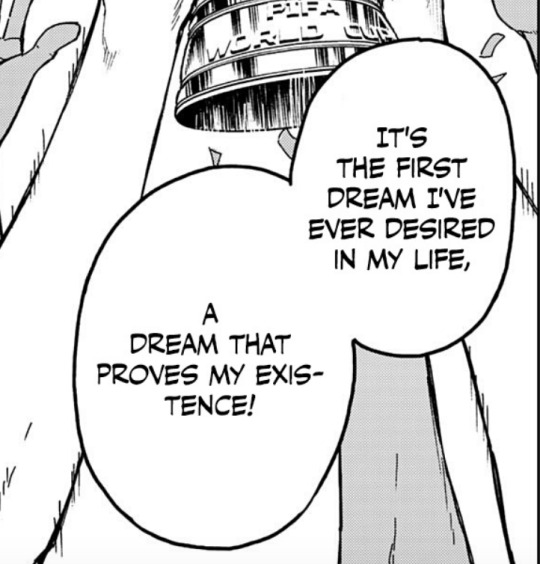
The wording, 'proves my existence' is interesting here. I think this is the first instance Reo has felt alive. So far, the only notable thing about him has been his family and his money. He hasn't achieved anything exceptional for himself, but now he has that opportunity. With this goal, he can really build something up from nothing and make it his own. It's almost like he's clinging to this dream to prove that he has some purpose in his life other than being the family heir.
Now, this dream changes when he meets Nagi, of course. I'm not gonna focus too much on their relationship in this section, but I will mention that meeting Nagi shifted Reo's entire dream, and not for the better. Through the narrative, his dream went from:
Winning the World Cup
Winning the World Cup with Nagi
Proving to Nagi that leaving him behind was a mistake
Improving himself and becoming a good striker on his own
Being a tool for Nagi to become the best striker
Had Nagi not come in and ask for Reo to come back to him, I think Reo could have done a great job at establishing his own sense of identity without Nagi. But no matter how much he works on himself, with Nagi in the picture, he's never going to value himself more than Nagi. Reo lets Nagi cloud his identity to the point where Isagi calls him out and asks what he's even doing at Blue Lock in the first place, since he clearly can't survive on his own, he needs Nagi with him.
After dealing with the turmoil of being abandoned by Nagi, Reo goes through a few stages. He starts with wanting to become somebody worthy of being beside Nagi, somebody that Nagi would want to choose. Devoting himself to becoming stronger and more versatile, his end goal is to have Nagi realize he made a mistake by leaving him behind. After a few more matches, Reo starts to realize that he needs to grow and change and become a stronger, better version of himself for himself and not for other people.
He decides that the fight was all his fault to begin with, that he should have never forced Nagi to play soccer and now he is going to get back to what his dream was originally, combined with his new desire to be a stand-alone player (and person, for that matter). Reo accepts the mistakes that he made, admits that he shouldn't have forced his ideals onto Nagi, and resolves to become a better person for HIMSELF. That's excellent!
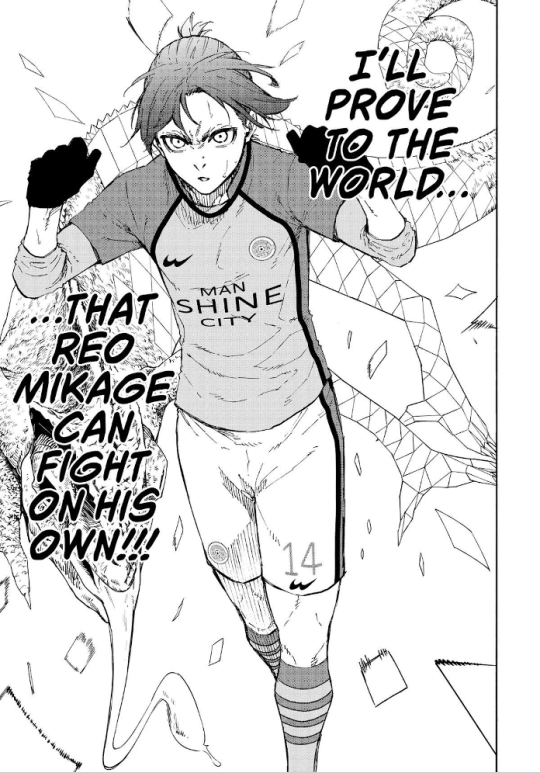
Of course, Reo can't be happy for TOO long. Nagi comes out of the woodwork saying that he can't beat Isagi on his own and asks for Reo's help. Reo does stand up for himself a bit, saying that Nagi is being inconsiderate of his feelings and mentioning how long it took for him to recover from Nagi leaving. Now, the BPD trait here is how Reo not only forgives Nagi and is jumping on him and hugging him THE NEXT PAGE, but he also just disregards everything he said in this sequence. In a matter of two minutes, he no longer wants to be a player that can fight on his own or improve for himself, he wants to improve for Nagi. He starts ruminating again about how hurt he was when Nagi left, but now he's saying all of it wasn't so that he could get stronger individually, it was so that he could be reunited with Nagi again. Nagi asking for his help and saying that now they can play together again motivate Reo more than anything we've seen so far. (Nagi notoriously throws Reo little affection crumbs like this that Reo eats up, but I'm not trying focus on that) Now, Reo's alright with being a tool for Nagi's success again. Everything that happened was supposed to make him stronger so he could be a better partner to Nagi, right? Reo also says as the chapter ends, to please let him be a part of Nagi's dream until Nagi becomes the world's best striker. That's literally so sad!
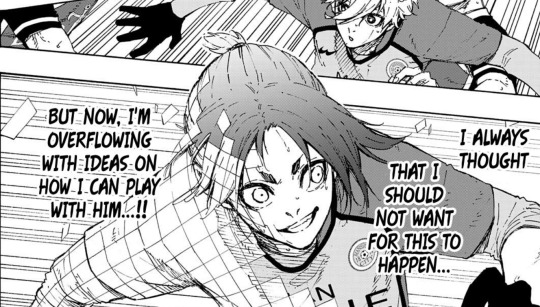

He's also immediately back to the 'our' 'we' 'us' talk as well. If he can master his chameleon style in order to keep Nagi above the rest of the players, he wont get left behind again. If he devotes his time and energy into being a solo striker like the rest of these guys, Reo knows that he wont be able to keep up. This was always supposed to be his role, right? Building Nagi up to his full potential! :*)
I also like the detail that Reo is back to hugging Nagi and holding him, but Nagi never really touches him back. I think Reo's love language is touch for sure, not that it's incredibly relevant, but I do think it shows that Reo is back to being 100% comfortable around Nagi as if their fight never happened. I hear a lot of fans asking how Reo could have forgiven Nagi so easily, and I say this with my entire chest, it's the BPD. The black-and-white thinking combined with Nagi being Reo's fp and the excruciating pain of being abandoned by him in the first place ?? Of course he's going to take him back. Also, I've seen people blame Reo for not saying no to Nagi when he asks for help and I have to say that is an absolutely insane take. How are we gonna look at a panel where Nagi asks for help and then blame Reo for helping him?? I'm not going to focus on it too much in this post but in my opinion, it is crazy how little accountability both the narrative + fans give Nagi. Reo is pegged as responsible for both of their downfalls and it's nuts tbh.
Currently in the story, I think Reo's identity is still centered around Nagi. It's really easy for borderlines to structure their entire lives and personalities around their favorite person, but I can only hope that these two keep having open and honest discussions with one another. Hopefully, Reo will eventually learn that he can exist without Nagi and that he's more than just 'his arms and legs'.
Unstable or Changing Relationships:
The most notable relationship in Reo's life is Nagi. They're both each other's first real friends, which already sets up a less-than-ideal dynamic. Nagi has no idea how to communicate and he has pretty weak emotional intelligence. On the other hand, Reo is great at communicating, but he isn't used to regulating his emotions. For a lot of borderlines, they can go a very long time without experiencing any symptoms when they don't have a favorite person. When you think about it, the bulk of the disorder is shown through those interactions with other people. If Reo has never had a real friend in his life, I don't think he'd be used to the emotional turmoil that comes with having a fp.
The minute Reo meets Nagi, he's attached. All his classmates notice it, too. They question why Reo is suddenly so obsessed with this random kid who has no interest in him. Reo is ignoring everybody that isnt Nagi.
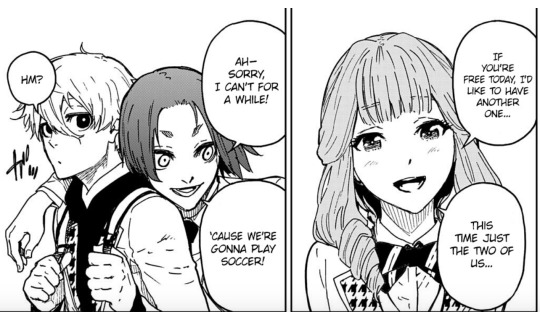
Very quickly, Reo boils down his view of the world to being him and Nagi versus everybody else, and he makes that very clear. It also depicts something that I think is incredibly crucial to Reo’s character that a lot of people overlook; as Nagi develops to be Reo’s favorite person, Reo’s dream isnt ‘playing soccer’ anymore. It’s Nagi. It’s being with Nagi, playing soccer with Nagi, being useful to Nagi, taking care of Nagi, and being somebody important to Nagi. He doesnt teach Nagi the rules or how to actually play, he teaches Nagi how to play with him. He literally re-writes and re-structures the game so that it can center around him and Nagi. Nagi calls him out on this in the spin-off manga:

Reo doesnt care about the structure of the game, he cares about Nagi. The other people on the field don't matter. The other team doesn't matter. He also starts to unknowingly put Nagi up on a pedestal, which is another borderline trait. He starts reiterating that Nagi is special, he's different from everybody else, he's destined to achieve great things. The more he raises Nagi up, the more he isolates the two of them in his mind, reiterating the idea that it's them against everybody else. His language reflects this too: Reo exclusively talks with 'us' 'we' 'our', insinuating that they're going to do everything together.

When Ego says that there can't be two winners, Reo says that he'll make Nagi the best striker. His 'ego' will be making Nagi successful. Along with putting Nagi on this pedestal, Reo also very early on establishes the fact that he'd pick Nagi over himself any day of the week. He's the only person in Blue Lock who really couldn't care less about becoming a striker himself: his dream is to be a tool in Nagi's success. Or, in simpler terms, he wants to be useful and make Nagi happy.
These two were in trouble from the very beginning. Nagi is lazy as all hell, has 0 motivation to do anything, and his dream is to live a life of luxury and never have to work. Reo, being the borderline baddie that he is, is more than happy to do EVERYTHING for Nagi. Borderlines love extremely hard! It's one of our best traits and I think it's important to showcase that Reo is a massive sweetheart at his core. He clearly loves Nagi a lot and goes to extreme lengths to make sure he feels taken care of. To someone with BPD, NOTHING is too big of an ask for a person they love, especially if that person is their fp. I also disagree with the argument that Reo 'made' Nagi codependent. Nagi likes being taken care of, he says it all the time. If you ask me, I would actually argue that Nagi takes advantage of Reo a little bit because he knows that Reo will do anything for him. But regardless, I think that Reo starts to develop an unspoken expectation with Nagi that he'll provide him with everything he needs, and in turn, Nagi will stick around. I don't think he's doing this intentionally, nor do I think it's being done in a manipulative way. I just think that Reo has a dormant fear of being abandoned that he doesn't totally know he has yet.
It isn't just Nagi that Reo showcases having unstable relationships with, though. Zantetsu is another good example. Reo starts out disliking Zantetsu, he snaps at him a couple times, and calls him a moron more than once. He starts to warm up to him because Nagi tells him to. The favorite person has MASSIVE sway in the borderline's life. If Nagi likes someone, Reo likes them too. (This is, of course, on the condition that they aren't a threat, looking at you Isagi).
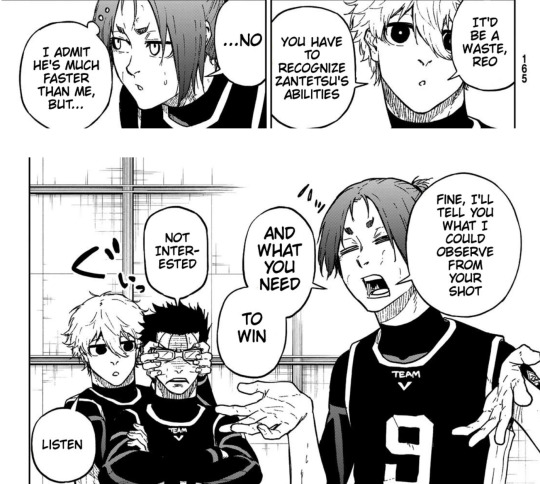
In the immediate next chapter, Reo is acting like they're all best friends. He's climbing on top of them in their big bed, saying that the three of them are gonna win their matches, being a little pookie. He goes from not liking this guy at all to considering him one of his close friends super fast. Also on the topic of Isagi, when they're making up the teams for the second selection, Nagi doesn't initially want to tell Reo that he wants Isagi on their team bc he's worried Reo will be upset. But, when he does finally say it, Reo is literally fine with it because like I said, who Nagi likes, Reo likes! On the condition that they don't replace Reo, which clearly happened soon after.
On the opposite side of the spectrum, Reo also shows how he can go from loving someone to despising him very quickly. After Chigiri and Kunigami tell him to get back up in the game post-Nagi's abandonment, we can literally see the switch flip in Reo's head:
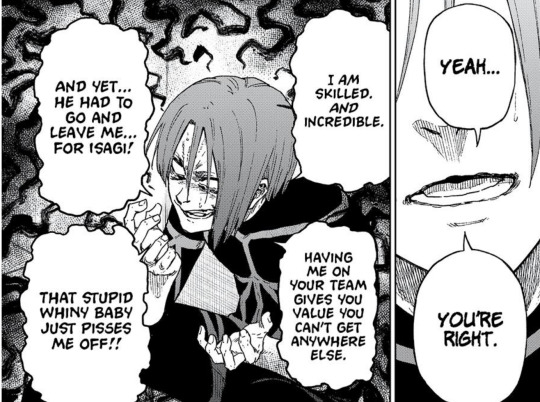
Suddenly, he hates Nagi. Nagi's a jerk who abandoned him; he never cared about him, and he threw him away. Dude literally says "Let's kill the bastards that betrayed us". This act of unintentional devaluing is called splitting. What Reo's essentially doing is going from one extreme to the other: if Nagi isn't his perfect treasure, he's the devil that broke his heart. There's no room for a grey area. The reasoning behind borderline's developing this black-and-white mindset is rooted in self-defense. If Reo devalues Nagi into being nothing more than a traitor, then he's stripping away the power that Nagi has to hurt him. If he looks at him like a rival or a villain, it's protecting him from being hurt by Nagi again.
That doesn't mean that he genuinely believes any of this, more so, he's trying to convince himself that it's true. We see that at his core, the reason he's acting like this is because he's hurt. I'll go more into it later on, but he's constantly thinking, what does Isagi have that I don't? What do I have to do in order to win Nagi back? This black-and-white thinking is an automatic self-defense mechanism that I think he's doing subconsciously. Regardless, the shifting he's doing here can cause a little whiplash, which brings me to:
Varied or random mood swings + Problems with anger, including frequent loss of temper or physical fights:
I can’t think of a better way to describe Reo's temperament than the wiki, so let me quote it: "Generally, he seems to feel every emotion with full force and is extremely aware of his own faults and shortcomings, which is evident in several instances of painful breakdowns shown in the spin-off manga. Due to his high emotionality, he can even get violent when he loses his temper."
Reo is characterized as being emotionally unstable. When he's happy, he's elated! When he's sad, he's miserable. There are a ton of scenes between the manga and spin-off manga that show how fast his emotions can flip, but this one was one of my personal favorites:
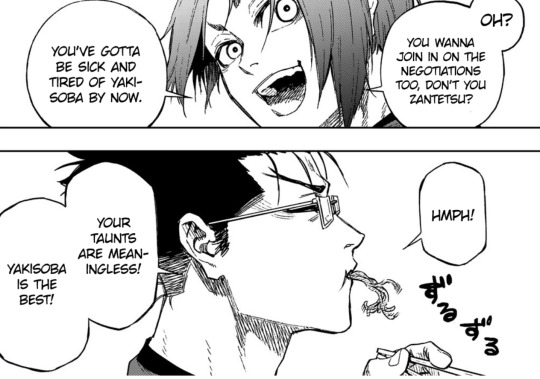

In this scene, Reo has developed a little scheme in the dining hall where the guys are trading their side dishes. At face value, a throwaway moment. But, I think it's worth looking at because not only does this show Reo's emotional response being triggered in an opposite, semi-extreme direction, but the root cause for the reaction was that he felt rejected by Zantetsu. In his own weird way, he's asking Zantetsu to come over and hang out with him. He's not being exceptionally clear with that message, but I can still pick up on it. "You wanna join in, don't you?" He's extending the invite, making himself vulnerable, and Zantetsu shoots him down by saying nah, I'm fine with my noodles. Reo JUMPS on him like YOU KNOW WHAT? I TOOK THAT PERSONALLY! lol. Jokes aside, I think this moment is a great one to argue Reo's BPD tendencies because it's such a seemingly mundane interaction. Even Zantetsu is surprised by Reo's random outburst. This also sets up the fact that one of Reo's most obvious triggers is being rejected/abandoned/betrayed, an extremely common one between those of us with BPD.
Other instances of Reo having a bad temper are a lot more obvious. In the match against teams V and Z, Reo straight up elbows Raichi in the throat, and then tries to go throw hands with Kuon for hurting Nagi. He only stops because if he gets into any more fights, he’ll get thrown out of the game and won't be able to play with Nagi anymore. He’s visibly pissed though and calls Team Z a joke. Hell, even Reo himself can recognize on a certain level that he can't control his emotions: they control him. They cloud his judgment and make him react in ways that he wish he didn't.

He is constantly plagued by these extreme emotional reactions that are out of his control. Not to say that people with BPD are unable to ever control their emotions, because we can! It takes time and therapy and practice though, which Reo hasn't had. His lack of regulation is also why he has such a dramatic and extreme meltdown when Nagi abandons him.
Fear of Abandonment:
Reo's biggest trigger and the cause of his inner turmoil throughout Blue Lock is his fear of abandonment. I mentioned before that I think he's had this fear dormant inside of him for a while as so many borderlines do, since he hasn't had the chance to experience it before. He alludes to it early on when they first arrive at Blue Lock:
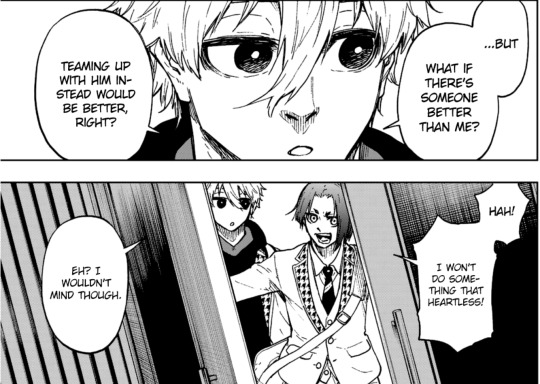
The thought of leaving Nagi for somebody else? Reo considers that heartless. They came together, after all. They're going to win the world cup together. Nagi could break both of his legs and Reo wouldn't leave him, because again, Reo isn't there to team up with the best player and become the best striker in the world: he's there to play with Nagi!! And, like I said, in Reo's mind it's him and Nagi vs everyone else-
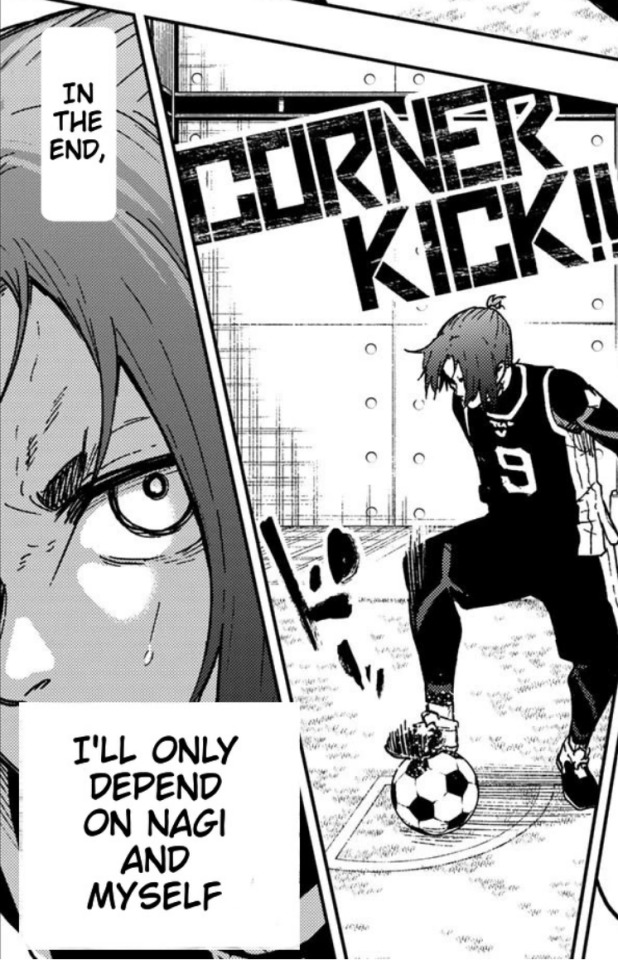
Reo exhibits a lot of signs early on of being jealous while they're playing in Blue Lock. I mean, as we discussed, everything should be focused around him and Nagi. When Nagi passes to Zantetsu in the team V and Y match, Reo pulls up like 'hey, why didn't you pass it to me?? ):' There are a lot of little moments like that, but Reo's jealousy is a lot more relevant to my argument after he gets abandoned by Nagi.
Let's talk about that word: abandoned. It seems dramatic, right? Reo uses that term constantly and exclusively. Every time he brings that moment up, he uses the word 'abandoned', or he'll say 'betrayed' or 'chose'. These are very definitive words. He’s not saying Nagi ditched him or flaked on him or blew him off, no; he has abandoned him. That word choice may seem disproportionate to the situation, but that's Reo's reality. This was the ultimate betrayal to him. The constant use of that vocabulary reiterates that in Reo's mind, there is no grey area. Either Nagi chooses him, or he chooses someone else. In choosing someone else, he abandons Reo. Reo is paranoid that Nagi isn't ever going to come back to him and it's because of something that Reo is lacking. How can Nagi like Isagi more than him, anyway?
Now, I do fault Nagi a bit for not communicating better at that moment. I understand that he's bad at communication, but I don't think Reo could have been more obviously upset if he tried. The dude was in TEARS. Nagi saw him devastated and then expected everything to be fine when he met him in the bathhouse? Idk. I'm going to give him the benefit of the doubt and say that he didn't realize it would upset Reo to such an extreme: maybe he thought that they would miss each other, but Reo wouldn't take it personally. I'm doing my best not to harp on Nagi since this is about Reo.
Abandonment is detrimental to people with BPD. It causes extreme inner turmoil that we see with Reo as the story progresses because it is the only thing he can think about. If he isn't trying to cover up his hurt feelings with this idea of revenge, he's self-destructing over being abandoned. He becomes obsessed with wondering why Nagi chose Isagi over him. Was there something wrong with him? Isagi isn't that impressive, why would Nagi rather be with him? These thoughts torture him endlessly and fuel his desire to 'steal' Nagi back. He literally says to Isagi, that he's going to steal Nagi back. Much to his dismay though, Reo starts to notice that Isagi is bringing out some positive traits in Nagi. Nagi's entire vibe is different with Isagi. Nagi is having fun playing soccer without Reo. In fact, he's having more fun. He's making plays he's never made before. His face is visibly different; he's more excited than before.
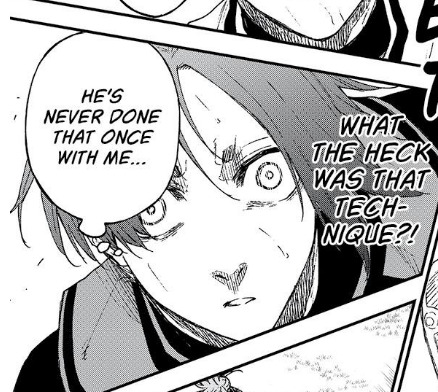
This is heartbreaking for Reo. Not only was he right that Isagi did have something to offer Nagi that he couldn't, but Reo is having a massive self-hate spiral during this point as well, so he's internalizing all of his flaws and mistakes while the thought is sitting in the back of his head: did Nagi actually have a good reason for abandoning me? Was I not enough to satisfy him? Did I only drag him down? This gets significantly worse the longer he watches Nagi and Isagi play:
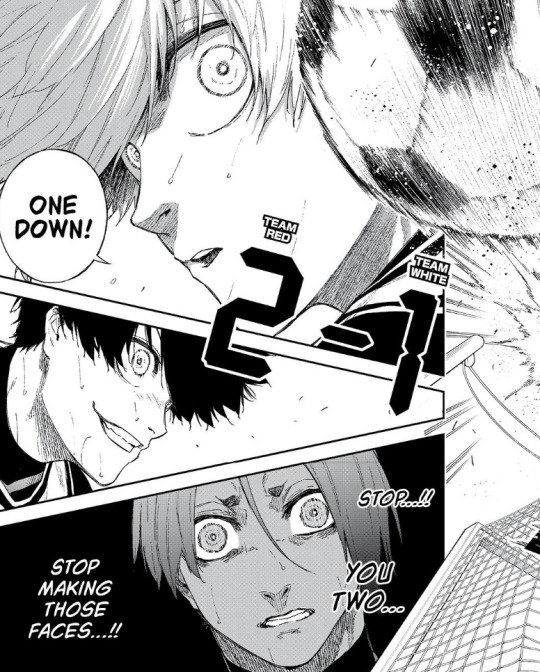
Everything is falling apart. Nagi is doing completely fine without Reo, and Reo is an absolute mess. We're circling back to Reo's lack of identity here as well. He's watching firsthand that he's losing Nagi to Isagi: what does he do? What happens to him if he loses Nagi, who is he without Nagi? He's overwhelmed during this match and at one point Reo literally screams that he's going to tear apart their connection. Jealousy is consuming him, but it's also those feelings of inferiority and wondering if he really did deserve to be abandoned. If Nagi is so happy without him, maybe he really did have a reason. These are the thoughts that are circling around in Reo's head. Not to mention, he is constantly tortured by the flashbacks of Nagi leaving him, which I think is a great detail. Some readers might say it's just pointless recapping but I disagree, I think it's depicting how traumatic that was for Reo. As a borderline, being abandoned by your fp IS traumatic. Reo relives that moment so many times because so many things trigger it for him throughout Blue Lock. He can't even look at Chigiri and Kunigami without thinking about him and Nagi. It's a really devastating experience that quickly deteriorates him emotionally.
Constant feelings of worthlessness or sadness + Suicidal behavior or self-injury:
One of my favorite things about Reo is the fact that he is self-aware that he's behaving somewhat irrationally, but he doesn't know how to stop. When we look at one of the several times that Reo is curled up crying over Nagi, he mentions how he really did want to tell Nagi to go and have fun, but he didn't. He couldn't. The visuals shift for this too:


Reo doesnt want to be acting this way, but he can't help it, and that's frustrating to him. It makes him start feeling ashamed of himself. His inner thoughts start to spiral and he feels weak and alone. He's reflecting here on what his true feelings really were at that moment, and how scared and lonely and weak he felt as a result of Nagi leaving him behind.
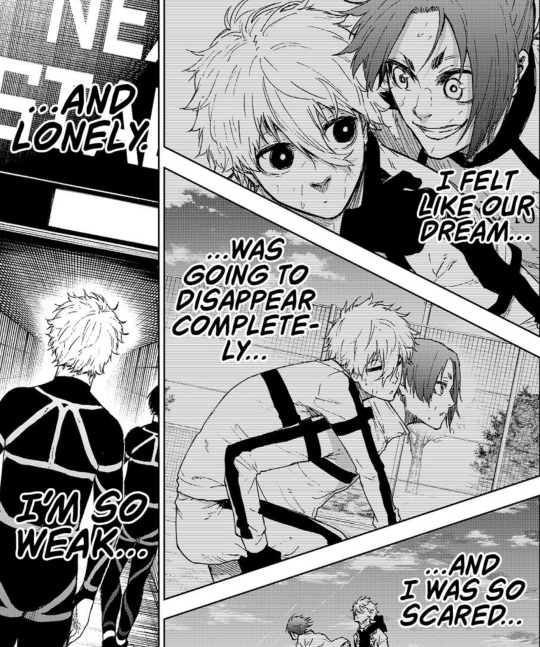
These feelings quickly evolve into Reo feeling worthless and falling into bouts of self-hatred. He's so ashamed of the way he's feeling and behaving but it feels so out of his control. He says, "maybe if I hadn't gone to Blue Lock in the first place, I wouldn't have to experience this feeling." As I said before, borderline's feel things EXTREMELY intensely; the disorder is described as living with third-degree burns all over your body. Everything hurts. His feelings are so intense and all-consuming right now, it's all he can think about:
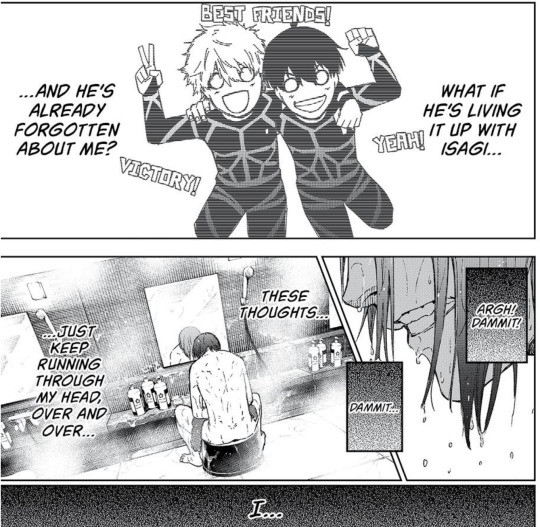

I saw some posts in the fandom reddit asking why Reo is acting like this. One in particular reads: "I get that he is betrayed and stuff but he is acting like it’s the end of the world, is it explained later why he acts like this? Is it because he doesn’t think he can win without Nagi?" Not to call this person out, I just want to answer the question in this post-
It has nothing to do with winning; it was never about winning. It was always about Nagi.
If we're looking at Reo through the borderline lens, it IS the end of the world for him. Nagi was his world. What's worse, he's fully aware that he's not acting rationally and he doesn't know why, which is making him feel ashamed and weak and embarrassed. Now I know why he's acting like this, but there are no Blue Lock psychiatrists sitting around to wack him with the mood stabilizers or the DBT handbook, so he's gonna stay feeling like a monster.
He lets these thoughts, along with the resentment and anger from being abandoned in the first place, fuel him for the second selection match. As he's watching the game play out, as Nagi is about to score the winning goal, Reo's mind starts racing with intrusive, negative thoughts.
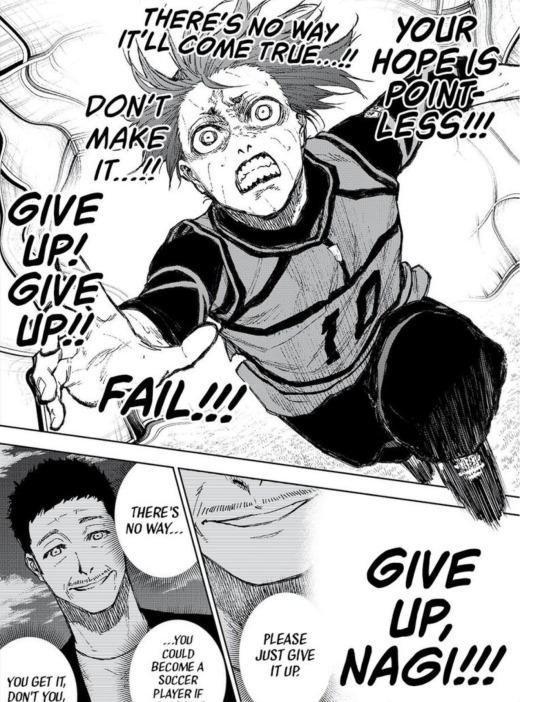
He's praying that Nagi fails, that he gives up, that he stops trying, anything to stop that solidifying moment where he scores the winning goal and proves once and for all that not only was Reo not strong enough to stop him, but Nagi doesn't need him anymore. He catches himself really quickly, because he realizes he's sounding just like his parents. Everything is spinning out of control so bad, Reo wants Nagi to end up in a vulnerable position so that he isn't the only one falling apart. As he catches himself thinking this, he's disgusted with himself. He calls himself 'utter trash', and as he watches Nagi score the winning goal, he falls to his knees, wishing he was dead.

As he sits there decomposing in emotional turmoil and suicidal ideation, Nagi's team chooses Chigiri to join them, and it's the nail in the coffin. This is probably Reo's lowest point in the entire story IMO. Nagi comes up to compliment him on his plays and Reo shows us another classic borderline move: he's anticipating how bad it's going to hurt to be abandoned by Nagi again, so he's trying to push him away before it can happen. We see the dichotomy of his spoken words and inner thoughts here, where he's talking big game to Nagi, saying things like 'you clearly don't care about me anymore, you're throwing me away, if you're going to abandon me just do it properly', while internally he's thinking 'I'm the worst, I wish I was dead, please take this bait and break my heart so that I can self destruct in peace'.
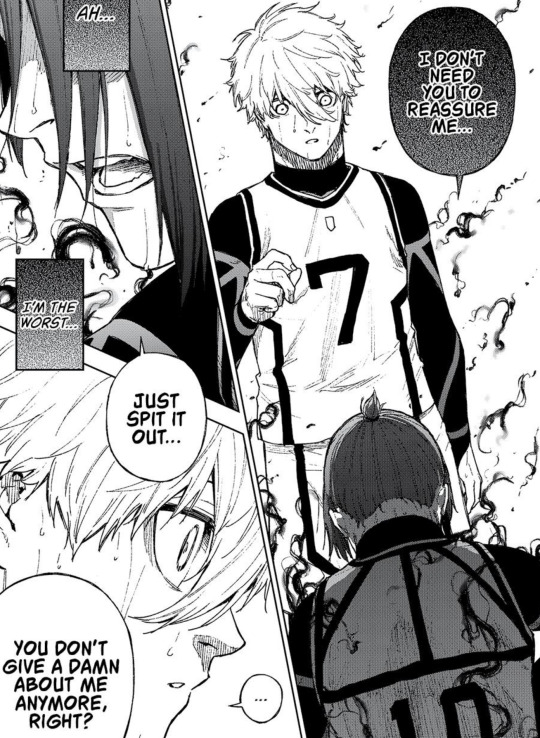
i LOVE the visuals during this moment. This is what Reo thinks is his last line of defense, the last thing he can do to preserve any part of his dignity is to make Nagi hate him so that he'll stop throwing these crumbs of affection at him. It's also really telling that despite his switch in behavior and the devaluing of Nagi, the root of all of that is STILL that he was so hurt by the abandonment.

I don't think I need to analyze the suicidal ideation because he just straight up says he wants to die like three times in this scene but, aside from that, the visual of his inner thoughts vs what he's actually saying is so powerful. Not to mention the chameleon imagery which i'll geek out about in a second, this is another example of his black and white thinking along with the reiteration that being abandoned was literally traumatic for Reo: he says they can never go back to what they were before. Speaking as a borderline, this is painfully true. When people break my trust even in a small way, I can never view them the same as I used to. I can forgive them and let it go, but I'll never be as open with them as I once was. In Reo's shoes, he had Nagi up on this pedestal that he was perfect and would never do anything to hurt him, but he did hurt him (in the worst way possible).

After Nagi tells him he's a pain in the ass and that he doesn't care anymore, Reo thanks him for 'finishing him off'. In his mind, they're done now and he can suffer in peace and quiet without dragging Nagi down anymore.
Bonus Point: The Chameleon Effect
I LOVE THE FACT THAT HIS THING IS CHAMELEONS AHHHH
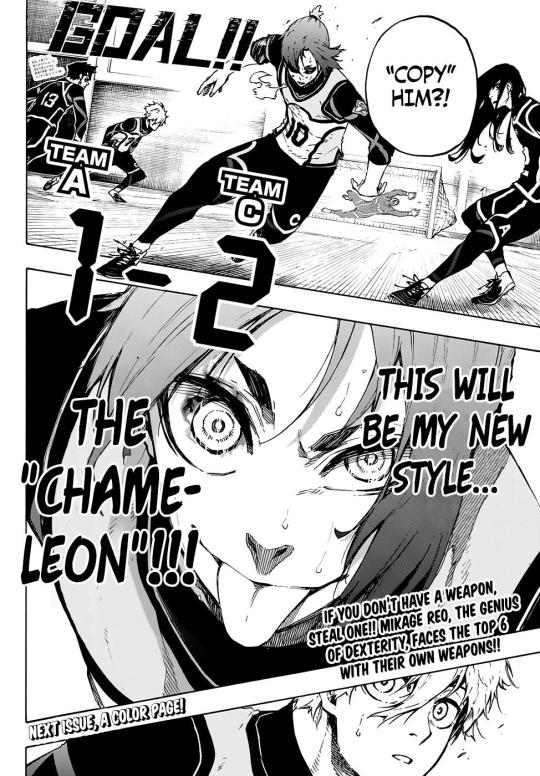
The chameleon imagery with Reo makes me INSANE dude. As I mentioned towards the beginning of this post, a part of borderline that is seldom talked about is the tendency to take on 'the chameleon effect', or mirror the people around them. REO'S ENTIRE THING IS CHAMELEONS LIKE BFFR ?? That image where he was trying to get Nagi to hate him, was before he even started using his chameleon style, it was just something the authors thought was necessary to include during Reo's mental breakdown. Aside from the cool imagery, his chameleon style is a reflection of his relationship with Nagi. He gets called a jack of all trades and a master of none early on in reference to how when he’s without Nagi, hes not really exceptional at anything. He never really took the time to master one specific thing because he was always so concerned with helping Nagi. This rings my BPD bell for a couple reasons: first of all, when you have no sense of identity and you’re worried it means you have no real personality ?? Steal one!! Take the closest person to you and copy that one. That’s something us baddies know VERY well. Also, think there’s something about you that your fp doesn’t like? Change it! You can morph into anything they want as long as it means they won’t leave you !! :*) Before he makes up with Nagi, he copies moves in hopes that it'll make him stronger and appear more desirable to Nagi. After they make up, he copies whoever he has to so that he can get Nagi to that goal and make himself useful, make himself somebody that Nagi wants to have around. It is a literal direct metaphor for him changing anything and everything about himself for Nagi and graaaahhhh it’s so cool
Reonagi ?? Some thoughts-
I want to close this yap session with my thoughts on Reonagi as a ship. I do think that they can work and I want to make that clear. I'm not on board with the 'borderlines arent capable of having loving and fulfilling relationships' crap. That being said, they both have to put in a bit of effort. Reo has already recognized a lot of his own issues. He admits that he was wrong for pushing his ideals onto Nagi, that he needs to let Nagi grow and be his own person, etc. Nagi really hasn't accepted any fault. I stand by the fact that Nagi needs to be more sensitive with Reo. Way too often when a relationship like this fails, all the blame is put on the one with borderline. I'm gonna be the outlier here and say that if Nagi cares about Reo, he needs to learn about Reo's triggers and be mindful of them. I'm not saying that since Reo is sensitive to abandonment that Nagi should just isolate himself from everybody else, but what I am saying is that when he's going to do something that doesn't involve Reo, he needs to learn how to communicate that he still loves and values Reo. "I'm gonna go play soccer with this person right now, but I haven't forgotten about our promise. When I come back, we can play together. I still love you and I'm not going to leave you for whoever tf I'm playing with rn." (sneaking that 'i love you' in bc like..they're literally canon at this point asdfghjkll) But, I do think that Nagi loves Reo and cares about him in his own way. The two of them just have to keep working on their communication skills. Nagi has the potential to have a hot rich husband who will literally bend over backward for him and buy him all the robux he could ever want, he's gotta put in a shred of effort!
I also like to think that Nagi didn’t totally get the fact that Reo doesn’t gaf about just playing soccer. Nagi thinks soccer is what they do together, it’s what makes reo happy, right? He’s always pushing him to train harder and take the game more seriously because he likes the sport, RIGHT? It would make perfect sense to go play with isagi so that he can get better at soccer and come back to reo a more improved player. Maybe that’s why he was surprised when Reo was so mad in the bathhouse, bc he wasn’t making the connection that Reo cares more about him than soccer. That Reo puts all that energy into him playing soccer because he thinks it’s something that they can have as their own, and once Nagi notices how good he is, he’ll start enjoying it and the two of them can hold hands and run around the soccer pitch!! I think Nagi missed that part tbh, and I don’t think he know that even now in the story. Maybe Reo doesn’t even notice it.
Anyway, a shameless plug to my reonagi playlist if that's your thing (i cooked with this one, i fear) https://open.spotify.com/playlist/5CsvSqmuI4cxOl1nTaV4GJ?si=737a0f21e0bd482a
Closing Thoughts:
Reo is a bpd baddie and I love him very much. I think he's a sensitive guy with a lot of feelings who would benefit from taking time to work through his trauma and his emotions. I hope that he eventually is able to build an identity for himself that doesn't involve Nagi, but baby steps, I suppose. I think Reo is a great balance of positive and negative borderline traits and he reads as a really believable and sympathetic character. He is, however, definitely that friend that you have to slap to stop them from running back to their ex.
Jokes aside though, BPD can be extremely hard to live with, even more so when it's undiagnosed and untreated. If someone you love has BPD, take the time to read up on it and do your best to understand them. I promise you, it will mean the world to them.
If you managed to get this far, thank you for reading! This was a messy stream of consciousness and I appreciate your support by listening.
120 notes
·
View notes
Text
The Emperor, The Ending, and that IGN Article
Note: This analysis was originally written and posted on the Larian forums for Baldur's Gate 3. You can find the original forum post here. This analysis includes a number of outside links to other posts I made on the Larian forums as well as the IGN article I'm referencing through out. If you choose to read the original forum post, I have a number of responses through out the thread. You'll recognize which responses are mine because I use the same name on the forums as I do here - LittleMonday.
This analysis first looks at the ending choices in the game, then transitions into a character analysis of The Emperor. Approximately 3,800 words. Lots of spoilers.
Let me first start out by saying that I love this game. It would be entirely unfair to say that this game is anything less than a triumph. The level of skill that goes into a collaborative process such as the making of a video game with a rich story, compelling characters, complex morality, beautiful animation, and an immersive environment is something that should not be hand-waved away. I’ve enjoyed hundreds of hours playing this game. Having said all of that, here’s (yet another) post of “we need to talk about the ending.”
If you’re unfamiliar with the recent-ish IGN interview with game director Swen Vincke and lead writers Adam Smith and Chrystal Ding, you can find it here. I’ll be focusing on their section of the interview concerning The Emperor and the end game choices.
LOTS AND LOTS OF SPOILERS AHEAD.
Let’s talk about the critical decision of siding with Orpheus or The Emperor.
I know a lot of people have pointed out that The Emperor joining the Netherbrain in the end if you side with Orpheus makes no sense, and I think it both does and doesn’t. He has always wanted freedom, and it’s almost certain that the moment he leaves the astral prism without Orpheus’ protection, he’ll be enthralled whether he’s willing or not. The explanation given in the article by Swen and Adam, as well as The Emperor in game, as “survival” feels like a 180 when his ultimate goal has been freedom. Why they chose not to focus on the fact that it’s game over for him as far as his autonomy under this circumstance is puzzling. Which brings me to my next point.
One of my biggest problems with the ending is how contrived the choices are. Along with The Emperor’s 180 mentioned above, Swen and Adam (Chrystal doesn’t say much) seem to have rigidly held on to this plot contrivance of choosing to become a monster, and in doing so, forces a binary ending whether it works within the narrative and gameplay or not.
Swen - “One of the basic questions of the game was whether you would become a monster if it would save the world. So that’s where you get that in that moment. And then the interesting bit was, well, if you’re not going to do it, are you going to ask someone else to do it, or [are] you just going to say, ‘F*ck everybody?’ That’s essentially what that moment was.”
Adam - “There was no way to save the city, save the world without giving up your own identity.”
The thing about a binary choice is that it only works if there truly are no other options available, however, the player has a lot more power and leverage in this situation than the game is willing to let them have. The Emperor wants his freedom and will be enthralled voluntarily or otherwise if he leaves the astral prism and cedes power to Orpheus. It’s also worth mentioning that when you help him defeat the Honour Guard, there’s an option to ask him about assimilating Orpheus, to which he answers that it may not work. So, assimilating is a big risk, and should it fail, he’s back to being a thrall.
Then there’s Orpheus. He cannot leave the astral prism without the players freeing him with the Orphic Hammer and cannot take on the Netherbrain unless he or someone else turns into an illithid. The player has leverage against The Emperor to persuade and/or intimidate him to join with Orpheus, and they also have leverage against Orpheus for the same thing. The whole speech Orpheus gives about how the player should have let his Honour Guard kill them and they would have taken on the Elder Brain before it evolved and became a Netherbrain is either a lie or delusion. You don’t even need to metagame to know this, yet the player has zero dialogue available to call Orpheus on this claim. He and his Honour Guard have been imprisoned in the astral prism for millennia with no means of escape, and no way of impacting the outside world. They weren’t going to stop anything, and yet, through the dialogue choices, the game treats this as though it were a given and that The Emperor held all the cards and kept this from you. He didn’t. He truly is the reason you’re alive to face the Netherbrain. Given the gravity of being on the cusp of The Grand Design, calling Orpheus on the impotence of him and his Honour Guard, and also potentially being under threat of having his brain consumed if he does not cooperate, there is plenty to leverage against Orpheus to get him to at least temporarily ally with the player and The Emperor. If you’ve struck a deal with Voss, you have even more leverage.
Beyond the other options that I believe should be available, I don’t think becoming a monster or “f*ck everybody” comes through in the ending at all. It seems like they expect players to side with Orpheus when there are plenty of role play reasons to side with The Emperor, and then no one has to become a monster, and you still save the city. The Githyanki aren’t even doomed under this ending just like they’re not doomed if Orpheus transforms and dies in the end so he doesn’t live as a mind flayer. If anything, the theme of freedom, autonomy, and alliances, I thought, came through more strongly, both with defeating the Netherbrain and with the companion quests. Under this theme, an option to persuade/intimidate Orpheus and The Emperor to work together actually makes more sense because they have to put aside their hatred for one another to accomplish the same goal of defeating the Netherbrain and obtaining their freedom. The intention seems to have been for the player to make a significant personal sacrifice to save the world, but I just don’t think that it was executed particularly well.
I think this is a good time to say that authorial intent should never be the end of one’s analysis of a text. If an author/director/writer/artist/creator tells you what their intention was, it doesn’t mean the text supports that. We don’t always execute something we create the way we intended to.
And that brings me to the next thing I want to discuss.
Let’s talk about The Emperor as a character.
I want to start out by saying that The Emperor is my favorite character. I enjoy a compelling and nuanced monster that subverts our expectations, and I think The Emperor provides a lot of that while also not living up to his full potential. I’ve already written a post on this forum regarding why I think we need to have a fully fleshed-out romance for The Emperor that you can read here. I’ll be focusing on his writing for this. I wrote at length about what I enjoy about the character in another thread on this forum, that you can find here, but I’ll include a quote:
“What’s unique about The Emperor is how he subverts our expectations. Yes, he’s manipulative, but he never mind controls you. He’s this supposedly asexual creature, yet he’s sexually interested in the player character and is heavily coded as a romantic male lead. He’s also supposed to be this heartless and soulless creature, but expresses care for the player character, and if you romance him, he’s sweet, vulnerable, and sincere. He’s supposed to be part of this hive mind, yet he wants his freedom and actively encourages the player character to form alliances to defeat the Netherbrain. He needs to feed off the brains of others, but avoids the innocent. He may want the player character to change into an illithid, but he leaves that choice entirely to you. He’s alien, yet very human and desires allies and companionship.”
I was under the impression from this interview that Swen largely sees The Emperor as a plot device, while the writers saw him as a character, even if he has a specific purpose in the narrative. There’s even a very awkward part of the interview in which Adam refers to The Emperor as “he,” quickly corrects himself to refer to him as “they,” only for Swen to insist that The Emperor is an “it,” even saying that “we often had this fight” when referring to his pronouns. I personally think that’s a bit revealing, though you may disagree.
For additional context, Swen, Adam, and Chrystal all agree that The Emperor is manipulative and self-serving, but that he never lies to you. Swen will later reiterate this very point when talking about Raphael:
Swen - “Raphael… a lot of what he says you can’t trust, but he is honest. And at one point, if you push him on it, he says, ‘All you are to The Emperor is a pack animal that’s carrying him to where he needs to be.’”
There’s another awkward exchange in which Adam speaks to The Emperor being terrified of going back to the Elder Brain. Swen then remarks:
Swen - “he’s not really terrified he doesn’t have that level of emotion.”
Adam - “Well, yeah, but I think that there’s a level of horror in being… Going back to what he escaped from.”
Now with all of that context laid out, I think his manipulative nature is pretty uncontroversial in the game’s text. He is self-serving - he doesn’t really hide that from you - he speaks in partial truths, and you are a means to an end. At least at first. And, this is where I think he becomes a more complex character whether Swen realizes it or not.
As a side note on how he manipulates the player: there’s this strange bit of dialogue with The Emperor in which you can call him on the fact that he’s hidden information from you throughout your entire alliance, and he responds by acknowledging that, saying that he purposefully lead you to believe that the githyanki Honour Guard were evil beings. I don’t recall this at all. He tells you that they would have killed you because to them you are already illithid, which is all true. It’s a strange bit of dialogue in the end that doesn’t follow what’s been established in the game.
That aside, I’ve heard many people hand-wave away all of his behavior as insincere and solely for the purpose of manipulating the player, however, I think that’s, at best, a shallow reading of the text. He may be manipulating the player character, but that’s hardly the only thing going on, where a character like Raphael is truly only manipulating the player character. In the interview, Swen, Chrystal, and Adam all say that he doesn’t lie, however, I think a more precise way of saying that based on what we see in the game, is that he doesn’t fabricate lies. He doesn’t make up a lie out of whole cloth, but rather omits information that he doesn’t think is relevant, or that doesn’t serve his purpose. Perhaps the most infamous example of this is his relationship with Belynne. As long as you remain on good terms with The Emperor, he frames their relationship as two allies working towards a common goal in The Knights of The Shield. However, if you become hostile, provoke, and dehumanize him, he reveals that Belynne was his unwilling thrall.
I’m hardly the first to point out that this cutscene is a bit suspicious. The timing of such a reveal and The Emperor framing it as “why hide” or “will this make you feel better” is an obvious threat to someone who seems likely to betray you the moment they can. The cutscene also has The Emperor casually revealing his identity to someone other than Belynne, much to this unnamed person’s horror. That is already out of line with how he conducts himself. After her death, we can have this interesting conversation with The Emperor in which he further discusses his relationship with her. With hindsight, it’s obvious that when he says their relationship “was not love” it was “deeper,” and that it was “unique,” he is referring to when she was his thrall. But, he also reveals in some dialogue options that she understood his needs, his desire for freedom, and that she didn’t trust a mind flayer at first, suggesting that she wasn’t initially his thrall. He even describes himself as being “haunted” by memories of her. We don’t know exactly what memories are haunting him, but we do know that the dialogue option with the thrall cutscene, he says to the pc “aren’t you glad I finessed my methods?” Even when he calls you his puppet, at no point in the game will he enthrall you or your party members.
It’s worth mentioning that it is well within DnD lore that mind flayers grow attached to their thralls and mourn their passing, but we later find documents in the game, one from a physician, that when The Emperor came to visit Belynne as her condition progressed, that it eased her “body and mind.” We also find a document suggesting that he was impersonating her through magic as one eye witness account described a floating blue figure, but that it turned out to just be Belynne smiling. I bring all this up because what I believe we’re seeing here is an incomplete portrait of their relationship. I think it suggests that they were once genuine allies before he enthralled her, and that he’s mourning more than just her passing, but also the deterioration of their relationship. I think this also helps to explain why he never enthralls the pc, even if it would mean preventing them from taking some very dangerous paths that jeopardize their mission. The Emperor is an unreliable narrator who speaks in partial truths, so I don’t believe that either version of their relationship you get from him is the whole truth, but is not entirely false either. This game very often takes a more-than-meets-the-eye approach to characters and storylines, so this is well within what we have come to expect from this game. She may have been a means to an end on some level, but she was hardly only a means to an end.
As far as that strange comment from Swen that The Emperor “does not have that level of emotion,” we actually feel his fear regarding the Elder Brain as it’s breaking free from the crown’s control. If the pc romances him, we literally feel that he cares for the pc, and in some interactions of this scene he’ll tell the pc that he enjoys their mind, and refers to their relationship as a bond of love. Before the final battle, one of the NPCs invokes Balduran’s name right before battle, and if you’ve allied with The Emperor, you feel his amusement that they have no idea who he once was. There’s even that scene with the Guardian at the beginning of Act 2 in which a successful insight check reveals that he is hiding the depth of his pain. I know there’s that note that The Emperor left for Ansur about no longer feeling his feelings, but he clearly does feel. He even describes the grief he feels over Belynne as “not entirely unwelcome.” The Emperor is an arrogant and prideful character, and he doesn’t seem to be entirely self aware as to his own humanity because he sees himself, as a mind flayer, to be superior.
For most endings, The Emperor will just depart after defeating the Netherbrain, much like the other companions who also go their separate ways. So, I don’t think this is necessarily an indication that the pc was merely a means to an end. However, (big spoilers here) there are two endings in which he does reveal his feelings for the pc. In a solo ending in which the pc doesn’t transform, he’ll tell them “you have become… important to me. And should our paths cross again, I will be glad to see you.” There’s also an ending where, if the pc transforms into an illithid, he will ask to stay together to rebuild the Knights of the Shield. There’s an option to tell him to think bigger, at which point he’ll say to them “Have I ever told you how much I enjoy you? Lead the way…”
I also want to note that right before the above mentioned exchange with The Emperor, the Narrator has a line that in being a mind flayer, all your companions become tools or food, but then contrasts that with:
“Perhaps you are unique among illithid-kind. Perhaps you will retain enough of who you are to resist your nature. A rogue mind flayer. Like The Emperor.”
This is a pretty straightforward acknowledgement that The Emperor does have the capacity for relationships beyond mere tools for his use.
All this is to say that there seems to be some genuine relationship building with The Emperor, which makes it, in some ways, more strange that he’s so quick to abandon the player and join the Netherbrain should you choose to free Orpheus. Many players have noted that trust is one way with The Emperor, and if that’s the angle Swen and the writers were going with him, then why have The Emperor demonstrate trust in the pc’s leadership? Yes, there are moments in the game in which he admonishes the pc, disagrees with them, attempts to persuade them away from a decision, hell even probes their mind if they lie to him about the meeting with Raphael, but he’s actually very reasonable when it comes to the pc’s autonomy and decision making. If you save the Grove, he’ll even compliment you on your leadership. He’s so hands off in so many ways, but when he does interject about certain quests like the Crèche, Ansur, or The House of Hope, those are extraordinarily dangerous quests that risk everything. They risk you, him, and anyone left behind to be subjected to the Grand Design, but he never stops you. He actually does demonstrate a lot of trust in the pc even if they’re not the most reliable at times.
I said earlier that I think the intended ending was to have the player join with Orpheus, then the pc, or one of the companions turns into an illithid. This requires a sacrifice and sets up this dramatic encounter with The Emperor in which he rides in on a red dragon and summons your dream guardians to fight you. This could have been a powerful moment, however, I think it largely falls flat when you have this forced binary decision with a character, who may be unlikable, but is actually pretty reasonable throughout. If you’ve romanced The Emperor, or are at least on friendly terms, this binary ignores the prior relationship development of the pc being more than a means to an end by not at least allowing for some kind of exchange and option for striking an alliance.
But, let’s just say you have romanced The Emperor, but the twist is that you are merely a means to an end. Well, that’s not clearly laid out either. There’s no moment to confront him, and the only acknowledgment of an intimate relationship comes when he castigates the pc and reminds them that they didn’t “reject” him, but “enjoyed” him. (If anything, that implies you used him). He just leaves and that's that. Along with everything I laid out earlier, it’s not so much a twist, as it’s incomplete writing. This isn’t even the only example of incomplete writing. Remember how your companions were able to witness your night with The Emperor but no one said anything the next morning? The so-called fix was to have The Emperor wipe their memories without any regard for the implications. The pc doesn’t have a dialogue option regarding such an action, and the only vague textual clue that this is something he does is that he may have done some memory manipulation with Belynne’s doctor. However, the doctor can still recall a lot of details of The Emperor’s visits, she just has trouble recalling his appearance. He either doesn’t or can’t completely erase her memory of his visits, even though she finds him suspicious and erasing her memory entirely might be safer for him to do. Other than that, it’s just the one line he speaks that was thrown into the game a couple of patches in. Even then the companions still don’t react to the “enjoyed me” line, or the “fornicated with a mind flayer” line if you side with Orpheus. We love hearing our companions react, so why not have that in there? It would certainly be more entertaining at the very least.
Whether these inconsistencies come down to creative differences between Swen and the two lead writers is speculation. No one was in the writing room with any of them, but this interview was, nonetheless, enlightening in some respects. I do hope that at some point The Emperor can be a fully realized character, and one that’s in line with the depth he is given in the game. And I would hope that would go along with additional ending choices that better reflect the narrative that comes before that crucial decision. A binary choice like the one we currently have doesn’t work for many playthroughs, even if it may work for some. I would like to see that someday reflected in our final choices.
Lastly, while I’ve laid out a fair amount of criticism in this post, my intention was not to cynically nitpick every inconsistency. I even deleted some things I originally planned on including here, because I realized that not all plot contrivances actually weaken the story. I want to repeat that I still love this game, and when I say it’s a triumph, I do sincerely mean that. I know all too often fans may request changes to the game or characters as a sort of wish fulfillment, but those changes would ultimately end up undermining the narrative or themes. I’ve tried my best to avoid that here, and I hope I have.
#baldur's gate 3#bg3#the emperor#the emperor bg3#media criticism#media analysis#spoilers#baldurs gate 3
93 notes
·
View notes
Text
What's up with MK?
[a theory crafted thru pure over analysis and attachment to minor characters/scenes]
{thank you to @trix-with-wifi-access for listening to my rants and assisting in my insanity}
spoilers for Lego Monkie Kid, s5 trailer not directly included tho.
If any of this is unintelligible, blame the fact it's like 6am and I'm only writing all of this outta a sudden burst of motivation.
I don't think MK is okay
Yeah, stating obvious aren't I? Well, I don't mean mentally. Ofc he's not mentally okay. I mean physically (or magically at this point tbh)
I think there's something Wrong with whatever MK is. But b4 I dive too deep into that, let's set up some bases.
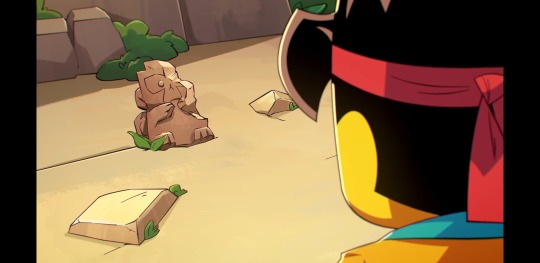
MK's monkie statue. We all know that's his. He showed to Pigsy's doorstep covered in clay, which considering Nüwa, this statue is 100% made of.
The thing I wish to point out is that it's broken. Nearly in half. Something went wrong here.
We know we can't trust a word outta Subohdi's mouth, considering that not only does he claim MK's statue was remade from the fragments of Wukong's egg (which was made of stone, not clay) and even says himself that he doesn't know what's up with MK.
Anyway. As you likely recall, right after all of this, The Ink Curse throws Subohdi out of the way and appears directly to MK.
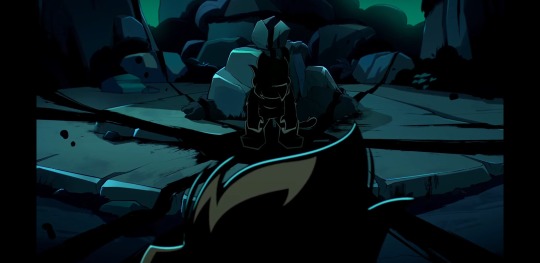
The little statue disappears, and the curse emerges from an ink puddle stemming partly from the rock.
And it appears looking like Monkie!MK.
The Curse (fuck it I'm tired of typing that. This is why we have fan names—) Mozhi doesn't appear like this to anyone else, other than manifesting as past Wukong to mock him alone. Wukong, also a monkie.
but it only does that after it's been directly provoked and attacked. MK didn't do anything, and Mozhi still appeared. In a mockery of what he truly is.
Mozhi appears in the form of an animal. In the form of everything MK's denying. It switches back and forth between "we" and "you". I also wish to mention MK's slip up with "we help people"
For some reason, Mozhi feels the need to directly confront MK, to the point of even attacking him with his own powers (and... Well I'll save that for another post actually).
Why?
Why did Mozhi decide that MK being in denial of what he is was so bad it needed to appear and beat the truth into him?
"This is your fate, your friends will turn on you, seeing you for the monster you will become. They will destroy you, Harbinger Of Chaos"
"Then prove us wrong."
is it just me, or did this seem like a last minute Warning? To be careful of what you will become, or you will be destroyed by your own friends?
Prove us wrong. Us. MK believes it. MK believes that his friends will inevitably turn on him. He doesn't just need to prove Mozhi wrong. He has to prove himself wrong.
Harbinger Of Chaos. We're all so tired of hearing that title, aren't we? Everyone in fandom talks about it non-stop. But I have seen very few mention something rather important.
Chaos is yin. The darkness with the speck of light.
and of course, yin cannot exist without yang.
Chaos cannot exist without Order.
I think that's what happened to the statue. Chaos lost it's Order, dark lost it's light, and now everything is eternally doomed. Unless said Order is found of course, but I'll get into that eventually.
What would the power of chaos do to make up for the lack of order? Well, it'd try to find something to fill the void. To fix that broken half. Anything will do, it just needs more power. It's too weak, it cannot survive like this. Without order.
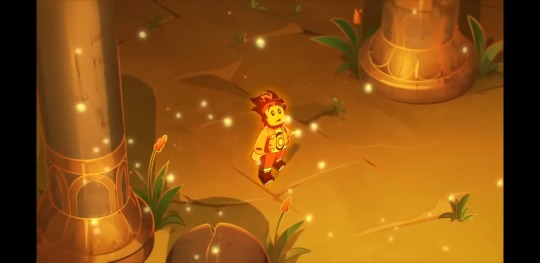
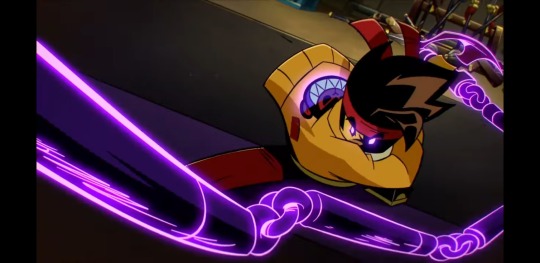
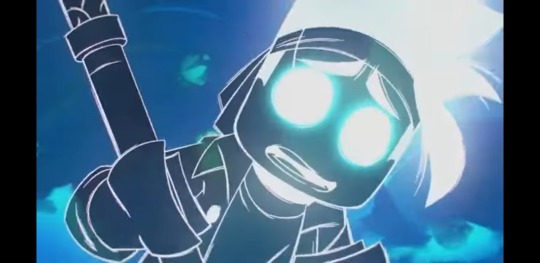
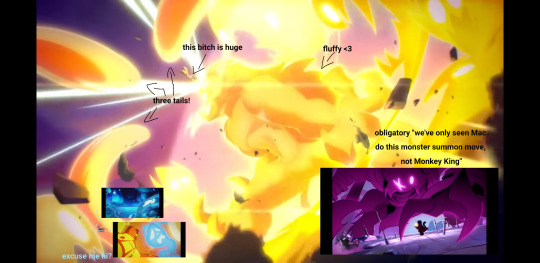
... I'll just say it. I'm 99% sure MK's actual Mystic Monkie Power™ is Mimicking. The desperate attempt of chaos to fix what's broken without the necessary tools.
Would make thematic sense too. Chaos is unpredictable, Clay is easy to mold, etc etc.
But what does this really have to do with anything? Well, let's tie all those orange threads together, hm?
MK is not as strong as Wukong or even Macaque, two of the other 4 Mystic Monkies. Oh he's certainly strong (need I remind you of what he did to Azure) but simply not as undyingly OP as the SundialDuo/ShadowPeach.
He's weakened by whatever happened to his statue. Whatever ripped Order from Chaos.
MK's clay statue is broken almost in half, and he's only approximately half as strong as he really should be.
I think MK is only one half of a Mystic Monkie that was supposed to truly embody Yin/Yang. Something happened, and the statue that was supposed to become that monkie was broken.
MK winds up with most of what he needs to survive and stay stable (as shown by his statue being about 60% intact) but he's not as strong as he should be, and is left scrambling for anything that can give him even a scrap of the power he's supposed to have.
What happened to the other half? What happened to Order? Well, that leads into another theory... But let's just say I have my suspicions involving a barely-a-character that I got too attached to.
after all, what's more orderly than memories?
Ignoring that, focusing back on MK. My prediction for s5 is him finding out about this from Nüwa. After all, my theory is that she broke the statue.
... Ah, forgot to mention that. Allow me to elaborate.
I think Nüwa was genuinely excited to create something new. Something powerful. A Mystic Monkie! Finally!
But why was she allowed to do this? Because there was one less Mystic Monkie. With Macaque dead for who even knows how long, there was a long time where there were only 3 of the original 4 Mystic Monkies.
Nüwa took this opportunity and ran with it, getting permission from whoever to create a replacement, since Mac didn't seem to be coming back.
But come back he did! And having 5 Mystic Monkies running around would be such a pain to keep track of, especially considering what happened with Wukong!
So, Nüwa was either commanded to break the statue, or did it herself. Destroy what she had created so that nothing like Wukong would ever happen again
Oh but how attached she got, to a little statue not even brought to life yet. So much potential. So much power. Made of the same Clay she carefully crafted her original, precious humans out of. She always loved to create, but was never allowed to bring what she made to life again.
... Well, this time they only said not to have another Mystic Monkie running around... Nobody said she couldn't bend the rules a bit.
With that, the statue was broken. Her precious clay, her yin, her little Chaos. She put him with the humans. They'd take good care of another clay like them! She doesn't even remember what she did with yang, the Order, the—... the other half. She was too focused on watching her precious Chaos.
Even going down to the mortal realm herself, to keep a closer eye on him. She was there when the sky broke, when Chaos went too far, so she'll be there to assist. To tell her perfect Clay where her stones are, so that he can fix this mess, just as she had years ago.
Five stones.
Four monkies, one half.
—·–-–·—
TL;DR
MK is only one half of a Mystic Monkie (clay, chaos, yin) bc Nüwa's an overly attached idiot and Mac died so this all technically Wukong's fault lmao.
#lego monkie kid#lmk#monkie kid#lmk mk#lmk qi xiaotian#lmk nuwa#nuwa lmk#qi xiaotian#qi xiaotian lmk#mk lmk#mk the monkie kid#ink mk lmk#sun wukong lmk#lmk monkey king#monkey king lmk#lmk Macaque#Macaque lmk#lmk six eared macaque#six eared macaque lmk#sun wukong#six eared macaque#lmk theory#lmk spoilers
64 notes
·
View notes
Text
The Definitive Damsel Analysis (if I do say so myself)
(Disclaimer: I know it’s absurdly long, and for that I apologize. I apparently am more unwilling to make cuts than I am to present subpar work. I’m working on it. Only editing I do for my autistic ramblings is copyediting, baby! Whoo! I will be updating this for the Pristine Cut once it comes out and we get even *more* Damsel. Obviously, as I’m sure you can tell from the length, I really like Damsel. There will be all of the bias. It will be great.)
(Author’s Note: For the love of the most high God, it took me like twenty read throughs for me to standardize what I wanted to call the Scorched Grey. Here is a brief list of all the terms I used to refer to her: Scorched Grey, Burned Grey, Burning Grey, Fire Grey, Damsel Chapter 3. Sometimes but not always preceded by “the” or “The”.)
Alright, ladies and gentlemen. I have oft made the statement on here that Damsel is the best route in the game, and this began as me trying to definitively prove that, by microscopically going through the route, I could establish exactly why, it would seem, that Damsel has objective superiority. It sorta… evolved, though, so instead I will be going relatively chronologically throughout, and trying to point out a couple things that all of you know about and maybe a couple things you don’t about the best character in the game. With that preamble out of the way, let’s begin with the goofy stuff, the grab bag if you will.
This will certainly be more personal taste than anything else, but I do think there’s a lot of miscellaneous stuff that Damsel does better than the other chapters. For example, I am convinced that it has the third best music, behind Tower and her routes and then Thorn. I am genuinely obsessed with “It Was Always That Easy”. The basement has some *fantastic* art, and I think that really carries a chapter that is otherwise generally bland when it comes to actual visual activity. It’s really carried by its genuinely perfect dialogue.
Overall, and most importantly, this chapter is the undisputed master of the idea of positive ambience. You know elevator music? How it’s there to artificially increase the cheeriness of an otherwise dreary moment, like a hotel hallway or, yanno, an elevator? Well, this is the chapter that does it perfectly. Everything is designed to make it “nicer” than it actually is. The Narrator even takes that into account when describing the basement. The sound design is fresh and relaxing, the music is uplifting, the Princess’s voice is obviously fantastically done, but also the Voice of the Smitten plays a large role in making it feel “good”. It’s something that exists in order to communicate exactly the feelings it wants the player to feel, which is all warm and fuzzy inside. But let’s move on to the actual content, shall we?
Damsel has *the* best Chapter One and it isn’t even close. Certainly not in the horror department, where I think Beast and Nightmare shine, or even in the whole characterization bit, where the award can only go to Spectre and the masterclass that is her Chapter One. But Damsel has something else to it. Damsel has tragedy, almost Shakespearean in nature. Nobody else has it (except Witch, to some extent, but nowhere close to the same level), nobody manages to reach that connection, there and then broken, to honestly feel for both Princess and Slayer. Allow me to paint a picture of a playthrough.
You are on a path in the woods. At the end of that path is a cabin. In the basement of that cabin is a princess. You are here to slay her. But you don’t do that. That voice itching in the back of your skull, the one you quite literally call Hero, your moral compass even, raises some objections. You don’t want to kill *anybody*. That isn’t something you want to mark yourself with, especially not solely on the word of an individual you just met. For now, violence is a nonstarter.
You enter the cabin. And you hear her voice. And you see her. You even talk with her for a while. The moment is… hypnotizing. Despite the Narrator’s warning of manipulation, well, you cannot help but be manipulated. This is a genuinely nice, sweet, scared Princess who simply wants to be free. You have to save her. It is the right thing to do, it is the… only thing to do. Anything else marks you with the dirtiness of simply being unwilling to help someone in need when you had the full ability to.
You go to get a key. Unsuccessful. The door locks. Even worse. The Narrator is moving from irritating to downright malicious, clearly enjoying recounting the lock of the door. Disgust for Him has been present since you entered the cabin, but it shifts to anger very quickly. That shift continues with full force as you attempt with what little ability you have to save the Princess, even if you don’t quite know how you will get out. The question does not last long. For the shift to anger shifts once more, to a sort of incomprehensible fury.
For the Narrator has crossed a line. Not only has he taken away any semblance of choice, not only has he raised your own knife against an innocent, someone who has been nothing but kind to you, but you are the one who must bear the shame for it. You are the only one who is doing the foul deed in any eyes but your own. Speaking of, the Princess’s eyes are filled with genuine happiness at the moment, as you are finally giving her the freedom she has yearned for such a long time. Yet through no fault of your own, you raise the pristine blade, the one you refused to bring down to the basement in the first place. You scramble through the list of options, attempting to find anything that could provide a sliver of hope in the situation, anything without the grim finality of “Slay the Princess”.
At last, you find one, and are able to bark out a warning to the Princess. That happiness in her eyes is shifted to a look of fear, one directed at you alone, one condemning you with such a sorrowful betrayal that it almost hurts to see. She begs for you to stop, and then she says something that almost calms the internal storm of the player: “Please, I know this isn’t you.” She recognizes that it isn’t us that betrayed her, she understands that we aren’t trying to do this, that we are flat-out trying to stop it. But the eye of that storm is passing, and soon.
And as she takes the blade, as she prepares to do what she must to live, that same look of tragic betrayal crosses her eyes, this time not directed at us, but at herself. She hates that this is her only option, the only way that she can live is to kill another, one with every intention of freeing her and no intention of harming her. And in the end, she simultaneously underscores the tragedy of the moment while confirming our perception that she could never be a threat to the world. As she plunges the blade into our chest, she has failed to even do the bare minimum of making our death painless, something that fills her with even more guilt, tears streaming down her cheeks as she tries and fails to end our own agony. The last thing we see of her are her endless cascade of both tears and apologies, as everything goes dark.
This… is beautiful. A glorious tragedy, one with limited theming, simply two characters with emotions that feel natural. And, quite strangely, the first chapter has almost nothing to do with the second chapter. But it is still important. I’ll get to that later. Better things await now! For with the end of the tale of the Hero and the Princess, we have a new individual, everyone’s favorite buddy, the Voice of the Smitten.
I am certain I do not need to underscore just how popular Smitten is. Easily the most fan favorite of the fan favorites, especially solidifying his place within that roster with the Kiss from a Thorn. He is jovial, passionate, he is Don Quixote, complete with the unlimited self-delusion that comes with the territory. There’s a reason people love him. Romantic in a game entitled a love story, the largest of personalities in a game stuffed with them, he is the storybook hero come to life in a game that has just as much reverence for storybook heroes as the deconstructions of them. In short, he is the visage of likability itself, with all the bombast that comes with that. Yet that is only from a wholly external perspective.
For what I am certain I do need to underscore is just how sinister Smitten is. For all of his likability, the Smitten is also probably the single slimiest voice out of all of them with the possible exception of the Opportunist. This is not a new revelation – people have understood that since the beginning with his frankly disturbing behavior regarding the Princess. What is perhaps more interesting is his relationship with the player. For he is one of the two options that reflect the player at this point within the story. Either the player is trying to do the right thing and free an innocent, or they have somewhat… different motivations.
The former reflects the Hero. Somewhat naive, in many routes somewhat bumbling even, but first and foremost focused on the external. That is, “how can I make a positive impact on the world around me?” As contradictory as it may seem to how the Hero is presented, it’s something of an intellectualist approach. The Hero is trying to find the best possible world and working towards that with all of his might. It is, one could say, devoid of emotion except that determination to change the world, to make it a better place. While the goal remains the same, the path to get there is fundamentally continuously being calculated. The Hero is your conscience, and as such he must *always* work overtime for that.
The Smitten is not that. No, he has made no secret that he is the path of passion. Even when he is generally considered to be a better person, he declares that, “Whatever world would condemn two star-crossed lovers to a cycle of violence and despair isn’t a world worth saving.” His focus is internal, it is on ourself and our romance. There is no extensive study into what is the correct option, there is only what would assist in our relationship, which is somehow ordained by the universe. To put it into understandable terms, Hero is a modern hero while Smitten is a Romantic-era hero.
There’s an important line when going down the stairs that I think speaks volumes about the type of player and playthrough currently occurring. That is “We can still do right by her without all this over-the-top fawning.” *That* is the line of demarcation between the route of the Hero and the route of the Smitten. If you decide to embrace or repudiate the Smitten at that point, I think the route is sealed. I am convinced that the game will continue on in a fixed way based on that philosophy. The point where you must, internally that is, decide if you are doing this out of a desire for what is right, or an infatuation with the Princess.
Now, of course there isn’t anything wrong with taking the path of the Smitten, and it’s personally one of my top points in the game, but whether you admit it or not, you are long past morality being what decides your actions. That has come and gone. Now, the goal is to express the passion of the moment and delve into your romantic relationship with the Princess. I’ll be evaluating each of the routes differently, loosely organized with a focus on how it reacts to the player. After that, I’ll go on into theming of each route one by one and all that jazz.
The path of the Smitten first. The player embraces that he has been sent to save the Princess from her unjust and foul imprisonment above all else. So that is what he does. He marches downstairs, the blade being nothing but a passing afterthought as it is immediately dismissed out of hand. When it comes to the crucial point of “doing right by her”, the justification is made that two things can be done at once, that you can do this for her and do a little bit of fawning on the way. Doesn’t harm anyone.
And with that the basement arrives, and you see the Princess on the floor. She is perfect in all ways. There is nothing wrong with her. And that’s before you start talking to her. When you do begin talking to her, all of the kindness and innocence from Chapter 1 are magnified to the greatest degree possible. She can do no wrong. And, from a meta standpoint, there’s another thing that stands out – it is really, *really* funny. From everything the Smitten says to the “Then I didn’t end the world!” to the Narrator’s (a villain at this point) growing exasperation at your trust for the Princess, it endears you to the moment even more.
Because it’s not only that it’s funny. It’s not only that the Princess is genuinely nice to you. It’s something more than that. Something that I am loath to talk about but will anyway. The Princess is incredibly – *sigh* – **cute** within this chapter. This is objective, with science to back me up, I’m sure. But she is specifically designed to be as heartwarming as possible, and every line makes her more and more into someone who should be saved by you, into, well, a Damsel. While it isn’t explicitly stated, throughout the progression of dialogue, the need to protect her becomes more pronounced. You were already primed to like the Princess, you already internally committed to a romantic future. But after stepping into the bear trap willingly, you cannot escape.
And if you’re anything like me, you are perfectly fine with that. So you take in the moment, you rescue her from her chains and laugh at the way her hands slipped out of the chains and the Narrator’s comical anger at it. It’s all very feel-good, all cleanly written dialogue, and both the Princess and the Smitten are likable, they’re fun, and the Narrator is a fun enough villain for the Smitten and you to unite against. The Hero, if we’re being honest, barely registers, and if he does it’s usually as an extension to the Narrator, as a foil to yourself. And with her finally free, she embraces you, sealing the deal on her perfection.
And after that, something else happens. The deconstruction begins. You want to see if her dialogue has any more of that saccharine present throughout the rest of the chapter, and are immediately rewarded with the “The princess closes her eyes in deep reflection” and the follow up joke. Hungry for more, you click through some more of the dialogue, but something begins to happen. She begins to… unwind. The Smitten seems to reciprocate in turn, to a lesser extent. In fact, she really starts to return to the horror that this chapter was a nice respite from. So you cut your losses, decide to leave with her, and everything returns to normal. Bathed in the glow of your future, you immediately forget about the deconstruction.
After that, you finally get out of the basement, get a genuinely great moment opening the door alongside the Princess, never think twice about clicking “You’re not doing that.” as fast as humanly possible, and finally await the door at the end of the cabin. You finally get your fairytale ending. The princess goes out into the world together with you. You brought her out. And then she is taken by the Shifting Mound in a way reminiscent of her dying. Even if this wasn’t your first playthrough, it still comes as a shock. For the most part, you were being that Romantic hero, living in the moment with your passion. The thought of this happening was gone entirely. This wasn’t supposed to happen. And it *hurts*. And the chapter is over.
The route of the Hero has a different point of view on the whole situation. That’s not to say it’s not easy to get drawn in by the hilarious dialogue and sheer cuteness of the Princess – far from it. It is, after all, what drives the conflict within this. For the Hero, and the player that goes along his path, has one bit of information stand out. That the world ended after the Princess killed you. Now, you can naturally be skeptical of the information, but the Princess isn’t helping her case here. Entirely vague, entirely unwilling to mention anything about it. The only thing she seems to care about is getting on your good side.
Now, you still want to save her. That much is clear. You still don’t take the knife in the beginning, and you saw her Chapter 1 incarnation. She is still a good person, kind and loving. But there are questions raised, important questions. Which is why not all Hero routers get the same ending. There is a conflict between how far you’re able to go before the risk of the world ending eclipses your distrust of the Narrator and your trust of the Princess. If the whole world really does end if she’s free, is it worth it? And as such you get to the major points of the Hero ending.
The first is the Deconstructed ending. As you question the Princess, you desperately try to figure out what the best way to go forward is for you. And that starts with getting a straight answer from the Princess on what exactly she plans on doing. The operation… does not go well. As you try and push for anything, any sign that she isn’t going to end the world, the same rejoinder comes in, alongside a distorted track. “I just want to make you happy.” The Princess is not an individual anymore, and begins to change shape. But you are locked in with a horrified inability to look away, like one who sees a car accident. And with that, the Princess is a Princess no longer, and the Shifting Mound takes her away.
There’s also the option of taking the Hero’s advice when confronted with the scenario: to leave. You don’t like what’s going on and you try to do whatever you can to undo the doing. Perhaps surprisingly, it works. And then you’re forced to deal with the cognitive dissonance of the Princess and *that* being the same individual. But you, not without a healthy dose of skepticism, still head upstairs alongside the Princess. In the end, you can’t bring yourself to kill her. Throughout it all, she still has been the beautifully endearing picture of innocence, if a questionable one, and especially with regards to the knife on the table, there is no way you can take it to her chest with no warning, especially after everything you did in the first Chapter. So you leave with her, and the “end of the world” really does come in one fell swoop with the call of the Shifting Mound. You can’t help but wonder if the decision you made was the right one, not really. Like, you still believe she didn’t deserve to die, but maybe, just maybe, it would have been a better ending.
So what if you did kill her? What happens when love *truly* melts away into skepticism. After the continuous question dodging and whatever the… other thing was, this is clearly not an ordinary Princess, it is not the same Princess that you tried to save at the beginning. There is only a sliver of her, a shadow of her former self. Slaying her, well, slaying her is probably doing her a favor. It might be doing the world a favor, too. Maybe she is an individual with malicious intent. And as you take the blade and plunge it into her chest, you instantly know you made the wrong decision. She does not oppose it. She simply lets you kill her with a single tear hanging in her eye, saying “I think this is what you want.” It’s meant to feel dirty and it does, even heartbreaking in the moment, although it is immediately counterbalanced by the effect of the Smitten killing you over it.
I won’t exactly go over Scorched Grey the same way, I think there’s generally only two frames of mind going into it, and that’s either the standard “Hero-Skeptic” framework that I’ll expand on later, or simply a completionist mindset. Plus, it’s technically not The Damsel. Plus I’m lazy. But this is the point where I will try to expand on the theming of each and every route and mindset to go through within the Chapter, and that *will* include the Scorched Grey theming.
It’s made quite clear from the chapter that one of the primary themes is objectification, the making of the Princess into nothing more than a vehicle to live one’s fantasy into. The taking of an individual and making them into an it. The destruction of humanity by your own desire, and what that says about your desires in the first place. Ironically, this is merely one fourth wall away from the rest of the Princesses, each of them being a piece of fiction that many simply engage with *because* they are an object, but with the Damsel it is directly nodded to within the narrative. One meta-layer is peeled back, if you will.
Nothing hammers this more home than the entirely jarring line that escapes the Shifting Mound’s lips when you ask about the vessel she holds. Unlike the rest of the fragments, which are all given an indication that they have been fulfilled after the Shifting Mound takes them, the only note she has to say is that the Damsel has “served her purpose”. There is nothing that she wished for, as anyone who has obtained the deconstructed ending can attest to. But even in the more standard runs, she is simply a tool to be used and discarded. And there are three general reactions to this line.
The first is the hardcore Smitten route’s preferred choice, denial. “The Princess was far more than an object, she had character, she had kindness, she had motivations from the beginning! The narrative is what is wrong, there’s nothing wrong with the Princess. She. Is. Perfect. Not just from a narrative standpoint but a metanarrative one as well. She has depth, she *is* a character.” All in the hopes that if they insist on it enough, it will become true. The Damsel was not designed to be viewed in a vacuum. There are themes that run through her character, and including negative ones, and the denial of them is a far truer denial of the character than any sort of objectification could ever be.
Then the more moderate Smitten routers get a different response. A slap in the face. They did all of this, they had fun, they laughed with her, they cried when she was taken. They were connected to her, they had a real connection to what she was. One could even accuse them of… loving her. They honest to goodness cared about this Princess, they were invested in her story. Yet, in the end, they also formed her around themselves. They “molded her to love you”. As much as they loved the Princess, that was only because they cut out a piece of the Shifting Mound that they *could* love, a caricature of her true nature. They still took an individual, and despite truly loving her, made her into something that she was not so they could do that very thing. She is not a person. She is a plot device, an individual made to love and be loved with nothing beyond that. She is an object.
Lastly, those who went on the route of the Hero get that same slap in the face, that selfsame bucket of water poured over their heads, but in a different way. They didn’t try to objectify her. They didn’t want anything of the sort. All they wanted to do was the right thing. Right? Yet even in that desire to do the right thing, they still get that same chilling text from the Shifting Mound. They have built an individual just like those who went on the route of the Smitten. Just a different one. Not one who was built around your “glorious romance”, but rather one built around something of a glorious Romance. The need to be a Hero. The desire to do what was right, to save an unjustly imprisoned Princess. The Princess became a plot device in the end anyway, just one that needed to be saved rather than one who needed to be loved.
I want to continue off of that. The player is trying to do nothing more than the right thing, he is simply doing what a Hero should. And that determination to do what is right leads to him getting impacted the most by that line in the ending, the line that implies that whatever right he was doing, he was still being driven by selfishness, by that need to be a Hero. That hits the player right within where it hurts, it almost could be said to strike at the one emotional vulnerability of them. To have your hard work, your pain, your desire for what is right to be considered nothing more than the delusions of a Don Quixote tilting at windmills in order to fight giants, just as lost as Smitten, that doesn’t feel too great. It almost minimizes your struggle, and it is genius. You play as a Hero because you want to feel like a Hero, not because the morality of this world means anything to you. It is stripping that meta-layer down one by one.
But objectification is not the only theme present. While it may seem like something of a potpourri topic to throw in, earlier on the server we were talking about the Damsel in particular’s perceptiveness with regards to perception. When the door shuts and locks, it is the first and only time the Princess gets visibly **negative** in any way during the entirety of the Chapter. Even when you kill her, she still does so with nary a frown on her face. Even as a tear rolls down her cheek, she still smiles. But not at the door. The narration points out quite clearly that she frowns. This is, I reiterate, the only thing that happens. And her response is not “we’re stuck down here”, it is not “I’m unable to leave now”.
What it is happens to be “that’s not supposed to happen”. She recognizes the construct in a way very few allude to within the game. Adding onto that note, within the Scorched Grey chapter, she (correctly) determines the very nature of the construct and that inherent “cycle of violence and despair” inherent to it, even (correctly) determining that the only way to leave was to annihilate that very construct. This is shown even clearer at the other major event at the door. When you ask if the Princess can open the door, the sole question she throws back at you is “Do you think I can?”, and after a response in the affirmative, “Then I can”. In the end, it is quite clear that she is, *heavily* ironically, one of the more aware characters in the game with regards to your circumstance.
While speaking of the Scorched Grey, I think this route also exemplifies another major theme – the nature of the Princess as a being of perception. All routes exemplify one facet of the Shifting Mound: Spectre represents the gravity of her, Tower her divinity, Prisoner the very incarnation in and of itself of her within the construct, and so on. Damsel has something different, though, and that is that she’s just a slippery little fella. Far more than anybody else, Damsel changes throughout her chapters, in ways more pronounced than anybody else. The Shifting Mound declares that we “molded her to love you”, as I quoted previously. That molding takes stage front and center throughout all of our interactions with her.
The most obvious example is her deconstruction, which when her sole true motivation (to leave) is discarded, she begins to break down, unable to offer to the player anything beyond the only desire every other Princess has. With the compulsive need to love the player, etched into her core, there is nothing she can do other than try to add to that love, losing herself within the process. But that is not the only time she changes. Because she is willing to give up that freedom in, well, a heartbeat. Attempting to kill her does not lead to any sort of resistance from her. The one goal she had, staying alive and winning her freedom, is out the window despite being (questionably) willing to kill for it in the last chapter. Now, throughout the Scorched Grey, it’s made clear that she did not, in fact, want to die, that she just wanted to be free together, but the complete unwillingness to save her own life is a stark contrast to the first chapter.
In fact, that perpetually changing nature alongside her being so objectified means that it’s really, *really* hard to figure out her true character. There is very little in her that does not change and very little remaining that isn’t specifically put there by you. She is an eel, wriggling out of your grasp and impossible to pin down, in a large way like the Shifting Mound herself. But… for the most part, there are two facets to her character beyond the already listed themes. And a sharp divide between them.
Chapter One Damsel and Chapter Two Damsel are not the same person. That’s usually true for most of them, but they also usually have some semblance of similarity between their counterparts. The only exceptions I can think off the top of my head are Spectre and *maaybe* Stranger if you want to count that. The rest of them act as exaggerated versions of the existing individuals shown. Chapter One Adversary likes fights. Chapter Two Adversary likes fights. Chapter One Witch is built on the back of distrust. Chapter Two Witch is built on the back of distrust. Everything lines up nicely.
That is not the case for the Damsel. The only thing that you can say with both of them is that they are nice and do not want to hurt you. The Chapter One incarnation (henceforth Princess) is a tragedy of a character that doesn’t want to kill you but still must to secure her own life and freedom against a renegade puppeting you. The Chapter Two incarnation (henceforth Damsel) is a Horror-”Feel-Good”-Comedic-Tragic character that shows nothing about the emotional anguish she went through in chapter one. I love both of them, but they have an unmatched disconnect. And I think that sort of adds to the character. Now, there is absolutely a benefit from an emotional through-line (there’s a reason Thorn is my second-favorite chapter), but in this case, only brief touches to the beginning enhance the story.
The most striking thing is the sense of comedic horror that comes when Damsel just completely ignores any expected trauma from the Princess’s emotional destruction. It, depending on the route you take, either makes you love her character more and more as the humor begins to entrap you, or it begins the process of getting the player unnerved, exactly like the developers wanted. It is a key dividing point in the mindset of the player and the route that they have chosen. The Damsel says nothing about what happened, heck, she barely acknowledges it except to indicate that “You died!”
Secondly, it sets up Damsel as a sympathetic figure while still allowing her to begin establishing herself. Without the setup from the Princess, the player has no idea how to view Damsel, potentially even seeing her as a less on-the-nose Razor, with her comedically hiding her sinister intentions. The Princess allows the player to begin on a note that the Princess is *actually* friendly rather than simply pretending to be so. At the same time, it’s divorced enough that apart from that frame of reference at the beginning, Damsel is still allowed to shine within her own character.
Lastly, and most importantly, it sets her up for the Scorched Grey. The guilt at causing the death of an innocent and the belief that you would be unable to cause the death of an innocent yourself leads her to blame the construct and attempt to bring it down, which seals your fate in the third Damsel chapter, the only time where the two chapters meet in a beautiful climax of Passion going too far and causing pain, in attempt of running away from that very thing, morphing into something that not even the Smitten is able to remain devoted to in an awful tragedy of love being not enough in the end.
Wait, wait, wait. Did I hear “the end” being spoken? At this time of year? Localized entirely within this essay? Well then, it’s time to talk about what puts this saga at pure perfection, shall we? I probably could just use the awesome power of Ctrl + V to get the desired effect, but I still do want to offer my narration, so I’ll compromise and do a bit of both. “Your lover drives a stake into your body. And another. And another. And another. And another. Do I miss your heart because I cannot stand to see it go? But the stakes meant nothing to you. You had a desire, and you set that desire free, you lifting me and me lifting you, forever and ever and ever, consumed by true belief, there was nothing that could hold us back.”
Do I even need to explain why that’s so good? Definitively the best poem in the end, it isn’t even close, especially when coupled with Ms. Goodnight’s awe-inspiring delivery. Did I say that the Scorched Grey was the perfect synthesis of the Princess and the Damsel? I was lying. This is. Every word so lovingly placed, the language sounds like it comes from the pen of God Himself. It is emotionally resonant, the art is beautiful, I have not run into such a short piece of dialogue that outdoes it. Gonna be honest, mostly just wrote up this essay to gush about it. Even now, it is considered by most everyone to be one of the best lines of dialogue in a game filled with magnificent ones.
And the other one, that of the Scorched Grey. It’s simpler, ironically. “I kill you. You kill me. Back and forth we go, faster and faster and faster. I kill you. You kill me. Hollow eyes watch from the dry corners of a memory. A home built on all of the futures that were supposed to be, preserved until the moment of reunion. The fire of the heart sets it all ablaze. I kill you and me.”
This, this right here is one of the most slept on ending poems and it’s not even funny. So fantastic at expressing the heartbreak inherent to the Scorched Grey’s character. I don’t know how you can see the line “A home built on all the futures that were supposed to be”, especially with the Scorched Grey dead and charring in a wedding gown, and not feel *something*. It’s not as good as the standard Damsel stuff, but then again, nothing is. It’s still deserving of more praise than it currently receives, and one of my top three ending poems of all time, only edged out by Prisoner. Gosh, this game belongs in a museum.
Seems I need to debunk some stuff that happens to get a lot of traction regarding those who speculate on Damsel, too. First of all, her character motivation is not guilt nor gratitude. That sort of thing works incredibly well in fanworks, and I’m happy to see it ~~because that means I get to see Damsel in a fanwork~~. It has little to no backing within canon. Damsel is a chapter about the only motivations for the Princess being those put in place by the objectification of the player. There is nothing regarding anything beyond that, and it detracts from the existing, well-elucidated themes that are actually within the chapter. The only sort of substance to them is both Chapter 1 Princess and Scorched Grey indicating guilt for killing you, but that is almost entirely repudiated within the actual Chapter 2.
Speaking of the Scorched Grey, another thing I saw somewhat extensively is that you somehow “taught her” that killing is the way to love one another, and that’s why she kills you in Chapter 3, and I honestly do not know how that gained any traction at all. It’s pretty clear that she views all the death as a pretty terrible and messed up thing and only kills the two of you to escape the cycle of death. It’s spoken of as a means to an end, not an end in and of itself. I am genuinely confused on how this got started, because it really just… opposes the main *in-narrative* themes of the Chapter??? Like, you don’t even have to analyze it, it’s just within the text, plain and simple.
Anyway, I deeply apologize for the length of this once again, look forward to an appendix when Pristine Cut comes out. I’ve already played it because my uncle works at Black Tabby, but I don’t want to spoil it for you gents. If my opinions change massively after playing through the new update from today, I will change that too. Anyway, Damsel is the best character, literally does not do a single thing wrong within any of her chapters, has definitively the best Shifty stuff, and you should invest in her. As more people vocally become willing to throw money at anything related to Damsel, the likelier it is that we get Damsel merch. I need it so badly. Please. Anyway, if anything stands out to you or you disagree, I am begging you to tell me to get my act together and explain what I said wrong, so do that. Also please.
#slay the princess#the damsel#the princess#black tabby games#I spent an ungodly amount of time writing this up#But I honestly think this could be the be all end all work for this tiny character in a tiny game#Also#Seriously#Play Slay the Princess
59 notes
·
View notes
Text
haikyuu!! neurodivergent headcanons 💕
tw: several listed mental illnesses, some of these are solely off of vibes but most of them I have reasons lol
note! I do not believe autism is a mental illness or something that is "wrong" with an individual, hence why the title is "neurodivergent" rather than "mental illness". just had to put that out there! to all my neurodivergent babies I love you!
a/n: hello! as a neurodivergent like myself (depression, anxiety, ptsd, bulimia, etc etc) i thought it would be really cool to do an analysis on one of my biggest hobbies (psychological illnesses) and relate them to haikyuu characters! some of them have a deeper explanation because I feel so strongly about it.
attention-deficit hyperactivity disorder (ADD/ADHD)
BOKUTO, hinata, NISHINOYA, atsumu, lev
generalized anxiety disorder (GAD)
sugawara, OIKAWA, asahi, yamaguchi, yachi, aone, akaashi, tendo
social anxiety disorder (SAD)
asahi, KENMA
post-traumatic stress disorder (PTSD)
oikawa
depression (MDD)
oikawa, KENMA, kuroo, suna, matsukawa, tendo
autism
sakusa, USHIJIMA, kageyama, kyotani, kenma
eating disorder(s) (AND, BND, BED)
OIKAWA, KENMA
obsessive-compulsive disorder (OCD)
oikawa
borderline personality disorder (BPD)
daishou
insomnia
kuroo, kenma, osamu
hypersomnia
suna
analysis under the cut
it's pretty obvious that bokuto struggles the most to self-regulate, even to others, but I personally believe that oikawa struggles the most with his mental health.
like almost everyone in haikyuu, oikawa is obsessed with volleyball, but he takes it to a point of overexertion and taking his anger and frustration at his own inadequacies out on others.
I really think oikawa's relationship between he and kageyama and he and ushijima are the ones that show how bad his anxiety is
ushijima and kageyama both don't understand the emotions oikawa is feeling which could be written off as them not understanding their talents, but I think it's something more
to me, I feel it is blatantly obvious that ushijima is autistic. he just so frequently seems to be unable to read the emotions of others or takes things literally when it's something else intended. I'm not autistic, though, so autistic community, let me know your thoughts!
bokuto and hinata both have an insane amount of energy, but struggle to be successful in school. sports works for both of them because their focus is constantly needed to be diverted or "all over the place" that it helps them be great players
kuroo is one of those other characters that I feel like I'm reaching to say he has mental health struggles but to me it just comes off in vibes. first of all, any kid with divorced parents should be in therapy so I feel there's definitely some struggles there.
I think kuroo is the type that hides his struggles and pretends they aren't happening. he puts a lot of pressure on himself to be the best at everything he does, and so he feels he doesn't have time to deal with the emotions that leave him feeling empty
kenma was someone I immediately felt was autistic. he has so many key factors like an obsession/hyperfocus on his hobbies and trouble socializing (social anxiety).
kenma has some of the strongest evidence toward my beliefs, specifically in this quote: "I'm not good with people, and I don't want to interact with them. and yet, I'm very concerned about what others think of me." like, tell me that doesn't radiate autistic/SAD vibes!!!!
idk what it is, like inadequacies or what but I genuinely believe oikawa has some kind of trauma. like he's definitely carrying something that so heavily effected him that it controls the choices he makes in life
I don't have much evidence that suna has depression, it's just a vibe because of his mannerisms and what he says. I think it's the kind where it's well-managed, but it shows up in physical symptoms like apathy more than anything.
atsumu gives ADHD vibes solely because of like how all over the place he is and how he can't always seem to properly get out what he's trying to say lol
sakusa is one that to me could be seen as "done with your bullshit" but I think he also hates crowds (like me, I mean who doesn't) and struggles socially probably because of anxiety or autism. not sure!
basing daishou off of vibes, too, because if I'm being honest all I've seen in the show is him having hostile relationships or being on-off with them, though its certain I could be reading too much into it, but that's the fun of headcanons.
do you agree with what I wrote? I would love to hear your thoughts!
#haikyuu!!#haikyu x reader#kuroo headcanons#haikyū!!#haikyuu headcanons#neurodiverse stuff#kenma x reader#fem!reader#kenma kozume x reader#kuroo tetsuro x reader#suna headcanons#suna x reader#suna rintaro fluff#sakusa kiyoomi x reader#atsumu miya x reader#osamu miya x reader#oikawa fluff#oikawa x reader#kageyama tobio x reader#hinata shoyo x reader#nishinoya yu x reader#ushijima wakatoshi x reader#tendo satori x reader#daishou x reader#bokuto kotaro x reader#kuroo x reader#yamaguchi tadashi x reader#akaashi keji x reader
249 notes
·
View notes
Text
Alice’s Attitude
and why I don’t think it’s going to save her.
I haven’t seen a lot of people talking about the implication of Alice's attitude towards the incidents and horror elements so far, so I’m going to. Someone else may have already made a post about this, but I haven’t found anything yet, and I couldn’t find a way to get this out of my mind without writing it down. Naturally, I’m also going to inflict this long-winded and potentially needless analysis on all of you, since I spent 2 hours typing it out (sorry in advance). TW for blatant overuse of parentheticals and politics towards the end. This draws on content from TMAGP episodes 1-3 and TMA overall, particularly the series finale.
I feel like a lot of us going into TMAGP and having listened to TMA already were probably pleasantly surprised by Alice’s attitude of “The Horrors? Just say no!” since a lot of TMA revolved around the idea that curiosity and investigation of the fears usually doomed people to be consumed by one of them, as we saw with a lot of the Archive staff, particularly Jon. I certainly was. Though her ideas about how to deal with the incident reports are definitely somewhat callous, in the context of TMA, they feel very pragmatic, and I found myself thinking, “finally, a character who knows what genre she’s in and refuses to surrender to it.” I’ve been seeing a couple people agree with this, and say that her approach might even help her stay afloat when things start to escalate as the conflicts of TMAGP develop in the coming episodes. I thought that too, at least for a while.
After thinking about it for several days, I don’t think this is the case. Given TMA’s themes and propensity for tragedy, and Jonny’s approach to tackling social issues, I don’t think Alice’s apathy is going to save her. In fact, I think it’s potentially going to be the character flaw that will doom her in the first place.
1. Alice already cares (not about the horrors, but about people)
To start with, I’d like to point out that Alice will only be able to maintain her apathy to a limited extent, and when people she cares about start being harmed, she is going to get involved. In fact, we can already see this happening. Ep 3 notably starts and ends with Alice making a plan to get Central IT involved in looking into their computers, when she tries to mention them to Colin in the first scene, and when she asks Sam to call them on her behalf in the final scene. I’d argue that the issue comes up because she’s concerned about Colin more than fixing the OIAR’s computers. She tells Sam it’s because Colin may not be able to handle FR3-D1 as well as he thinks he can since he’s been working on it forever with very little positive progress, but given the additional context of the starting scene, I think it’s reasonable to assume she also wants to meddle for Colin’s sake. In the first scene of ep 3, she seemingly talks more softly/slowly than usual (to me, it sounds like she’s trying to be soothing when compared to how she normally talks, even outside of the times she’s actually soothing FR3-D1), she doesn’t make too many digs at Colin as he sounds increasingly stressed, and she asks gently and subtly about calling Central IT for help when she is generally pretty direct when she seriously wants something (like all the times she repeatedly shuts down Sam’s questions because she wants him to stay out of danger). It sounds like she’s trying to slip it in as a half-joke, but Colin treats it as a genuine suggestion when he usually either brushes off her jokes or plays into them instead, so I think it was her actual intent to involve Central IT even at that point. Furthermore, Gwen tells Sam something along the lines of “Alice is the only one [Colin] tolerates” in a previous episode, they have good banter throughout so far, and Colin’s explosive reaction to Sam mentioning the app completely deflates when he learns it was Alice’s idea. All of this seemingly demonstrates a bond that goes pretty far beyond what I’d think of as a basic work relationship with no actual friendship involved. Colin is already pretty deep into investigating FR3-D1 to the point that it’s probably going to be detrimental for him based on him threatening/ranting at the computers in the first episode, and Alice is already trying to intervene on his behalf. Simply put, she is doing a pretty bad job of pretending not to care and staying out of it so far, and we’re only 3 episodes in.
With that in mind, I don’t even think Colin will be the primary reason she’ll get involved as the series goes on, and I actually think Sam is being set up to be the one to draw her into much of the conflict. She cares enough about Sam to find him a job when he’s having a rough time, based on their conversation in the bar, and she tells him not to care about the incidents precisely because she cares about him, and doesn’t want him to get sucked in and hurt by them. With Sam’s propensity for curiosity established and likely being set up to be one of his fatal flaws, Alice will probably get drawn into the conflict whether she likes it or not if/when Sam goes digging and actually stumbles on something dangerous later on. As a side note, I really do think Sam’s curiosity is being set up to be something big here, since he repeatedly wants to look into the Magnus Institute and says it’s a “blast from the past,” he wonders about how the code system works and how it could be improved, and he’s generally shown to ask a lot of questions about the OIAR, Gwen’s backstory, etc. He asks about things more often than I think he would if his questions were purely an expositional device for the audience and not actual characterization (I could make a post just about this, but I think other people have definitely already done that). Finally, our very first introduction to Alice as a character in TMAGP shows her trying and failing to be glib and uncaring about Teddy leaving, where she jokes with him casually before admitting, sincerely and somewhat hesitantly, “I’m gonna miss you.” If her failing to not care about something in the opening scene of the entire series isn’t going to turn out to be important, if not Jonny Sims style foreshadowing of some kind, I’ll eat my hat.
2. Apathy kind of sucks, actually (thematically and otherwise)
Alice being saved by her refusal to care, assuming she manages to maintain it, feels too much like an easy out for the kinds of stories TMA was trying to tell, and clashes with its sensibilities in my opinion. A lot of people fall into the trap of nihilistic apathy when thinking about the state of the world right now, and TMA even acknowledged this in the series with the Extinction beginning to emerge as a new entity/fear. Between worsening climate change, the gradual rise of bigotry and the increasing trend toward fascism in the western world (especially america, it sucks here), escalating international conflict, poverty and the worsening cost/standard of living, like the fact that a majority of people my age will probably never own a house and our college debt is going to eat us alive, etc., it feels like we’re all circling the drain and no one with the power to help is interested in doing anything other than making it worse to make themselves money. A lot of people think the only way to cope with that is to decide to not give a shit, which is a pretty natural response to being constantly confronted with worse and worse news every year that shows no sign of stopping. This has also naturally inspired a lot of doomerism and a rise in insincerity/irony poisoning and cynicism in popular culture that’s really hard to escape even if you avoid the news entirely.
However, the idea that not giving a shit about the problems in the world can somehow spare you from them is a) ludicrous, since they won’t go away if you decide to ignore them (a majority of the TMA statement givers didn’t previously know or care about the fears, and they got screwed over regardless), and b) definitely not supported by TMA’s cannon or themes. Surrendering to the idea of your own helplessness is precisely what TMA ends by specifically not doing. Jon sunk into a hopeless state of mind throughout S5, with the culmination of this process being his proposal to let the world end and allow the End to consume everything, including the rest of the fears. It wasn’t necessarily that Jon didn’t care or was apathetic, especially since one of his primary motivation was to avoid inflicting the fears on another universe, rather, he didn’t think anything could be done to stop the fears from destroying his world or whatever world they ended up in, which is the same deterministic mindset that Alice’s style of apathy stems from (“I can’t change or fix it, so I don’t care”). The other characters refusing this course of action and banishing the fears is what ultimately spares TMA’s universe from the sort of extinction it would’ve had if they’d accepted that it was hopeless and Jon had gone through with what he wanted. TMA ends with the central takeaway that you can’t give in to the idea you won’t be able to fix things because then you won’t try, and shows the characters subverting their helplessness and actually solving the problem of the fears by getting rid of it at the source (the ethics of sending the fears somewhere else are definitely debatable, but that’s a totally different post). The idea that Alice could be saved from the consequences of the problems in TMAGP’s world by choosing not to care flies in the face of the conclusion to the previous series. Alice’s refusal to care won’t save her from whatever TMAGP has in store, and judging by the events of TMA, fatalism and apathy might even seal her fate.
Some of these points of evidence might be a little bit basic “water is wet” types of statements and I probably could’ve explained this in half the time, but I really do think that Alice’s apathy isn’t going to turn out to be very useful to her and I wanted to include everything I could think of that led me to believe that.
TLDR, Alice is just as screwed as the rest of the cast, if not more so, and her attitude is not going to get her out of it.
#tmagp#the magnus protocol#tmagp spoilers#the magnus protocol spoilers#tma#the magnus archives#magpod#tma spoilers#the magnus archives spoilers#tmagp speculation#tmagp theories#tmagp 01#tmagp 02#tmagp 03#alice dyer#fr3 d1#character analysis#meta#tma meta#jonathan sims#tma podcast#magnus archives#the magnus pod#magnuspod
85 notes
·
View notes
Text
Dongfang Qingcang asks Shangque questions a lot. It's a habit that we're shown he must have got into long ago, because he does it right from the start. He even does it with absurd hypotheticals:

(to which he realises he doesn't want an answer, and retracts the question before he gets more than a puzzled "Well …"). I'm sorry, this is going to be long, there's no way to avoid it.
He does it in cases where Shangque's common sense is practically useful:

(The answer "She's too cold" turns out to be correct).
He does it when there is a real mystery to solve. Here, Shangque's hypothesis is wrong, but it's as good a place as any to start an analysis that leads closer to the truth:
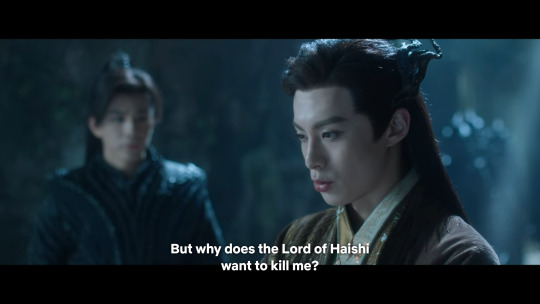
This is a good habit for a king to have. It's advised in the most famous work of the European Renaissance on how to conduct oneself as a head of state:
"... there is no other way of guarding oneself from flatterers except letting men understand that to tell you the truth does not offend you; but when every one may tell you the truth, respect for you abates. Therefore a wise prince ought to hold a third course by choosing the wise men in his state, and giving to them only the liberty of speaking the truth to him, and then only of those things of which he inquires, and of none others; but he ought to question them upon everything, and listen to their opinions, and afterwards form his own conclusions. ... he ought to be a constant inquirer, and afterwards a patient listener concerning the things of which he inquired; also, on learning that any one, on any consideration, has not told him the truth, he should let his anger be felt.
(Nicolò Machiavelli, The Prince, 1532, in my favourite translation by W. K. Mariott)
There's a very good reason why Shangque is the person chosen here. Consider this question, immediately after the last one:

That question is only worth asking because he already knows something else, in such a way that he doesn't have to think about it: Shangque does not lie. And this is not a hypothetical "would you kill me if?". It's a question about a recent manifest fact, a question to which Shangque must know the answer. Shangque does not lie. Therefore, he expects to get the actual answer.
I think it's an important character point, incidentally, that he habitually asks questions because he wants to know the answer. A lot of people in positions of authority habitually ask questions they don't want the answers to at all. It's tedious.
He gets the answer "Why would I kill you? You are the most important person for me. You are like a brother. I would never betray you."
Shangque does not lie. This answer also corresponds with what Xiao Lanhua has independently told him about Shangque: "I think he is quite affectionate towards you. He would never betray you."
Consequently, he accepts it as true. Even though he is hilariously baffled, at this point, on how to process it or what to do with it.
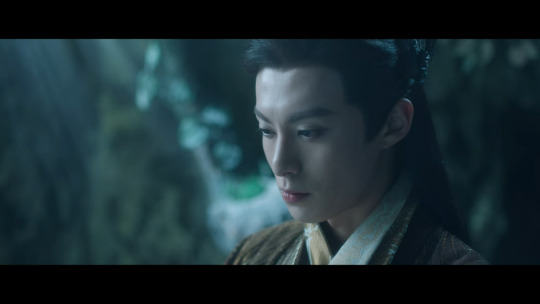
Black Dragon has, just by being himself in a crisis, put his shoulder to the icebreaking machine and given it a tremendous shove.
We know that the new information has sunk in, and been believed, because he acts on that belief for the rest of the story, not hesitating to show weakness and ask the questions that he really wants help with.
In the Human Realm story, Shangque is an absolute star. He does not hesitate to approach and offer support, asking what is on his lord's mind, and increasingly getting this sort of thing in response:
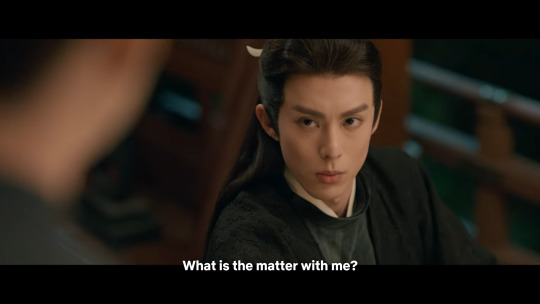
Shangque does exactly the right thing here and offers fellow-feeling instead of an answer he hasn't got: what he says is roughly "same here, bro, and I don't know either". The "wait, does that mean this is normal?" look he gets in response is just cute.

That look is also saying "?!? ... huh. That actually helped." And because DFQC's inner child is the kind of child who only needs to be shown anything once, he re-uses this discovery by giving exactly the same kind of support to Xiao Lanhua, not much later.
Shangque may not quite understand why all this is happening, but his observation is accurate and he repeatedly intervenes to help process the difficult emotions without disaster - even physically. And always patiently and kindly. (I found out how to GIF!!)
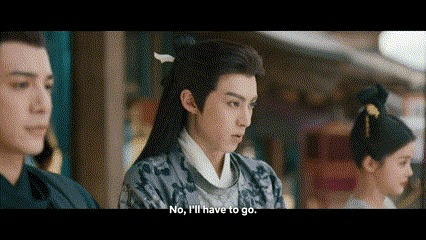
I especially appreciate Shangque's habit of basing his words and actions on the facts directly in front of him, rather than on speculation. He can see what is happening, and he can see what sort of support is needed, and it just doesn't occur to him to do anything other than give it.
Dongfang Qingcang continues to turn to Shangque for advice right to the end of the story, including this desperate"how can I fix this?" moment in episode 33.
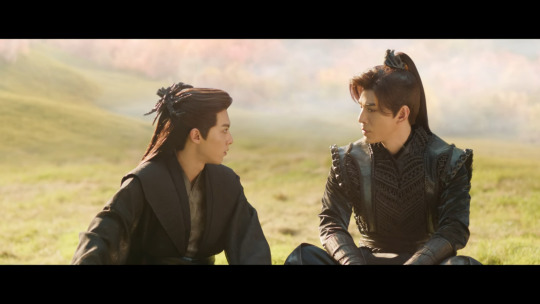
Shangque continues to hold up his end of the conversation with common sense, integrity, and kindness, as best he can, and Dongfang Qingcang continues to listen carefully, apply his own, admittedly sharper mind, and draw his own conclusions - right to the end.
When there isn't a question, Shangque listens and says nothing at all. In this scene, Dongfang Qingcang moves his hands as he talks, which he very rarely does. He's being extraordinarily trusting here: very unlike his body language back in the "Why didn't you kill me?" scene.
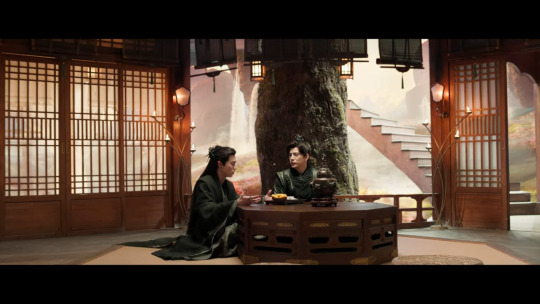
This little movement towards him! 💔
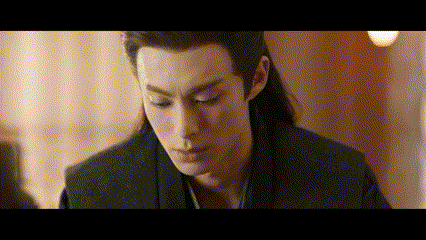
When Shangque briefly regrets a truthful answer, and follows it with "I shouldn't have said that," it's not because he's concerned about any likely response, but because he saw that it hit home, and he felt perhaps it was unkind:
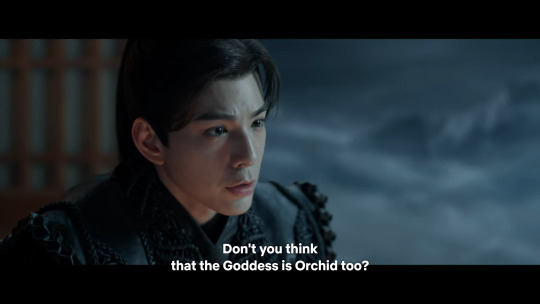
But he's right, and has very much earned the right to say "stop that". The response, after a moment, is this beautiful, wordless gesture in which Dongfang Qingcang serves Shangque's wine first, in a silent "No, you were right. I was in pain, and being a dick about it. And you're still here. I'm sorry. And thank you".
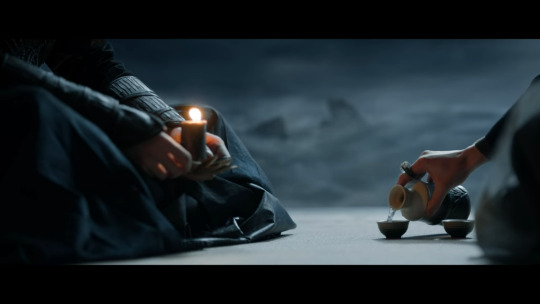
Anyway this is a beautiful relationship which develops, with some really nice writing and acting, tells us a lot about both characters, and deserves some appreciation.
#love between fairy and devil#cang lan jue#lbfad#shangque#dongfang qingcang#shang que#black dragon#best boy#wang hedi#dylan wang#charles lin#lin bo rui
253 notes
·
View notes
Note
So I've been really into your analysis lately and I'm a huge fan now, wanted to ask some questions, feel free to not answer any
1- what was your favourite idv story/event to analyze?
2- your least fav of the latter?
3- are you into anything else besides idv?
4-how do you find the motivation to analyze stuff? I've tried before and it was very draining :')
Thanks for your time, hope you have a lovely day
I'm very happy to hear you're enjoying yourself despite my own low opinion about much of what I put out. I'll do my best to answer!
Hmm I always dislike picking favorites because I'm bad at picking eheh... But the ones I liked most... I honestly enjoy T&I and COA (1-5) even more than the main story. So I think I might pick... Atropos' Ropes for T&I and for COA, thats harder... 3-5 are my faves but I might pick 4 just because of how it felt it had the most story/details given than all the rest. Even the *SONG* had story. I loved it.
Least fave, eh... Orfeo and Zinaida immediately come to mind, though Orfeo I'd say was worse... COA 1 is another primarily because of how DIFFICULT it was for me to figure it out enough to put together an analysis. And I had to rewrite that thing at LEAST 3 times to the point I'm just hoping it's good enough and leaving it alone. Time of Reunion I think is another that comes to mind, mainly because I didn't appreciate how they treated Norton in there, especially in the videos (but at least those aren't canon like the in-game event was). So based on all that, I might say Orfeo if I really had to pick 1. Then rank ToR 2nd and Zinaida/COA1 3rd.
FF14 and Honkai Star Rail especially I'm playing actively these days, but I honestly like a lot of stuff. Like Persona (espeially 4), 999 aka Zero Escape, and Star Ocean Til the End of Time. Least in terms of games.
Hmm... Maybe because the 1st reason I play a game is because of the story, and gameplay is always 2nd to me. If the story and characters are good, that gets me interested. Issue with IDV is we only get bits and pieces. Really need to look deeper to really understand some of the characters. I actually only started analyzing because I challenged myself (partially out of curiosity for the answer) to see if I could prove if Norton wasn't as evil as people thought (based on all the comments I saw when I 1st joined the fandom a long while ago). From there, there was Jose who I wanted to analyze because he honestly had so many plot holes I couldn't (and still can't completely) solve. So I get the most enjoyment analyzing something that doesn't have a clear answer. Which is why I don't always post for every letter. A big part of it is I enjoy history and culture and such, so it's fun for me to learn about different foods, or time periods, or how bad the environment was for miners or sailors back in the day, etc... I dont think I have an easy answer (I can see I'm rambling). Norton I actually only began to like because I was spending so long working on my 1st analysis for him (and my perfectionism made me analyze all of Norton's essences before i could call it finished). Jose was because I love Captain Hook, and then after because of the plot holes that bothered me. Then for others, I think I enjoy making analyses to... try to sometimes change people's opinoions/beliefs. Like with Margaretha or Vera. With Edgar was because I was more interested in his story and him as a character only once I put together all his lore. Sort of goes on from there. I could ramble on but I'm going to get even more guilty. I hope this helps somewhat, but let me know if it doesn't and I'll keep going. Maybe the simple is A) I like history/culture/research, B) I like to convince people that certain characters arent as evil as they think or change beliefs I think aren't quite accurate, C) I like solving puzzles and I love story, D) I already think too hard about literally everything, and combined with my perfectionism, we get analysis
28 notes
·
View notes
Text
OFMD Critique: Bad Faith, Fandom, and Respect
All right. You know what? Screw it. I saw one post I just cannot ignore anymore that encapsulated all of my problems with the fandom right now. Personal rant incoming.
I understand that there's a nuance to the discussion of season 2 of Our Flag Means Death, and that there are people going a little too far with both their critiques and their support of the show. But oh my God, I'm tired of being straw-manned and made fun of for legitimate critiques of the show.
I just used the block button on someone in this fandom for the first time. Some of you might think I'm overreacting for this, but I saw a post that I could not on any level stand. This person, who I will not name names of, because I'd rather just block them and never deal with their level of bad faith again, took their one legitimate criticism of those of us who critique the show, the back and forth on whether or not Izzy's death was homophobic or not, and used it as the first in a literal list of straw man critiques that no one I've read in the OFMD Critical tag has made (and I check it like once a day bc I like reading meta, sorry), proceeding to absolutely make fun of the legitimate critiques that people have of the show, parodying them in the worst possible ways. They took our legitimate critiques about everything from the sexist handling Zheng Yi Sao's character, the absolute ableism of the finale, the questionable optics of the handling of trauma, etc. and stretched them into things that they very much were not (two examples were that we were crying ableism bc of something to do with seagulls and that we thought the problem in the Stede&Zheng dynamic was the "emotional labor" involved).
Now I'm pretty sure this post was a joke. I *think* it was a joke. But how in the world am I supposed to feel comfortable in the main section of a fandom like this when the comments and replies to this post were full of people agreeing sincerely that this is what the critical section of the fandom is like? How am I supposed to feel when I just see people making fun of me for my analysis of the show? I love this show. I adore season 1 and I'm clearly still making fan related content (moodboards) for season 2 along with my critiques.
Sure, I vibe way more with fanfiction than the actual canon at this point, but I still genuinely engage with the show. And to have the critiques that I made in good faith, regarding issues that I sincerely care about such as ableism, sexism, homophobia, and the handling of trauma, made fun of and taken out of context and straw-manned to their extreme, makes me feel so absolutely unwelcome in this fandom.
Other than keeping up with the couple of fan series that I'm currently still reading, I don't know if I can stay in this fandom any longer. I can't say that I'm excited for the new season if this is the kind of response that any good faith critique of the show is going to get. I can't say that I feel safe or comfortable when there are this many people ready to dog pile on me for a critique I made with ACTUAL TEXTUAL EVIDENCE to back it up.
I would like to thank all the people who have been making excellent critiques of the show. Their meta-analysis is what got me into making my own critiques, which I was nervous about making in any other fandom. I don't think I've in any way tagged them all, but just a few I can remember off the top of my head. Go read their critiques/meta- it's really good!
@sky-fire-forever @carrymelikeimcute @blue-b-bro @bougiebutchbinch @treesofgreen @sixstepsaway @alex51324
And from the bottom of my heart, thank you to everyone who has engaged with my mood boards or my critiques or anything else that I've made, as well as the amazing writers and artists in this fandom (such as @ruecrown, @aletterinthenameofsanity, @fool-for-luv, and @possumsmushroom). You guys have kept me going with my love for the show and engaging with it for a while now. Despite the stuff that is making me take a step back now, I really did love this while it lasted! I'm still planning on making a few more mood boards, but other than that, I'm going to take a step back from engaging.
Hope this post can spread enough support/joy your way to counteract the ache I'm currently feeling!
Sincerely,
Ashley (aka @khruschevshoe)
#ofmd critical#fandom critical#ofmd#ofmd season 2#this show was supposed to be a source of joy and kindness and it become something sour#izzy hands#zheng yi sao#stede bonnet critical#ed teach critical#I'm not tagging them bc I don’t want hate#fandom shenanigans#meta#analysis
65 notes
·
View notes